Teen Co-Design is Teen Learning: The Story of The Porcelain Child
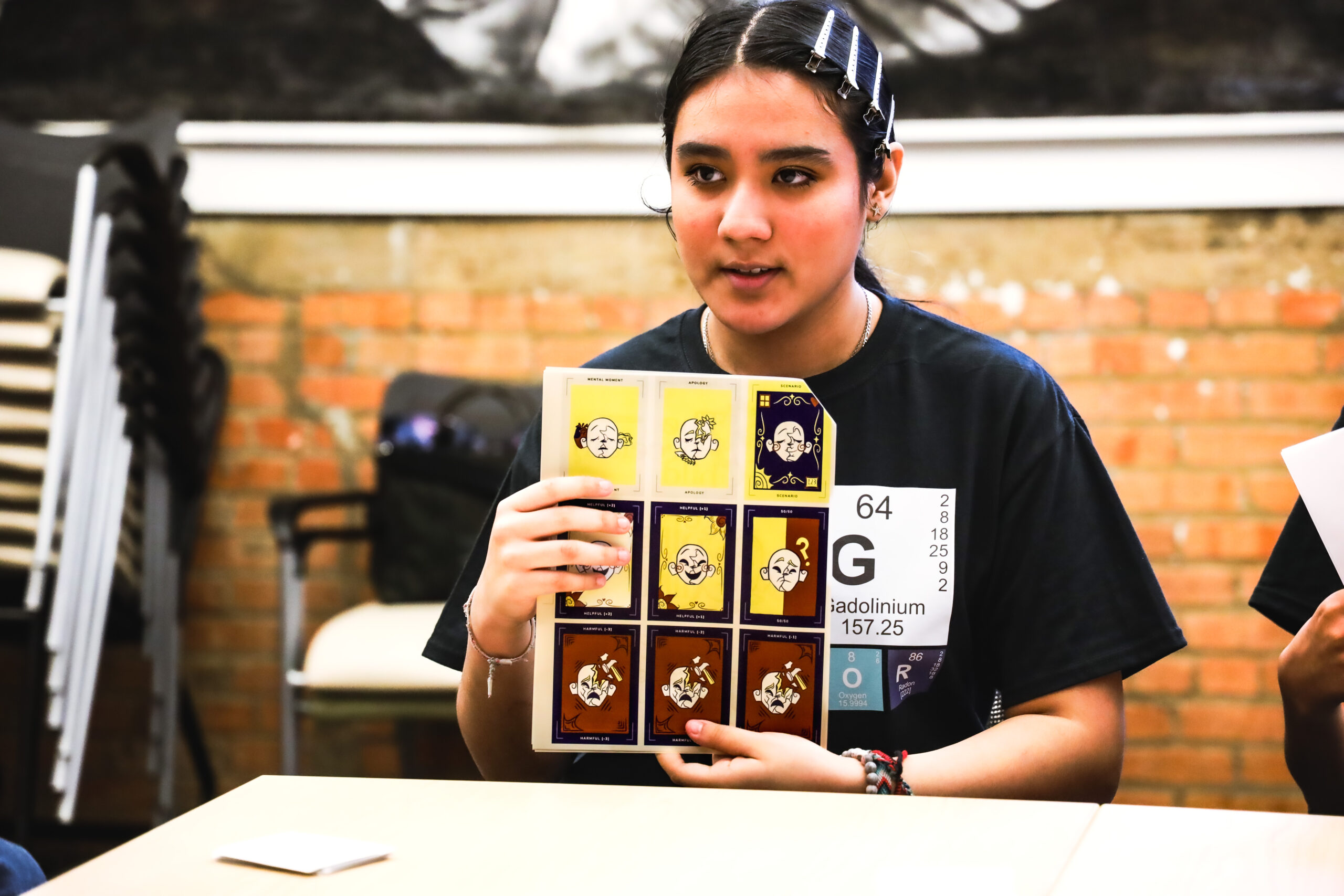
What happens when teens are invited not just to play—but to design, decide, and disrupt?
In a workshop room in Dallas, Texas, a group of teenagers gathered around a table and began to share their wishes for how they wanted adults to show up for them. One talked about the way their teacher dismissed them. Another reflected on the echo of a parent's words. "It's like being made of porcelain," one teen said. "Every time it happens, you crack a little." Together they asked, what if adults knew how much their words can hurt us?
From that conversation, a game was born to help adults learn. It was called The Porcelain Child—and like the teens who made it, it doesn't flinch from the truth.
A GAME DESIGNED TO BE HEARD
The Porcelain Child is a teen-designed tabletop game about the impact of adult words and actions on young people. Through collaborative gameplay, players consider scenarios, choose reactions, and see—in real time—how words can hurt or heal. It's a mirror, a conversation starter, and a call to action.
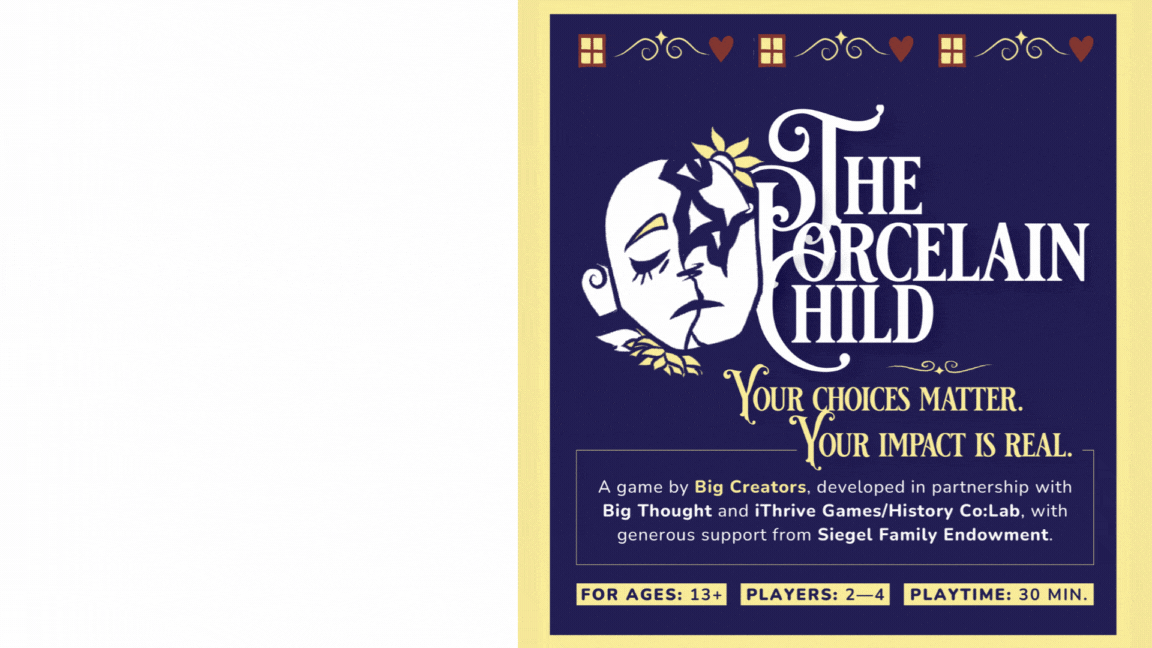

Pictured are the teen-designed game materials from the tabletop game The Porcelain Child, including the body board (left) and card options (right).
Created by 25 teen designers in a Game Design Studio (GDS) co-hosted by iThrive Games at the History Co:Lab—in partnership with Big Thought and Fit and Faithful Living, and with generous support from the Siegel Family Endowment—The Porcelain Child was designed entirely by youth. From early brainstorms to the final prototype, the teens—who later named themselves Big Creators—led every step of the process.
What emerged was not just a game, but a powerful learning experience supportive of collaborative growth and the social-emotional skills needed to thrive as contributions in a connected world. "I usually do everything solo," one Big Creator shared. "But this made me realize how powerful it is to create with other people—and be heard."
LEARNING IN LAYERS
The Game Design Studio model is more than a method for making games—it's a process for making meaning. Rooted in learning science, adolescent development as well as systems and design thinking, Game Design Studio supports youth in analyzing real-world challenges, envisioning change, and expressing their truth through game design.
"Co-design in the Game Design Studio experience is about teens learning and playing together," shared Susan Rivers, Chief Scientist at iThrive Games, co-lead at the History Co:Lab and co-architect of the Game Design Studio model. "They learn best as they make something meaningful together. Through the creative collaboration process, they build trust, grapple with understanding the systems surrounding them, and express themselves. The process invites teens to use their voice and their lived experiences to contribute to important conversations and imagine what's possible. The game is an artifact of their learning and an invitation for others to engage with them."
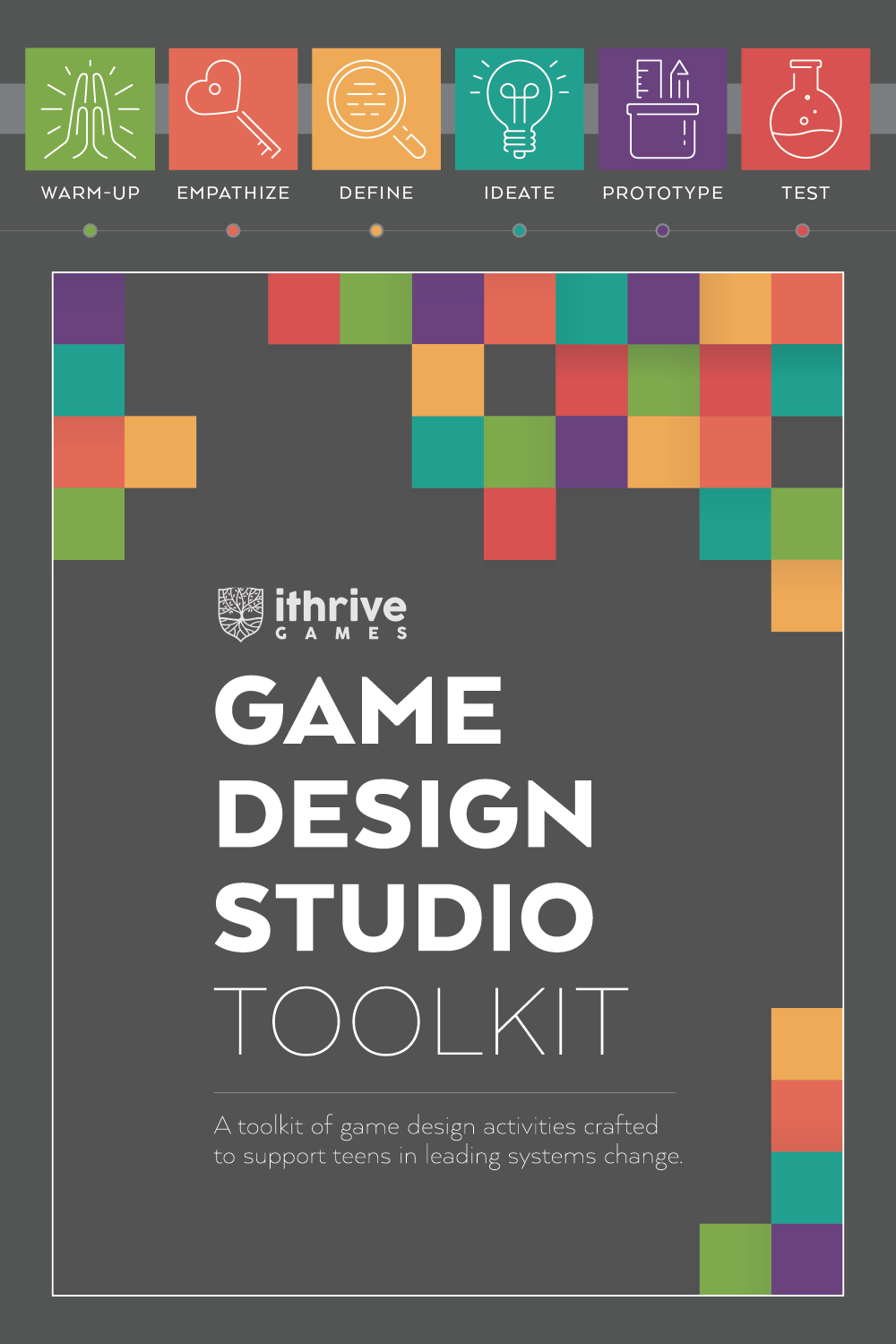
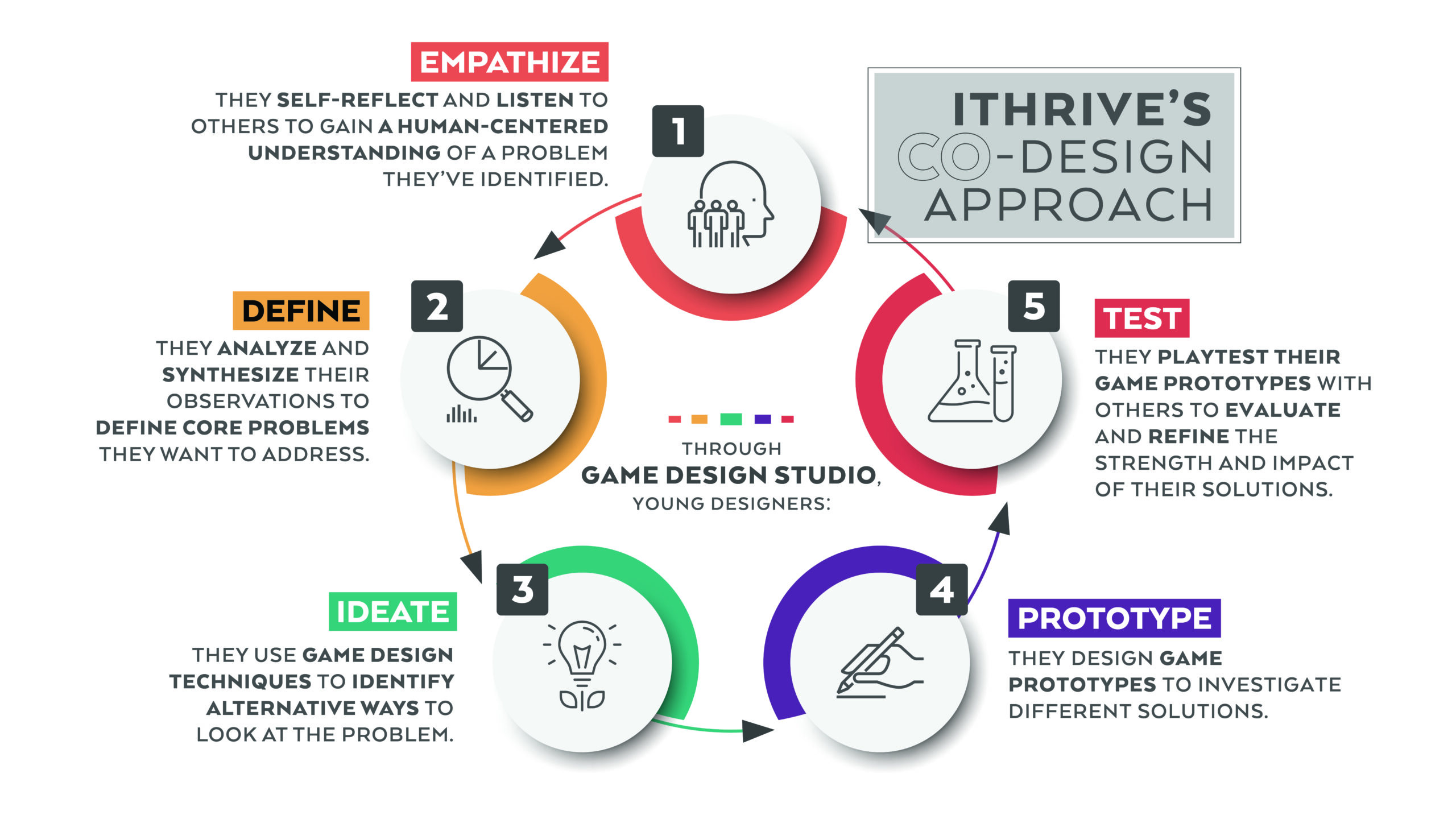
Game Design Studio (GDS) is a teen-led and teen-centered learning experience that invites youth to turn their lens and lived experience into games that spark dialogue, connection, and change. Download and explore the GDS toolkit.
Game Design Studio offers a different way to learn-one centered on teens and where they are developmentally.
"It just taught us how to communicate with each other and learn from each other," shared one Big Creator. "We all built off of each other to end up with this amazing game." Another added, "To be able to listen to other people's ideas and take it in and mix it together to get a final product—that's a big thing we are going to have to use."
RESONANCE BEYOND THE ROOM
In March 2025, the Big Creators debuted The Porcelain Child at SXSW EDU in Austin, Texas. Invited by the Siegel Family Endowment, the team of teen designers facilitated playtesting sessions and shared their stories with funders, educators, and attendees from across the country.
The feedback was personal and profound:
"This game made me realize I've got work to do," said Gregg Behr, Executive Director of The Grable Foundation. "It felt personal."
"The relationship between play and learning is incredibly strong," said Bo Stjerne Thomsen, Head of Impact at LEGO Education. "It provided an invitation to speak about issues in the family that are really difficult to uncover without play."
"It's a game I wish my parents had access to when I was a teen," shared Alicia Cagle, Youth Programming Manager at the World Affairs Council of Pittsburgh. "..It's a great tool to prompt valuable conversations."
"It's a powerful conversation starter," said Jason Swanson, Senior Director of Strategic Foresight at KnowledgeWorks.
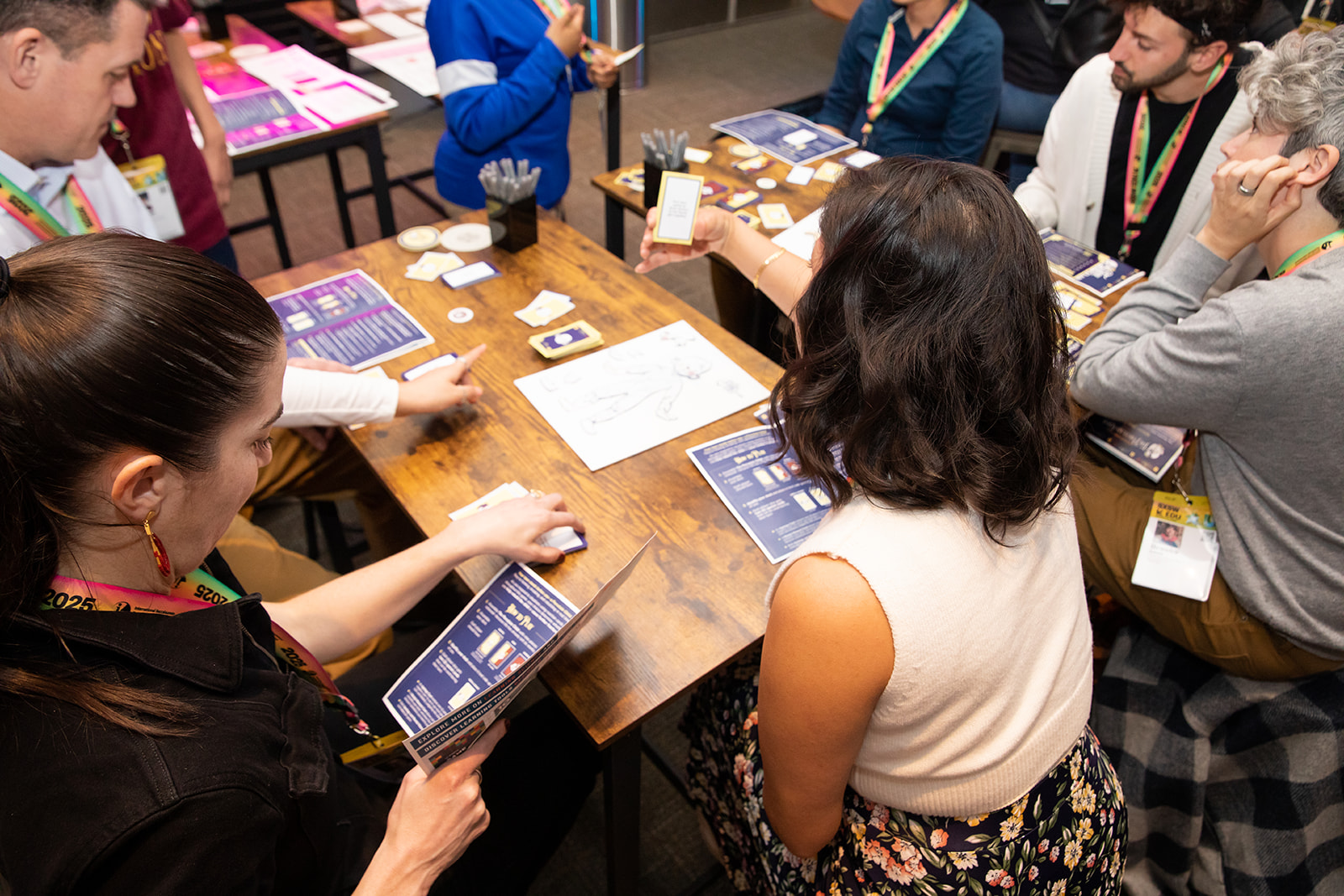
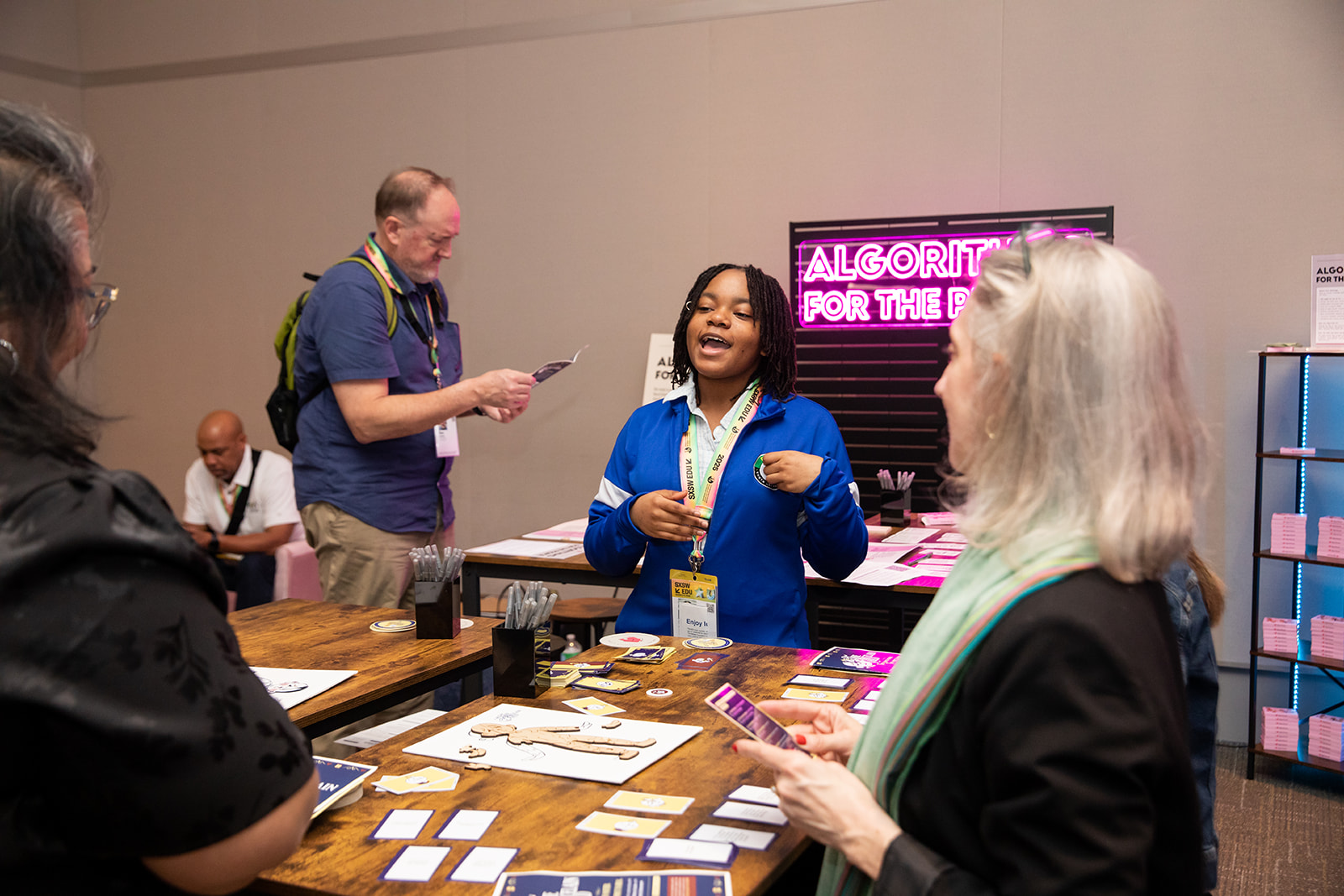
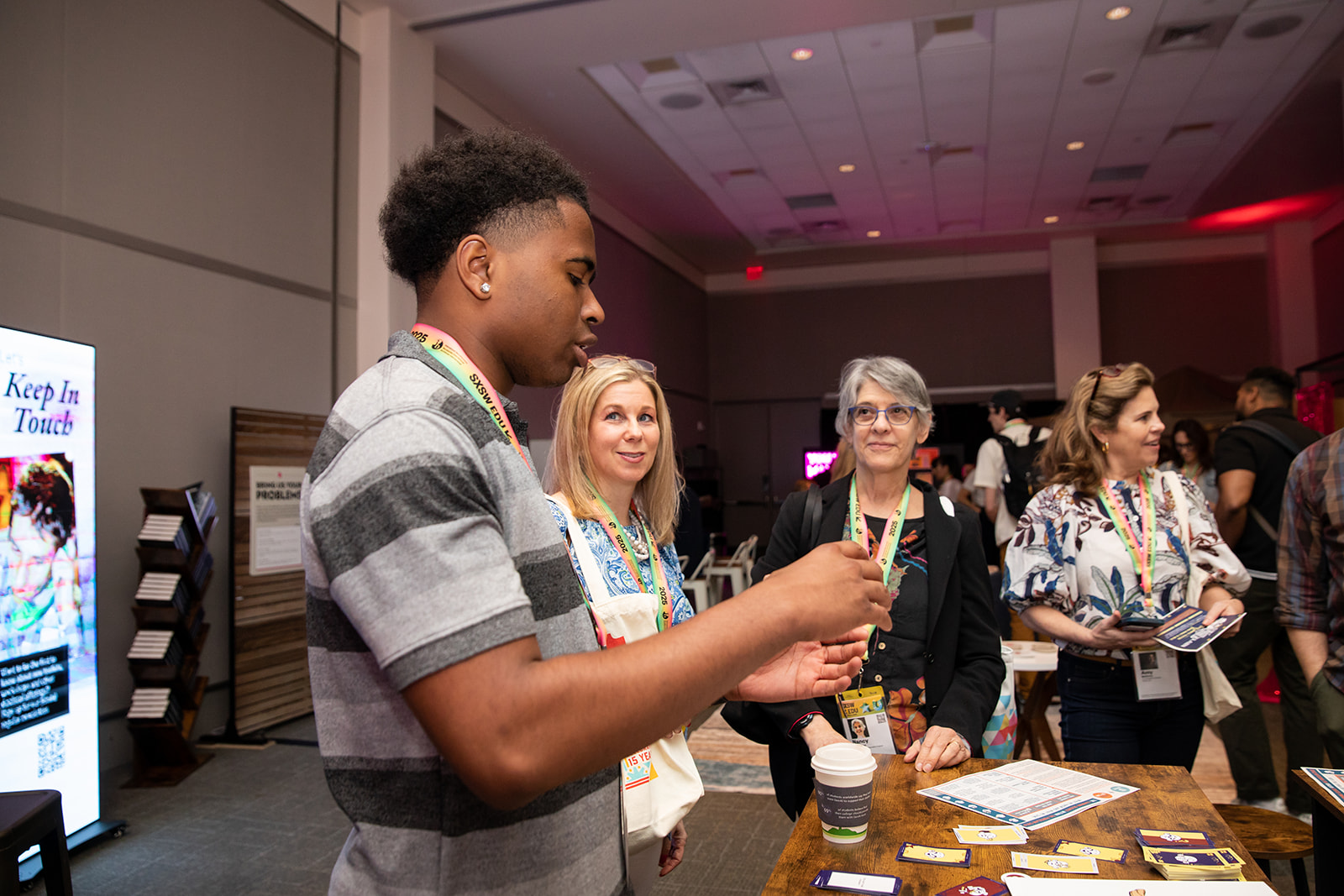
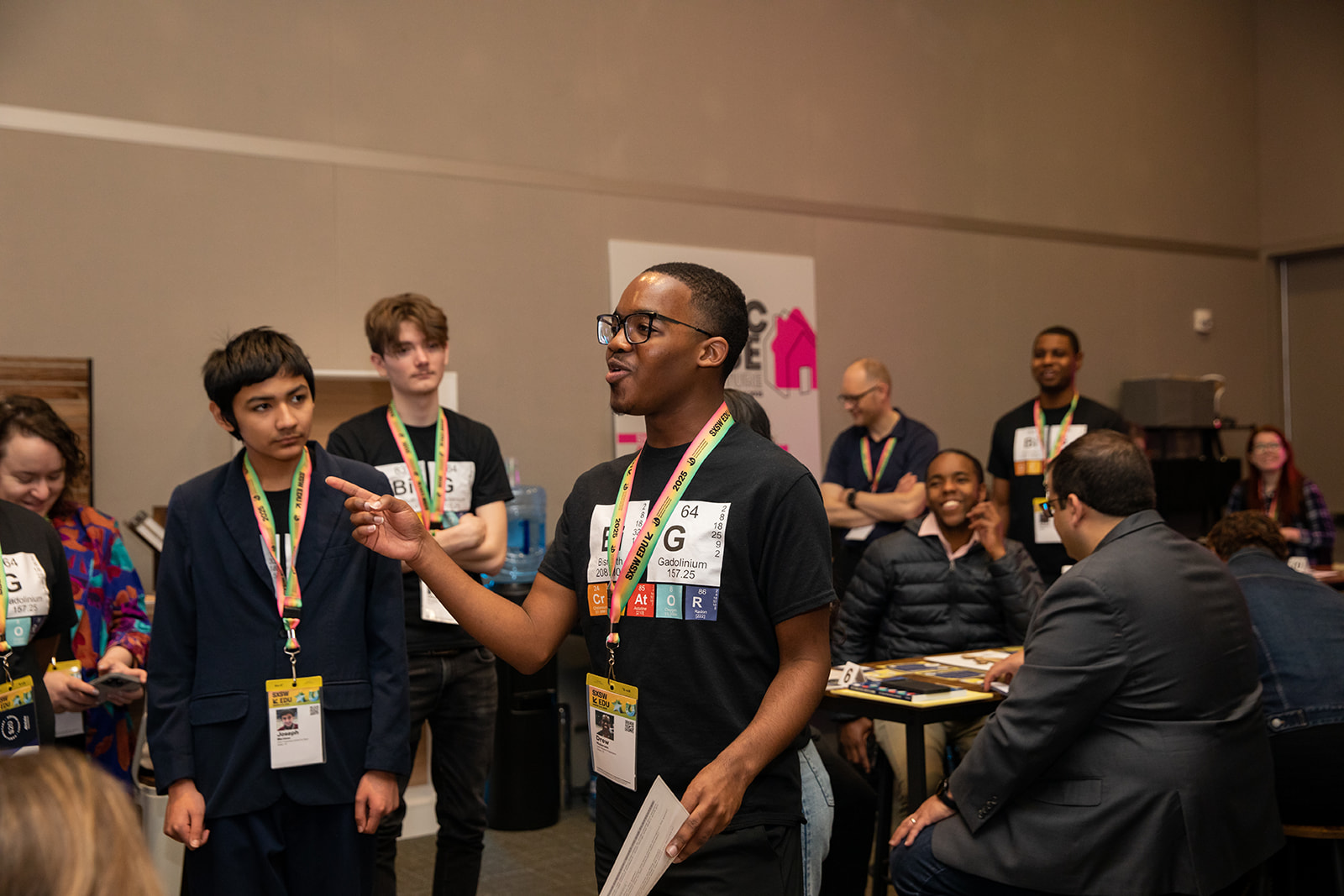
The teen design team behind The Porcelain Child was invited by the Siegel Family Endowment to present and playtest their game at the Stanford d.school lounge at SXSW EDU 2025 where adults engaged, reflected and offered feedback.
The Big Creators noticed the impact of their co-designed message, too. "Watching adults play the game, it gave me a different perspective," one said. "The parents who already had children were like, 'I could've done this differently.'"
Some youth took away an even more lasting message: "Being part of the art team gave me a great idea of what I'd be getting into if I was to do work like this professionally," shared one Big Creator.
Through co-design, they weren't just crafting gameplay—they were shaping a message. One that carried their truth, their experiences, and their hopes about disrupting adultism into places far beyond their original design table. In doing so, they discovered their strengths, clarified their values and realized their message—rooted in care, courage, and truth-could move people, shift conversation, and ripple far beyond the room.
COMMUNITY GROWN, RELATIONSHIP-DRIVEN
The Game Design Studio experience is designed to deepen relationships between teens and adults—showing what's possible when adults listen, support and step back to let teens lead. Nearly every Big Creator spoke to the impact of how adult facilitators show up during their co-design journey. "They gave us an open space," one teen shared. "They stepped back—but when we needed them, they stepped forward for us. So that really helped us grow."
That balance of support and respect was intentional. "When I say 'greatness,' we just want kids to get the best," shared Reggie Dupard, co-founder of Fit & Faithful Living. "We want our young people to know that if you need somebody in your life, we're here for you and we'll be that person that advocates for you."
Teen designers credited their team of adult collaborators-including our design team at iThrive Games/History Co:Lab, Big Thought's Armando Banchs, Evan Cleveland, Rachel Hull, and Denesha Ogunsegha; Art by Martell's Martell Holloway; and Fit & Faithful Living's LaChanda and Reggie Dupard, and the iThrive / History Co:Lab team—for creating space to explore, reflect and lead. The adults offered guidance when needed and consistently affirmed the genius and brilliance of the youth they worked alongside.
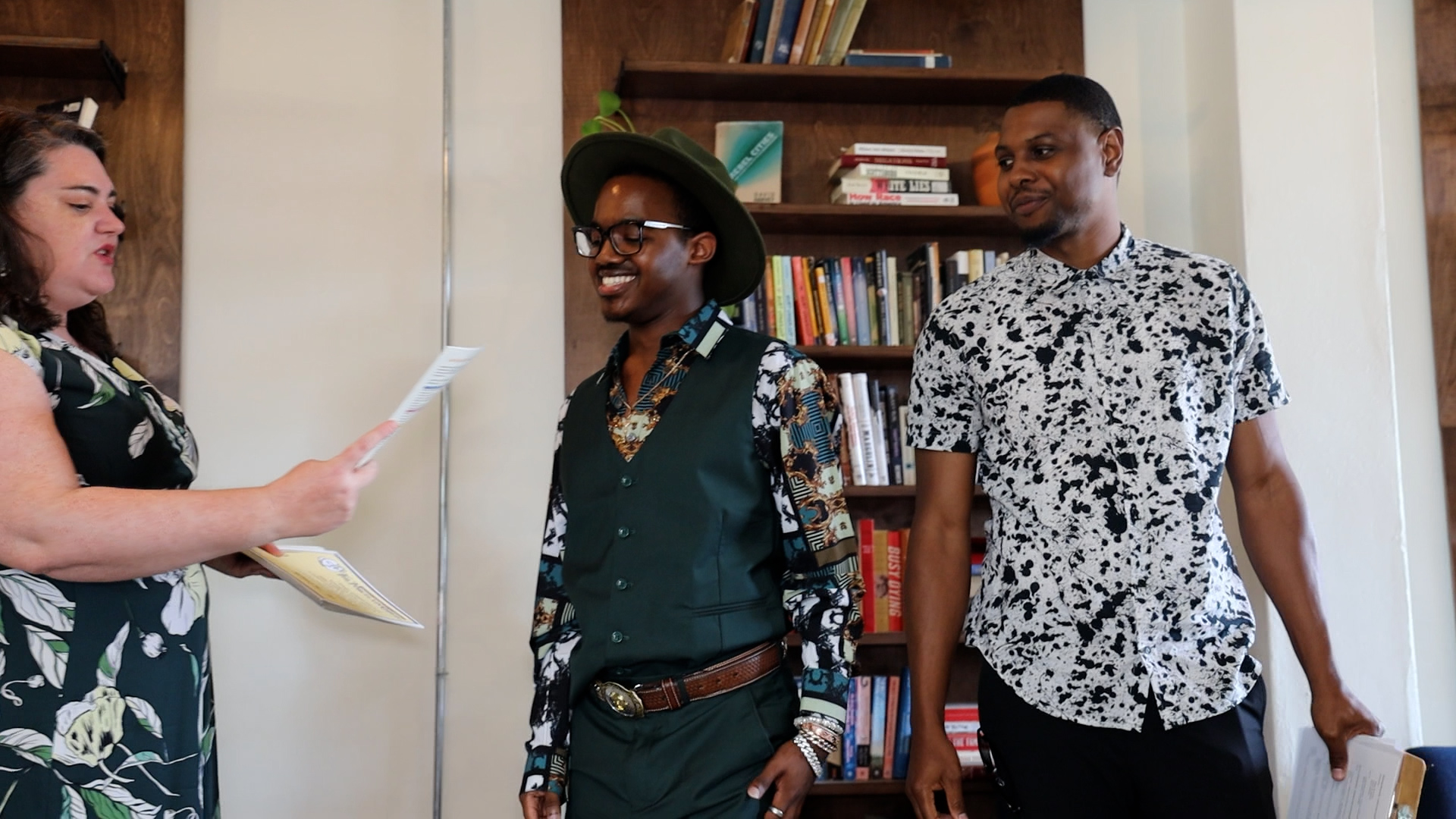
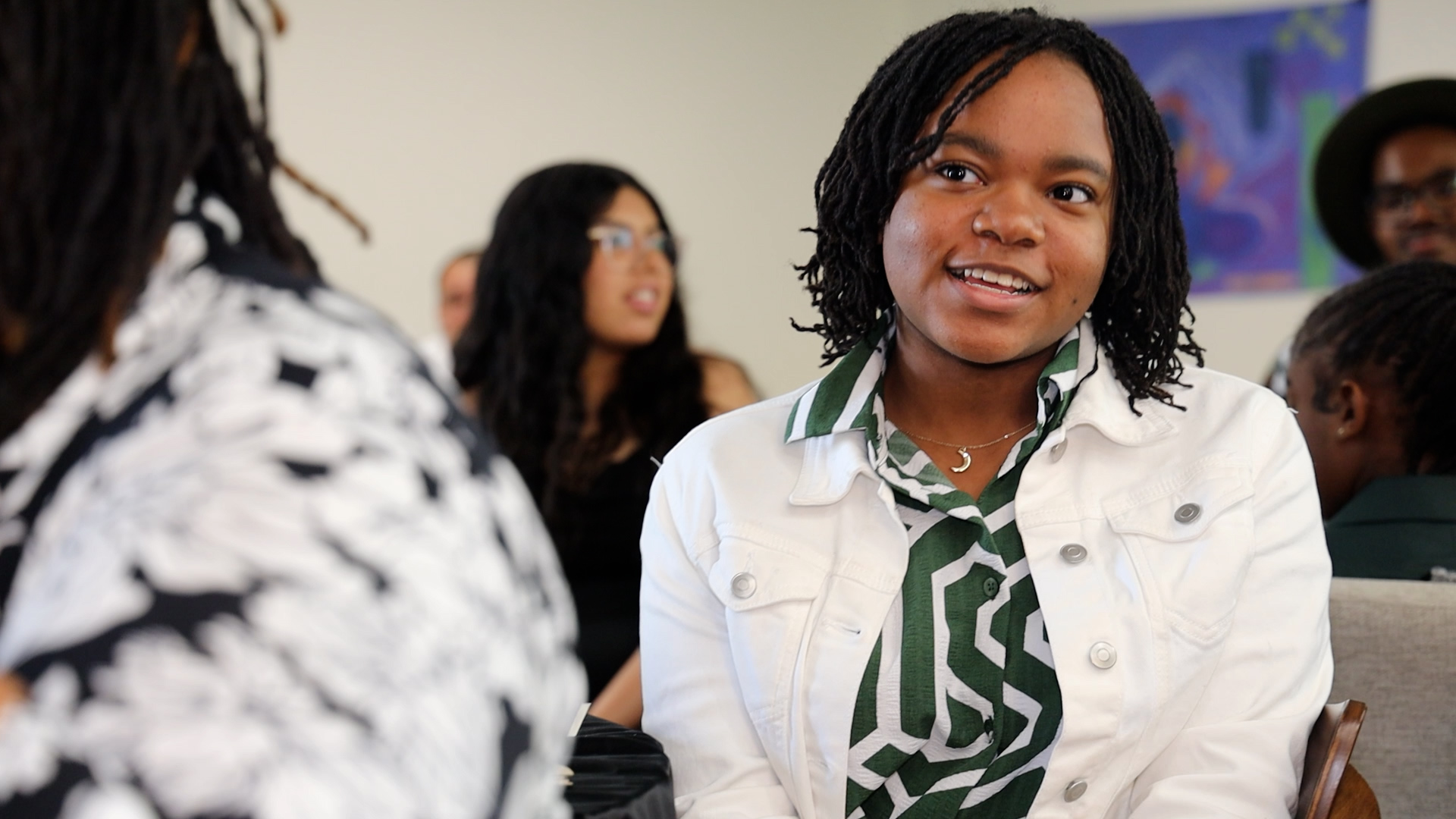
On Celebration Day, the teen designers behind The Porcelain Child celebrated their growth, reflected on their game and honored the intergenerational community that made it possible.
Big Thought's commitment to youth creativity through its Creator Archetype framework and direct-to-youth programming helped make this co-design experience possible. Their environment empowered teens to lead, explore, and shape meaningful artifacts of change. As Amarando Banchs, Sr. Manager, Creative Archetype, shared during the intergenerational team's Celebration Day, "These are the skills—grit, rigor, muddiness, storming and norming—that youth need to step into a world that's constantly shifting." He reminded the parents, guardians, friends of designers, and all listening that the most powerful artifact of this learning experience wasn't just the game—it was the teens themselves. "This work is about the heart. Look at the youth in the space that worked on this... because they're really the artifact."
On the culminating Celebration Day hosted at Big Thought's HQ, youth, families and collaborators gathered to honor what they built together. "This wasn't just a project," shared Fernande Raine, founder of and co-lead at History Co:Lab. "It was a coalition rooted in belief: belief in youth brilliance, and in the power of making meaning together."
MORE THAN A GAME
The Big Creators designed The Porcelain Child to do more than entertain—they designed it to invite adults into conversation, reflection, and change.
"This experience taught me how my voice can change situations I believe are unfair," shared one teen designer. "My hope is that adults reflect and realize how their actions impact a teen's mind," added another. "This game shows them," emphasized a third.
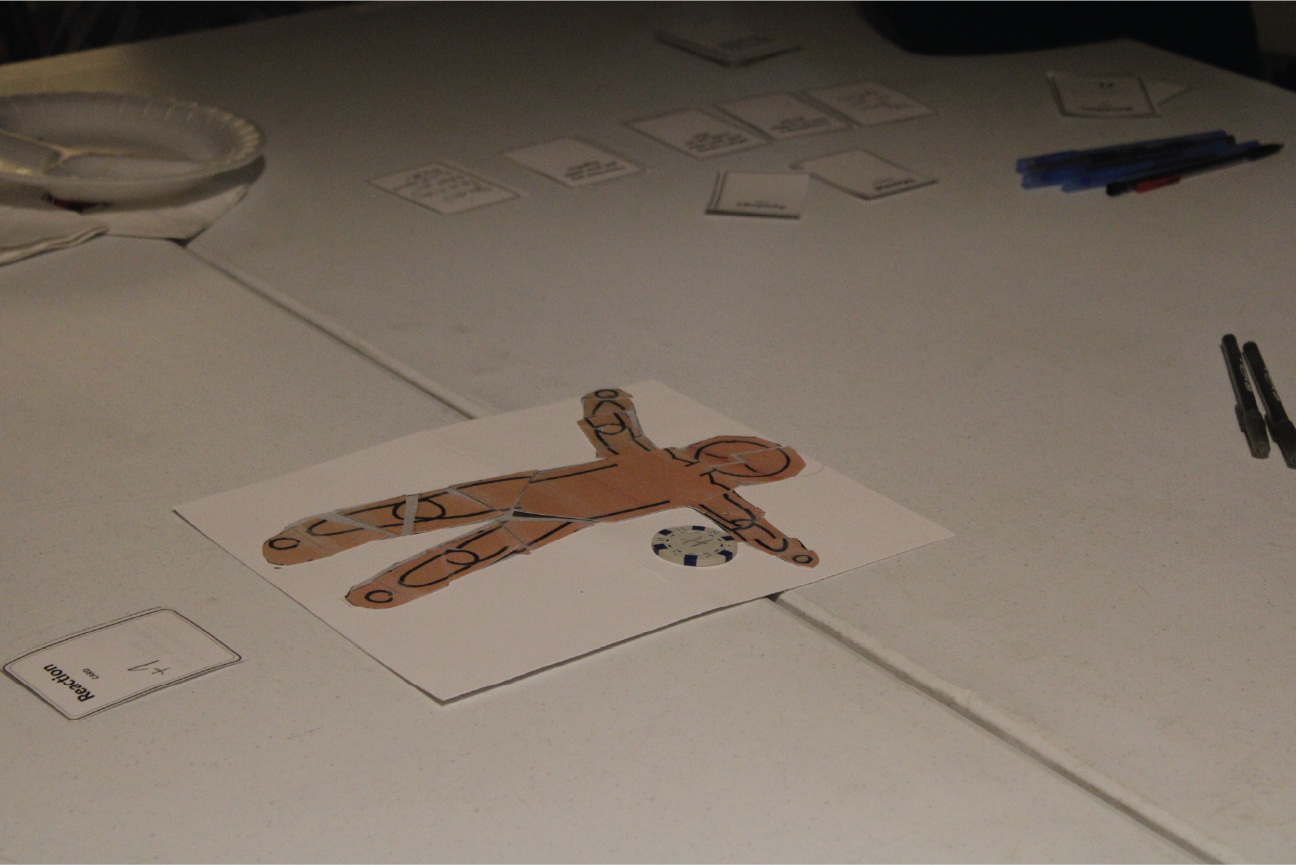
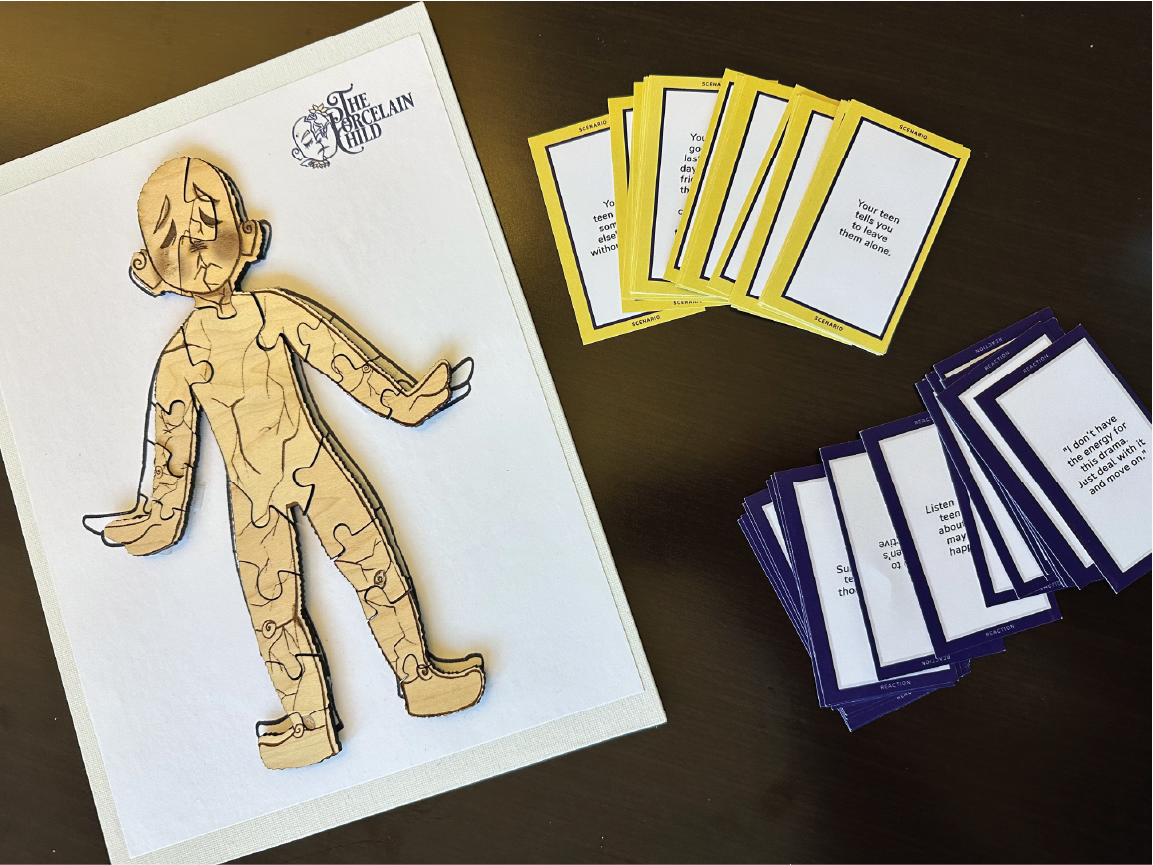
Early ideation vs. prototype phases of The Porcelain Child.
Through co-design, the youth behind the game transformed lived experiences into a critique of the systems that impact them. They deliberately designed mechanics, narratives, and choices to reveal how words and actions ripple through a young person's life. The result is an empathy-building, intergenerational dialogue tool that invites players to pause, reflect, and connect. As of May 2025, The Porcelain Child is being playtested across Dallas—on kitchen tables, in school gyms, and at community events—sparking conversations about listening, care, and the small moments that build or break trust between adults and youth. Each card played is a spark. Each round, a reflection. Each conversation, a step toward healing and change.
This game is just one example of what's possible through Game Design Studio—a model and toolkit used by educators and youth-serving institutions who believe in the power of young people to make meaningful change. Across schools, community programs, and even international settings, GDS invites teens to design tabletop games, digital stories, and immersive simulations that center their lived experiences and civic imagination.
Game Design Studio meets teens where they are—and offers them the tools to imagine, build, and lead us somewhere better.
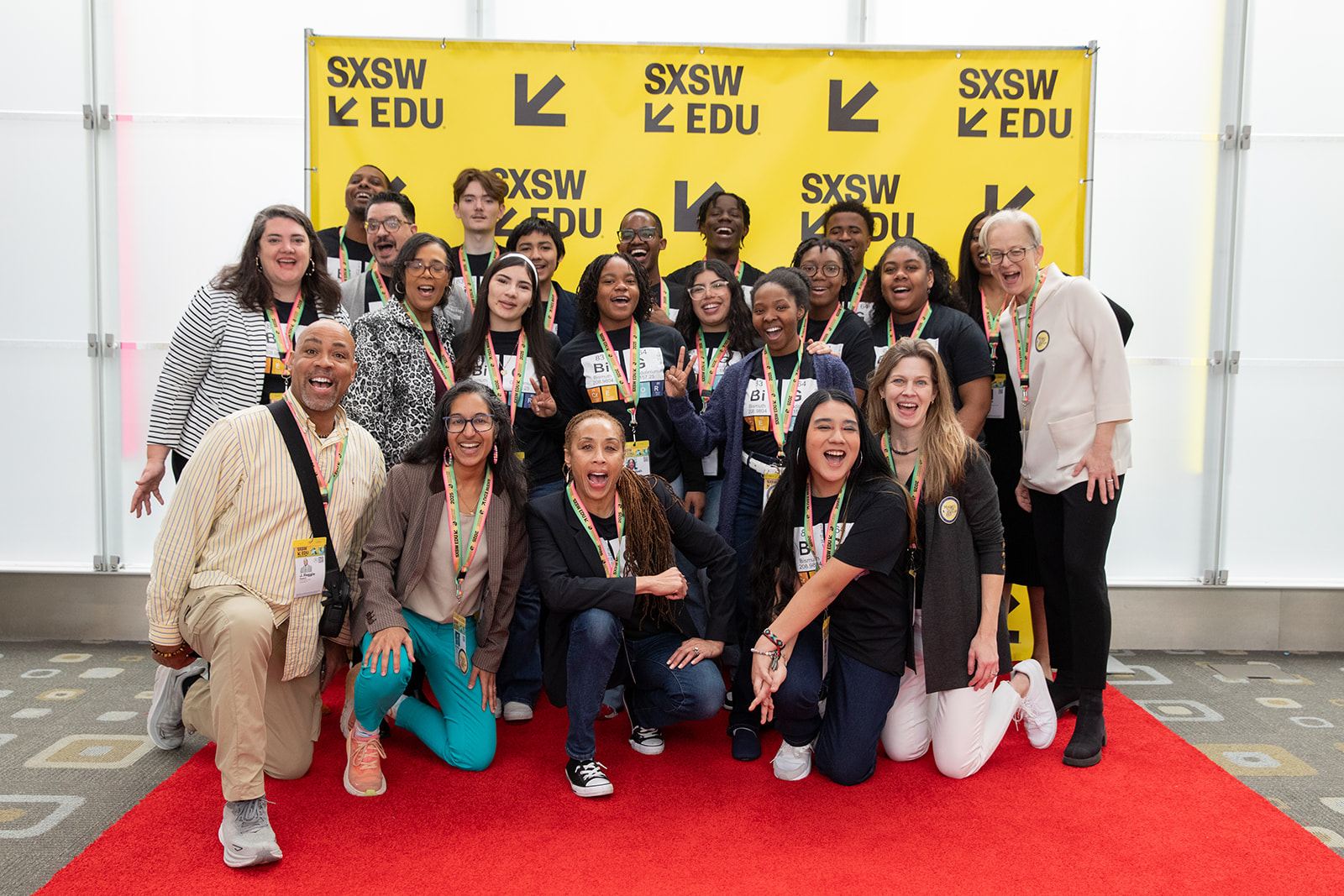
After leading their workshop at SXSW EDU 2025, the Big Creators stop for a candid, celebratory moment.
If you're a partner (i.e., educator, funder or youth-serving organization) ready to center teen voice in a transformational way—we invite you to connect.
Fugees Family, iThrive Launch ‘Our Threads’, A Connection-Building Card Game
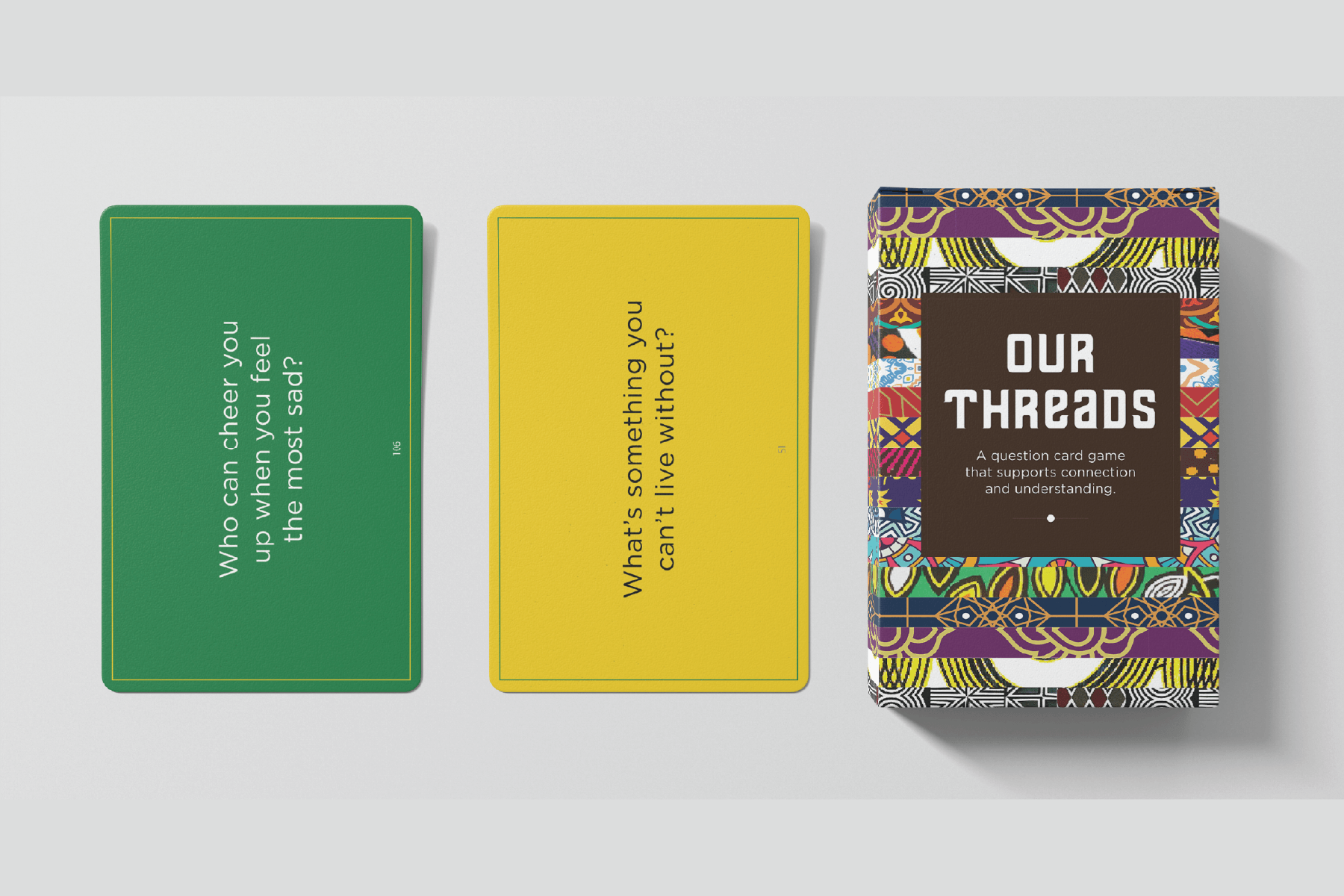
BOSTON—Earlier this month, the Fugees Family in partnership with iThrive Games launched Our Threads, a question card game envisioned and created to help set the scene for empathy, connection, and curiosity in schools, especially between refugee and non-refugee students.
Our Threads was sparked by a question posed to 22 Fugees Academy high school students at an iThrive Studio: "What do you want teachers and other students to know, feel, say, and do when they connect with students who are new to this country and to their school?" After two days of stories, knowledge-sharing, collaborative thinking, and play, answers to this question began to take shape in games that highlighted a universal desire for empathy and tools to help facilitate it.
"Empathy is essential to the world we all want to live in," shares Luma Mufleh, founder of the Fugees Family, which works to advance educational justice for refugee and immigrant youth by reimagining schools and retraining teachers. The Fugees team is also steering meaningful work to support the 60,000 estimated Afghan refugees resettling in the United States. "At Fugees Family, we lead with empathy. Our hope is that Our Threads helps spread the message and model that so much of what we seek to address and redress in the world is uncovered in community and while in connection to one another. It all begins with listening to and understanding each other."
In the generative space that was iThrive Studio: Fugees, students, reflecting on their stories, jotted down hundreds of connection-building questions that would be useful to anyone tasked with welcoming new students into a school community. After brainstorming questions, swapping decks, and iteratively testing them in groups, students decided which questions to keep. The iThrive Studio experience and the creations that came of it demonstrate the unique avenue game design provides to young people. It supports them in exercising their creativity, thinking analytically, and contributing meaningfully toward creating the world they want to live in.
"The beauty of Our Threads and the intent behind the game mirrors the magnificence of its young designers," says Susan Rivers, Executive Director and Chief Scientist at iThrive Games, a nonprofit that uses games and game design to support teens' social and emotional development, wellness, and thriving. "Whenever young people are given the reins to imagine freely along with the tools to delve deep into issues affecting them and their communities, we're reminded of why co-creation with them is vital to all that seeks to be sustainable. No one can take on a design challenge the way the young mind can."
For over 16 years, the Fugees Family has effectively used soccer as a tool for supporting students resettling in towns and cities across the U.S. in feeling understood, welcomed, and cared for. Our Threads, with its thoughtful mix of 108 light and thought-provoking questions and ornate, patterned covers representative of the 22 countries Fugees students hail from, builds on the same model - one in which play becomes a lever for care, compassion, and connection.
Our Threads ($34.99) is available now for anyone to purchase and is guaranteed to make a wonderful gift and addition to any holiday festivity. Purchase it exclusively on The Game Crafter website here.
Game Design for International Relations: iThrive Studio in Olang, Italy
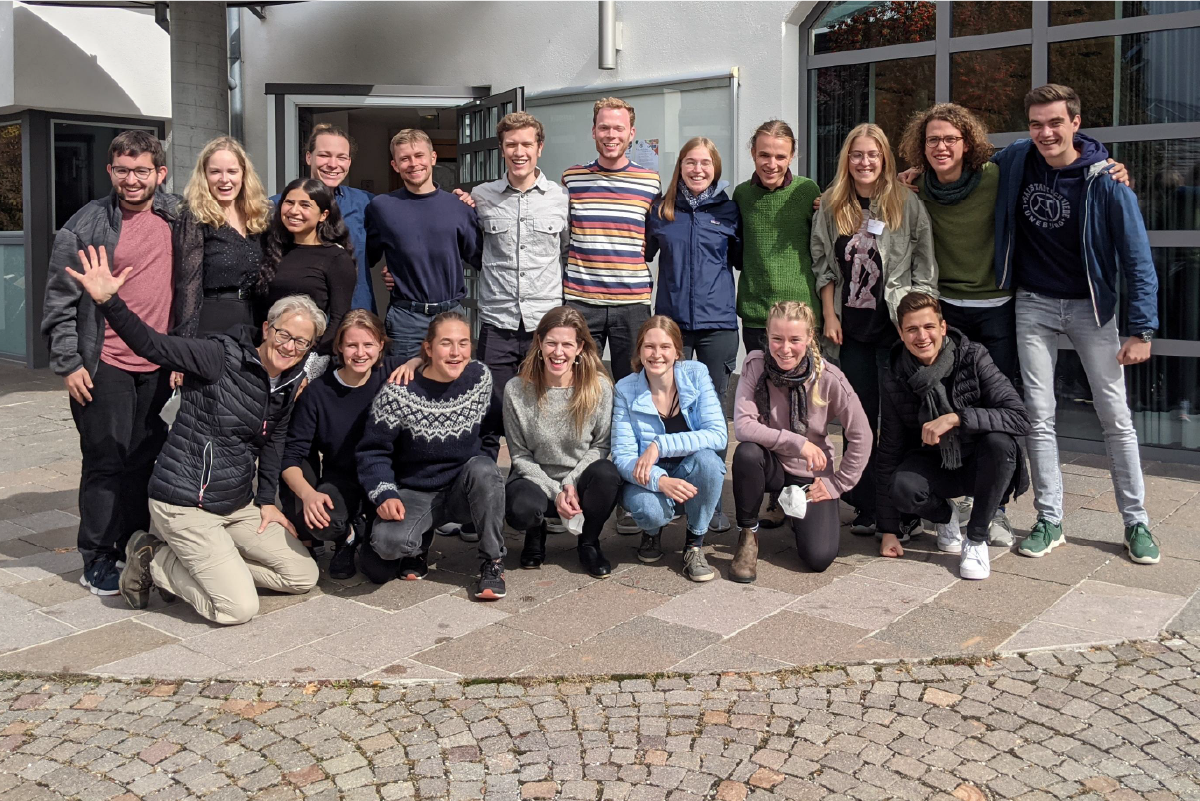
Nestled amidst the beauty of northern Italy is Olang, a predominately German-speaking comune (or municipality) home to less than 5,000 people. In September, iThrive's Executive Director and Chief Scientist Susan Rivers, PhD, joined forces with History Co:Lab founder Fernande Raine, PhD, for an iThrive Studio hosted as part of the Summer Academy for university students hosted by Studienstiftung des deutschen Volkes. Amongst the over 100 students attending the Academy, 20 participated in the two-week experience, creating five game prototypes, each reflective of international relations and social issues that matter to them.
History Co:Lab and iThrive Games' shared belief in the genius of young people and their creative potential to build and imagine a better world surfaced in the discussions and interactive activities that colored each day of the summer program. History Co:Lab, an incubator for systems change and of youth-led media products that bring history to life, prompts young people to engage constructively with the past and use it as a springboard for independent thinking, mapping purpose, and activating change-making.
"From the work I do across the globe, I know young people are committed and ready to take action on the challenges and opportunities of today and tomorrow," shares Fernande. "But they need to deeply learn history; history is the foundation, guide, and inspiration for imagining a better world. Centering play is essential to create conditions for the transformative learning that young people crave."
Play is central to the iThrive Studio model. In partnership with schools, universities, and youth-serving organizations, iThrive Studios uniquely challenge and nurture the genius of young people, strengthening cognitive, social, and emotional skills vital to their thriving through collaborative game development. With them, we invite teens and young adults to unpack challenges, construct solutions with their peers, create and test games that reflect those solutions, and ignite social change.
What transpired in Olang was a testament to both organizations' commitment to supporting the thriving of young people through experiential learning. In the first week, students led discussions from the syllabus Fernande, a social entrepreneur and historian, curated to explore themes vital to international relations and the work of sustainable world-building. On Monday, students explored state power, new and old, examining how factors like technology and military capability influence it. On Tuesday, they reflected on the alchemy of peace, unpacking the parts, values, and vision that could advance it. The rest of the week saw rich discussions where students defined community and the economic models and systems, real and envisioned, that can help or hinder it.

Weaver, historian, and founder of History Co: Lab, Fernande Raine, PhD, at Studienstiftung des deutschen Volkes.
In the second week, Susan facilitated iThrive Studio sessions that immersed students in systems and design thinking working with the content they covered in the first week. The game design workshops invited them to meaningfully reflect on the world they live in and envision the world they want to create, all while discovering and affirming the strengths they have and can use with others to make that world real. The game prototypes that students created as part of iThrive Studio: Olang addressed real-world challenges, including climate change, an international issue, amid conflicting state agendas and the crafty "tricks" used in disinformation spread. The prototypes also explored the power of voice and public speaking, the rules and dynamics of political negotiation, and the connectedness of themes across moments in history.
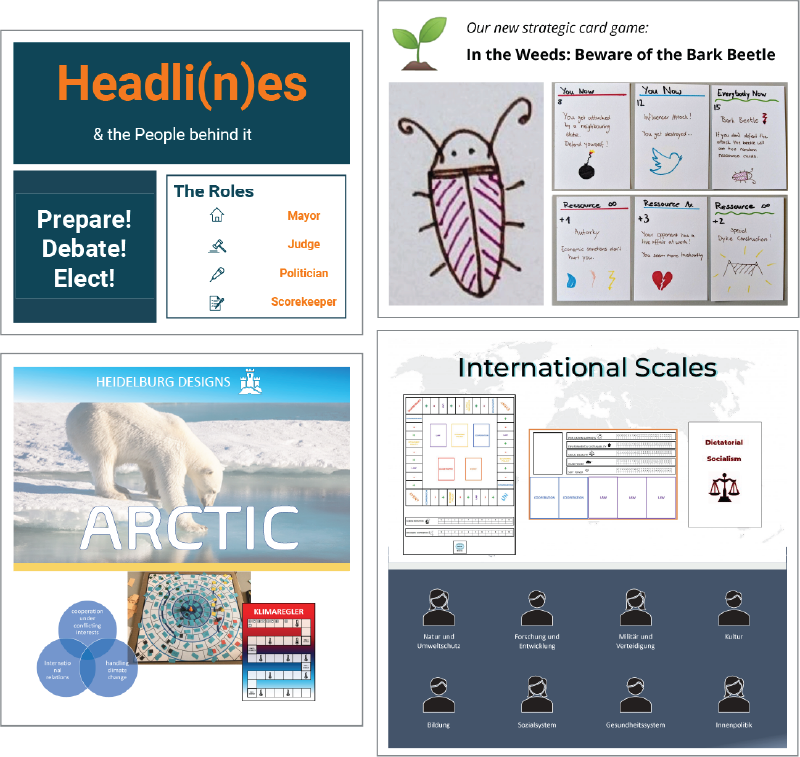
Game pitches presented by students at the Summer Academy, hosted by Studienstiftung des deutschen Volkes.
When asked about the most exciting part of the experience, students shared that it was their unique introduction to game design and a newfound grasp on what play can evoke in minds and in the world. In completing their first game design project using iThrive's approach, students gained a new understanding of "[the] connection between theoretical international relations and the implications for a game," "[the] psychological effects of games," "[how] emotions help to learn," and "how to introduce complex concepts in a playful way."
"There's an incredible richness in what young people can learn and uncover from playing and designing games," shares iThrive's Susan Rivers. "iThrive Studio nourishes the magnificence they already possess by sharpening their creative problem-solving skills and supporting their ability to be in the world with curiosity and empathy."
Students left iThrive Studio: Olang motivated and inspired by the opportunity to work fully in their genius, thinking critically about how we design communities that care for self, others, and the planet, and voicing their perspectives on the systems that affect them. The connection-building and social and emotional learning fostered in this uniquely generative space invoked lasting knowledge each designer could take into the real world. Summed up perfectly by the students, "making a game takes creativity and openness,"..."my biggest takeaway from this experience is to follow the creative impulses, dare more, and think outside of the box."
Curiosity Propels Discovery. How Are We Supporting It in Teens?

Why?
As teens progress through adolescence and develop their capacity to reason thoughtfully and think critically, this three-letter question becomes all the more important and prominent in their lives. The cognitive growth teens undergo propels them to investigate the 'whys' that shape how they live and see their world. They move from thinking concretely and heavily relying on physical observations to thinking abstractly about possibilities. In this last major phase of development, where teens are primed to learn and adapt, curiosity becomes a growth point, and game design uniquely nurtures it in them.
One of the best things we can do for teens as adults who care about their learning and wellbeing is strengthen their ability to poke, pry, and imagine with purpose. For us here at iThrive, care is a verb. We show our care for teens by actively centering their magnificence, creating experiences with and for them that build on their genius and support their thriving. Our iThrive Studio programs and workshops bring collaborative game development experiences to teen groups that meaningfully engage them in complex and creative thinking about the world they live in, the systems they navigate, and the social change they would like to see.
This summer, we partnered with the Frank Batten School of Leadership and Public Policy to co-host the Policy Leadership Advocacy by Youth, or PLAY, Program on the University of Virginia campus. With funding from the Jefferson Trust, 50 high school students experienced a weeklong exploration of policy that featured resume-building workshops and lunch-and-learns with real-world policy leaders. Each day of the PLAY Program began with an iThrive Studio workshop where teens used activities from our Game Design Studio Toolkit to dig into the social issues they care about and the big questions they have in the space of a game. A suite of teen-developed game prototypes came from these daily workshops, each centering a societal challenge and possible solutions.

Artifacts made by teens who participated in the Policy Leadership Advocacy by Youth, or PLAY, Program held at the Frank Batten School of Leadership and Public Policy.
Game design is a powerful lever for schools, organizations, and programs looking to support and maximize the creative potential of the teens they teach, know, and gather with. Here are three ways the game design approach we use in iThrive Studio programs helps young people build the social, emotional, and cognitive skills to be curious and stay curious.
-
Design thinking activates systems thinking. As designers, teens outline rules, characters, ways of progressing, and win and loss states to craft structured games. To create a play experience that holistically represents the systems they want to examine, teens must break down components to understand a bigger picture and, in doing so, are nudged to delve deep and think concretely about the specific changes they want to see. "There are so many ways that you can help solve world problems," shared one teen in the PLAY Program. "I learned new ways to think about them."
-
Game design supports metacognition. The design challenge teens are presented with during an iThrive Studio program invites them to think critically about what they want people to feel, think, say, and do after they play the games they create, along with the mechanics needed to facilitate those responses. As teens work through the challenge, they are constantly thinking about thinking as they consider how closely their creations have embodied their perspectives and how others view and respond to the same ideas. "When making a game promoting policy, it needs to be committed to the topic," shared one teen on the last day of the PLAY Program. "The game should make you feel what you're trying to address about a policy issue."
-
When creating a game, experimentation is rewarded. iThrive Studio programs create opportunities for teens to share their game prototypes with their peers, gather feedback, and revisit their creations to fine-tune and configure new ideas. This iterative practice supports teens' divergent problem-solving skills as each snag pointed out in a playtest becomes a pathway to new learnings and discoveries. From this expanded view comes a more comprehensive understanding of the power teens have and the role they can play in addressing issues they care about. "It's the fact that no matter how few or how many, or who you are as a person, you can make a difference in your world," shared one PLAY participant on the last day of the program.
Core to our vision of teen thriving is helping young people connect with and contribute to their communities and supporting them in noticing a desire for greater meaning and purpose. Curiosity plays an integral role in each of these aims as a precursor for empathy and an engine for ingenuity. Our iThrive Studio programs provide teens with a generative space to exercise their curiosity, and safely explore, try on, and configure new ideas. The social, emotional, and cognitive skills that teens strengthen while immersed in the program support their capacity to take on the design challenge of shaping the world they want to live in together and joining in the work with a spirit of inquiry. Learn more about our iThrive Studio programs and contact us to start the process of bringing one to your school, organization, or group this year.
SEED Designers Share History & Harm of Surveillance in New Escape Room Game
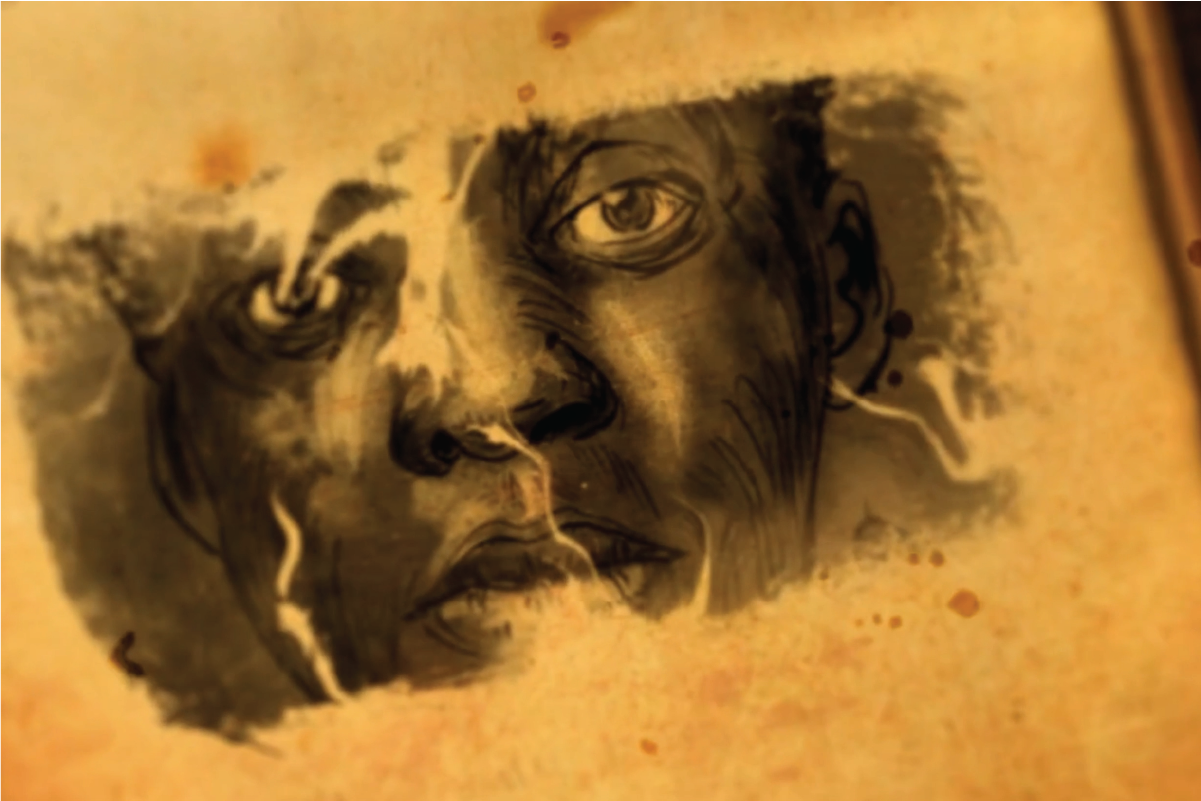
BOSTON—The SEED Institute, a youth-led game design studio collaboratively launched by Transition HOPE, BMA TenPoint, and iThrive Games, was awarded a Summer of Healing grant in July 2022. The funding enabled SEED Designers to bring As They Watch Us, the latest addition to their game library, to shared spaces in Boston, MA, and use its eye-opening play experience to foster conversations about surveillance rooted in truth and restoration with community members.
The SEED Institute creates games that amplify its design team members' lived experiences and perspectives on the cradle-to-prison pipeline, inviting all who play the games to join in their commitment to disrupting its harm. SEED Designers continued their social change work this summer with The Heller School's Racial Justice and Tech Policy Initiative (RJxTP). From their research and discussions with graduate students, researchers, and policymakers came the prototype for As They Watch Us, an escape-room-style PC game that powerfully names and shares how Black and Brown bodies have been surveilled and overpoliced throughout history and to this day.
"As They Watch Us is a game based on the injustice that comes with surveillance and how it affected and still affects the world around us today," shares Jordan, a SEED Designer. "To make it, we researched the oppression that was and still is surveillance, and that research is the very lifeblood of the game. You look through texts, images, and other aspects of four different rooms representative of four different time periods - slavery, the Civil War, the Civil Rights Movement, and today - to find and put together all the pieces of the puzzle about surveillance and its impact."
As They Watch Us uniquely illustrates the throughline of surveillance in Black and Brown communities and its harm in an immersive way that invites players to make meaning of what they encounter as they explore. Using iThrive Games' game design studio approach, SEED Designers merge design thinking with systems thinking. They carefully examine their lived experiences, the historical origins of oppressive systems they navigate or witness, and the policies that enable their ongoing structural harm. "A game presents a compelling and concrete way to think about systems, and the critical thinking involved in that is high level," shares Susan Rivers, Executive Director and Chief Scientist at iThrive Games. "From that critical thinking comes opportunities for SEED Designers to name how things were, how things are, and how things could be."
This summer, SEED Designers brought a prototype of As They Watch Us to We Belong, a youth leadership program led by Boston Police officers Jeff Lopes and Jorge Diaz at Northeastern University. Community members playtested the game and shared learnings and feedback with SEED Designers. Like those who've played games developed by the SEED Institute, community members applauded the play experience for its creativity, resonance, and truth-telling.
The Summer of Healing grant was awarded by Heal America, a movement to fight racial injustice with love and redemption. For SEED Designers, amplifying truth, be it historical or personal, fosters an understanding that sets the scene for reform and reparation. "SEED is trying to teach what is not being taught," shares Jordan. "The racism that has rotted in this country is there and has been there for hundreds of years, so why haven't people been educated? That is the reason for this game. To educate younger generations on surveillance and inequities in technology, to create policies that protect the privacy of Black and Brown communities, and to amend policies that disproportionately harm them."
To Janelle Ridley, founder of Transition HOPE and Associate Director of RJxTP, this centering of young people's perspectives and voices is necessary to disrupt surveillance tactics and the top-down approaches to policy solutions that perpetuate them in different forms throughout history. "We rely heavily on the adults who make these decisions, but they're not the ones that are boots on the ground," she shares. "They're not proximate to the community, and they're not proximate to the system itself. Youth need to inform what policies need to look like and where the changes need to be made."
The spaces, dialogue, and action that the SEED Designers have hosted and ignited with As They Watch Us and the other games they've created is a testament to the brilliance and boldness they've channeled throughout the game development process in advocating for themselves and their communities. "SEED is not an external intervention that people helicoptered in and dumped on the community," shares Rev. David Wright, Executive Director of BMA Ten Point. "This is homegrown. This is organic. This is an intervention that helps people build the resiliency within themselves to be able to make the change that they want to make."
And to Jordan, "all of this is for a better future."
Learn more about the SEED Institute and its library of games at www.seed-institute.com.
Media Contact
Eghosa Asemota
Director of Marketing and Communications, iThrive Games
eghosa.asemota[@]ithrivegames.org
New Narrative Game Raises Awareness of ACEs & Their Impact on Youth Mental Health
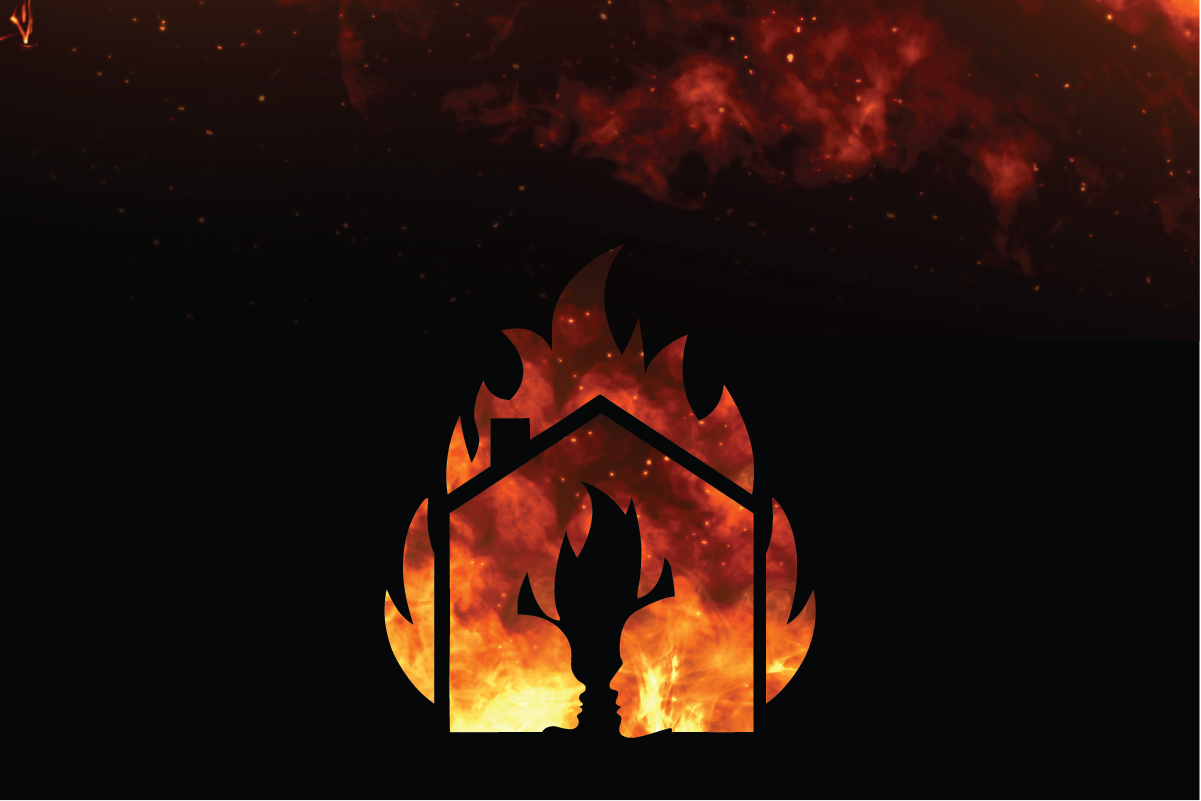
"Afraid."
"Disturbed."
"Sad."
"Aware."
These are some of the emotions that Malik, Dana, and Luisa—three of the SEED Designers behind Children of the Flame—want people to feel while playing it. Expanding the SEED Institute's library of games that gives voice to their lived experiences as young people, Children of the Flame is a trauma-informed, single-player narrative game that invites players to engage with a set of characters in a meaningful and awareness-building way. All characters are young people of color who attend the same predominantly white high school and are enrolled in a METCO program there. One afternoon, all characters end up in the same detention room. The player behind the headset must figure out what led the characters to be in trouble. Clicking on each character enables the player to be transported to that character's home, where they can explore their room and neighborhood to learn more about their life, family, and community.

A look at this first vertical slice of the single-player virtual reality (VR) game, Children of the Flame.
Children of the Flame's immersive story structure weaves in generational trauma and adverse childhood experiences (ACEs). The Centers for Disease Control and Prevention (CDC) defines ACEs as potentially traumatic events that happen in childhood (0-17 years). "Everyone experiences ACEs differently and not all young people who experience them will be impacted negatively. Of course, the more ACEs that one experiences, the more likely there is to be a negative impact," says Dr. Lora Henderson, an assistant professor and licensed clinical psychologist who collaborated with SEED Designers on a workbook that'll accompany the game and deepen understanding of the impact of ACEs and trauma. "ACEs and the subsequent trauma they can cause often result in physiological and psychological responses that get in the way of typical adolescent development."
Understanding the need to protect young people's physical and psychological development, the young architects behind Children of the Flame intend for it to be educational and preventative for teenagers in middle and high school. In each character's room—built with game development partners at FableVision Studios—SEED Designers nested opportunities for players to familiarize themselves with ACEs, supporting young people in understanding their developmental impact and influence on physical and mental health. As Luisa said, "having a little bit of knowledge can make a difference." "ACEs can affect anyone," Dana echoed. "Everyone can have trauma or a blocked memory that does not let them see that they also suffer from ACEs too."
The games SEED Designers make and share with the public help create the conditions to better support young people as they develop into adulthood. iThrive Games works closely with the youth design team supporting them with mentorship and guidance that helps them apply and translate their lived experiences into games that reflect the nuances of their journey to stakeholders and advocate for the systems change they'd like to see. Janelle Ridley, Director of the SEED Institute, sees the use of game design as a valuable method for telling stories in a resonant way that ignites action. "This allows other young people to tell their stories in a way that doesn't keep them at guard," shares Ridley. "[It] is a way of having uncomfortable conversations in a manner that allows people to really grasp at what the context and the content of what is actually happening."
Teens who play Children of the Flame and go through its accompanying workbook learn to identify how ACEs and trauma affect how bodies and brains develop. The rich dialogue and visuals in each character's backstory expose teens who have had ACEs to ways that they can seek support, including finding a trusted adult and using language to communicate to others the help they need.
The in-depth research and conversations with mental health practitioners and community members that supported the design and development of Children of the Flame helped SEED Designers make sense of their own experiences. From their introspection and unpacking of their own trauma came supportive tips shared from a place of hope and a desire to disrupt harmful cycles. "[Making this game] helped me reflect and re-evaluate my own life." shares Malik. "I want [players] to know it's not normal what they're going through. And it's not too late."
Advocating for structural supports that will reduce the impact of ACEs, Children of the Flame is also a way for police officers, members of community organizations, school personnel, and other adult stakeholders to deepen their awareness of the need for trauma-based approaches, their understanding of trauma-informed practices, and their commitment to adopting those practices in their work."Trauma-informed practices and approaches create a sense of safety and humanity for young people who are involved in systems," says Dr. Henderson. "By using trauma-informed approaches, systems can ensure that they are not re-traumatizing their young people and that they are uplifting their voices and including them in making decisions that impact them."
Reducing the occurrence of ACEs cannot happen without awareness, and the development of systems that mitigate the impact of ACEs on young people's life outcomes cannot happen without youth voices and ideas steering the change. The social change that SEED Designers want to see and contribute to with Children of the Flame is rooted in this belief. As we observe National Minority Mental Health Awareness Month this July, we're reminded that the unique mental health challenges faced by communities of color are exacerbated by a system that demonstrably over-polices and under-protects them. "Children of the Flame provides a gameplay experience that speaks truthfully about young people's lived experiences in this system," shares Susan Rivers, Executive Director and Chief Scientist at iThrive Games. "This game springboards support to young people, calling all who care about them and staff the spaces they navigate to embody the trauma-informed practices that help reduce the harm."
The first chapter of Children of the Flame is slated to launch later this year as a virtual reality experience and desktop game. The game along with its accompanying workbook will be used to engage stakeholders and raise funds to support its full development. Sign up today to be one of the first people notified when the first chapter of this game becomes available.
iThrive Shares Wins with Affordance, SEED Institute at 2022 Serious Play Awards
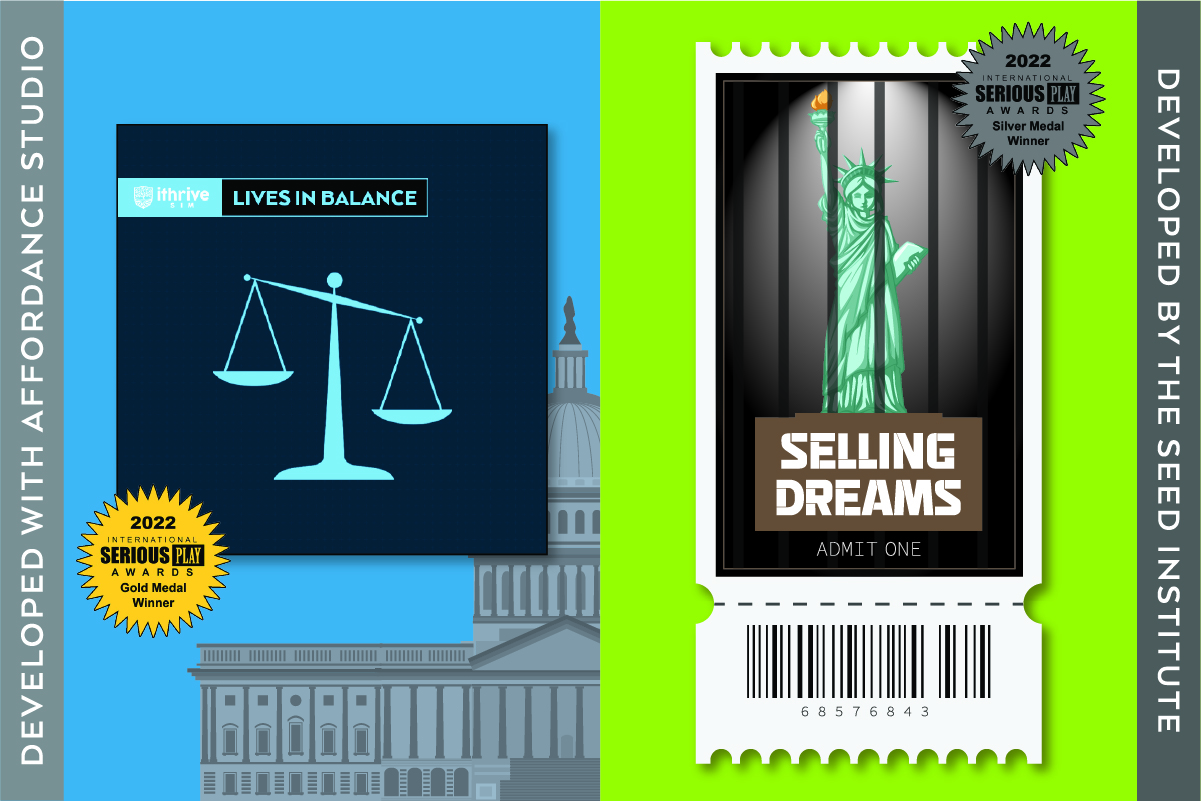
For Immediate Release: June 29, 2022
BOSTON— iThrive Games is pleased to announce two shared wins from the 2022 International Serious Play Awards, a program that honors outstanding commercial and student-developed games created for educational use.
iThrive Sim: Lives in Balance, created with our software development partners at Affordance Studio and the masterminds behind the Situation Room Experience, won a gold medal in the K-12 Education category, while Selling Dreams, the latest from youth game designers at the SEED Institute, won silver in the Non-Profit Training category.
Both digital games are hosted on the iThrive Sim platform, a lever for embodied learning and real-time interpersonal connection launched in 2020 to support the unique educational needs of the COVID-19 classroom. On an easy-to-use interface, players are asked to adopt roles, and are presented with unique information and decisions they must wrestle with in real-time. The players make choices that have ripple effects and drive the game forward. The device-agnostic, web-based software uses synchronous and asynchronous information delivery mechanisms to get players to work together and engage with the information they encounter in different ways. The immersion that iThrive Sim facilitates promotes enduring understandings that can be built upon in post-play debriefing sessions.
iThrive Sim: Lives in Balance, played by over 1,600 students and counting, uses iThrive Sim's dynamic features to enliven teen civic learning through student-led connection, improvisation, and embedded opportunities to grow 21st-century competencies. The interactive experience invites teens to play as government officials tasked with making tough decisions in response to a fictional pandemic. As players work through the 35-minute, tech-supported experience together, they evaluate data and lean into social and emotional skills like collaborating, advocating for their points of view and constituents, and compromising with each other to chart a path forward in uncertain times. Curricular surrounds and activities pair with the role-playing simulation game to deepen and extend the civics educational experience.
Selling Dreams, launching later this summer, uses iThrive Sim's immersive platform to tell SEED Designers' stories in an honest and resonant way that names the structural harm and shortcomings they've observed and experienced in Massachusetts' child welfare system. The single-player game invites case workers and youth-serving adults to take on the role of a Guardian tasked with meeting the needs of the young people they encounter and helping them through their unique challenges. In their role as a supportive actor, each Guardian must stay on top of files, messages, and relevant news sent to them about the youth they serve. Players must make decisions throughout the game using the insight they gather about how to engage with those in their care. With the 30-minute game, SEED Designers highlight the demands and stressors experienced by case workers tasked with disrupting the harm while providing a meaningful training opportunity to think critically about the behaviors that encompass truly responsive care and support.
Both digital games attest to the boundless creativity the iThrive Sim authoring platform supports. The content management system used on the platform allows for the development and editing of role-playing scenarios that fit the unique needs of each audience. The iThrive team is excited to invite new partners to use iThrive Sim and support them in creating new interactive, accessible, and scalable learning experiences.
"The iThrive Sim platform is embedding social and emotional learning opportunities to enliven teen-centered learning across so many topics, from civics to relationship health, to emergency preparedness, and more," says Susan Rivers, iThrive Executive Director and Chief Scientist. "One of iThrive's greatest joys is in co-creating new iThrive Sim scenarios with partners — young people and adults alike — in various sectors to amplify teens' strengths and interpersonal connections and make deep learning not only possible but immensely fun and impactful."
To learn more about the iThrive Sim authoring platform, click here. To contact us for questions related to licensing and developing experiences on the iThrive Sim platform, click here.
###
Media Contact: Eghosa Asemota (eghosa.asemota[at]ithrivegames.org)
About iThrive Games: iThrive Games prepares teens to thrive by meeting them where they are and working in partnership with them to co-create a world where their brilliance is honored, nurtured, and amplified. We use games and game design to equip teens with the social and emotional skills they need to be healthy and resilient.
SEEDs’ New Game Pushes for Change in Massachusetts’ Child Welfare System
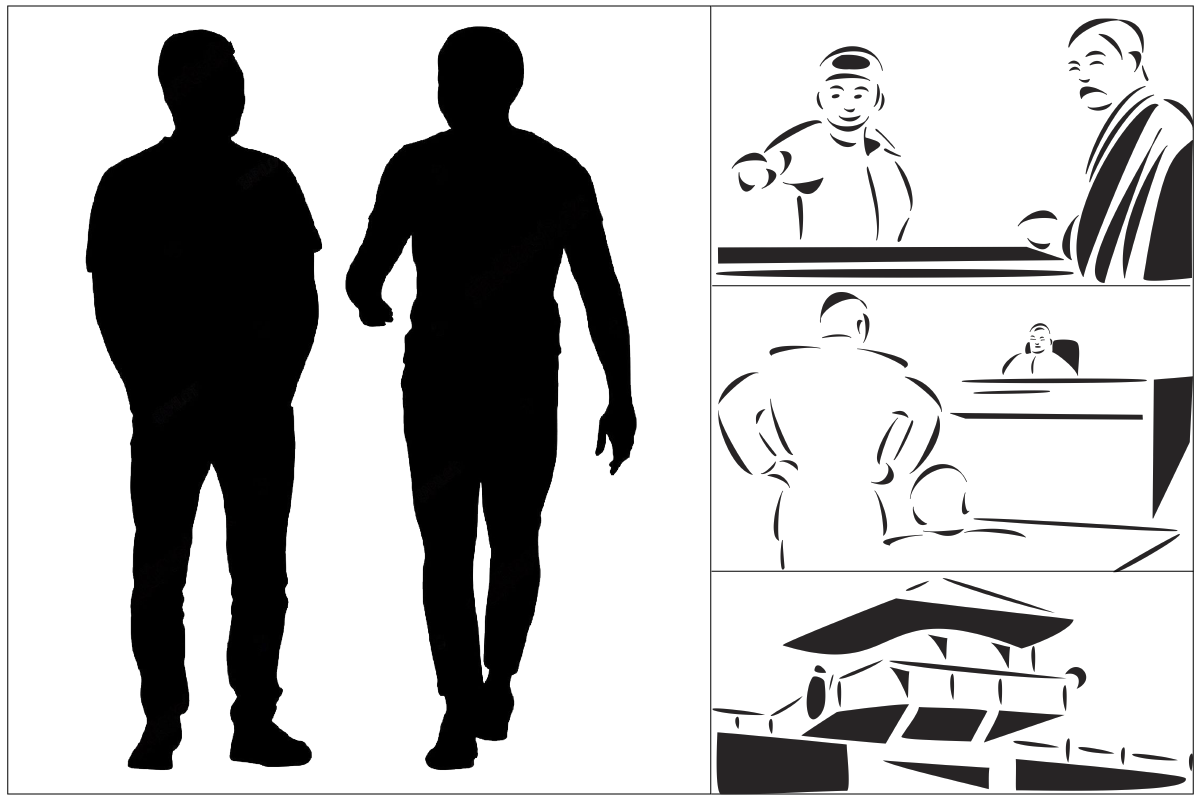
"The system is set up against our community, and it shouldn't be this way," says Kaleya, one of the young designers at the SEED Institute behind Selling Dreams, a single-player online simulation game developed on the iThrive Sim platform. "This game is a wake-up call."
Selling Dreams invites players to take on the role of a Guardian tasked with meeting the needs of the young people they encounter and helping them through their unique challenges. In their role as a supportive actor, each Guardian must stay on top of files, messages, and relevant news sent to them about the youth they serve. Players must make decisions throughout the game using the insight they gather about how to engage with those in their care. These decisions are all final, have different consequences, and can impact the Guardian's 'Respect Meter,' which gauges the level of trust and rapport the young people have toward the player.

"This game shows you what kids are facing—false promises that are being made by the system," shares Bernado, the lead designer behind the SEED Institute's award-winning board game, The Run Around. Like its predecessor, Selling Dreams mirrors the lived experiences of SEED (System Educated Expert Disruptors) Designers who navigate or have navigated Massachusetts' juvenile justice and child welfare systems. The SEED Designers' stories and experiences inform the game's content, reflecting the interactions and relationships they've had with adults to prescribe what was needed in the crucial moment they were in. The designers are training the case workers tasked with disrupting the harm they've personally experienced by inviting them to confront similar harms in the game, and think critically about the behaviors that encompass truly responsive care and support. "Selling Dreams gives the player hands-on experience at taking on the role of a guardian," says Justin, a SEED Designer voicing several of the videos and audio clips featured in the game. "You get a caseload of different youth and have to make the best decisions in order to help their cases."

The short simulation game not only aims to transform the behaviors of the people who staff MA's youth-serving systems but also advocates for structural change by those who design those systems. "There are many stressors and competing demands experienced by adults who are charged with supporting young people in the juvenile justice or child welfare system," says Kaleya, "and these systems heavily affect the youth in our community." These factors in Selling Dreams mirror the real-life circumstances of caseworkers in MA and across the country, reflected in each Guardian's assigned caseload and the pacing of updates they receive. "There's a huge pressure on the Guardian to make the right choices and focus on their cases," says Justin. As the SEED designers note in the impactful play experience they've created with Selling Dreams, part of the work to support young people is making the delivery of responsive care structurally possible in Massachusetts and across the nation.
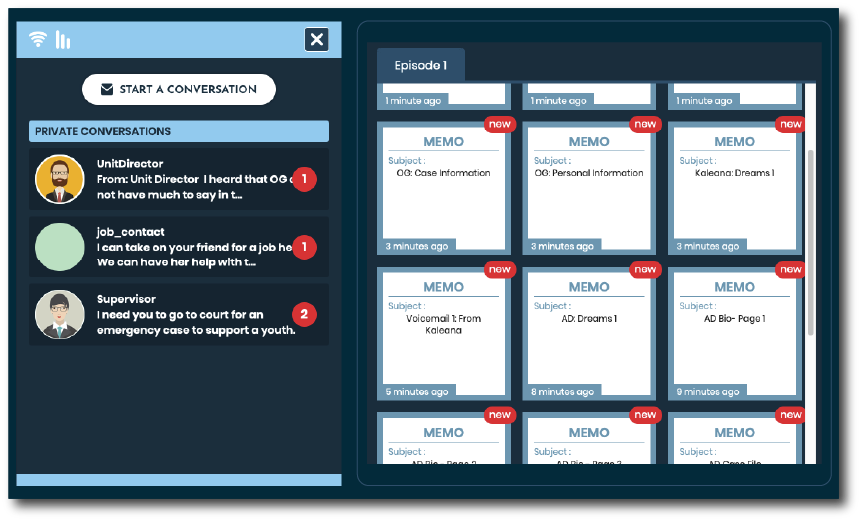
Amidst an intensifying youth mental health crisis, the work to support the well-being of young people demands that we challenge our assumptions about what is needed to keep them safe and support their health and thriving. It takes honesty to design a system of support that meets young people; core to that honesty is the voice of young people. Selling Dreams tells the SEED Designers' stories in an immersive and truthful way that names the structural harm and shortcomings in Massachusetts' child welfare system. The game provides a meaningful training opportunity for youth-serving adults to think critically about how they're showing up for adolescents. It is the SEED Designers' hope that in this current system where young people are functionally voiceless in expressing their needs, this game equips all adults who work in systems that impact young people like them with the insight to approach, engage, and respond to them meaningfully. As shared by SEED Designer Bernado, the goal is for those who play Selling Dream to walk away from the experience with a renewed commitment to "paying attention, listening to the kids, and creating more opportunity for them." In realizing these behaviors, we create an ecosystem of youth-serving actors rooted in care, empathy, and intention.
This summer, Selling Dreams will join the SEED Institute's growing library of games played with stakeholders in Massachusetts and shared with the world to advocate and ignite systems change. Sign up here to be notified when the online game launches and is available for purchase.
New PLAY Program Invites Teens to Design Games That Explore Policy Issues
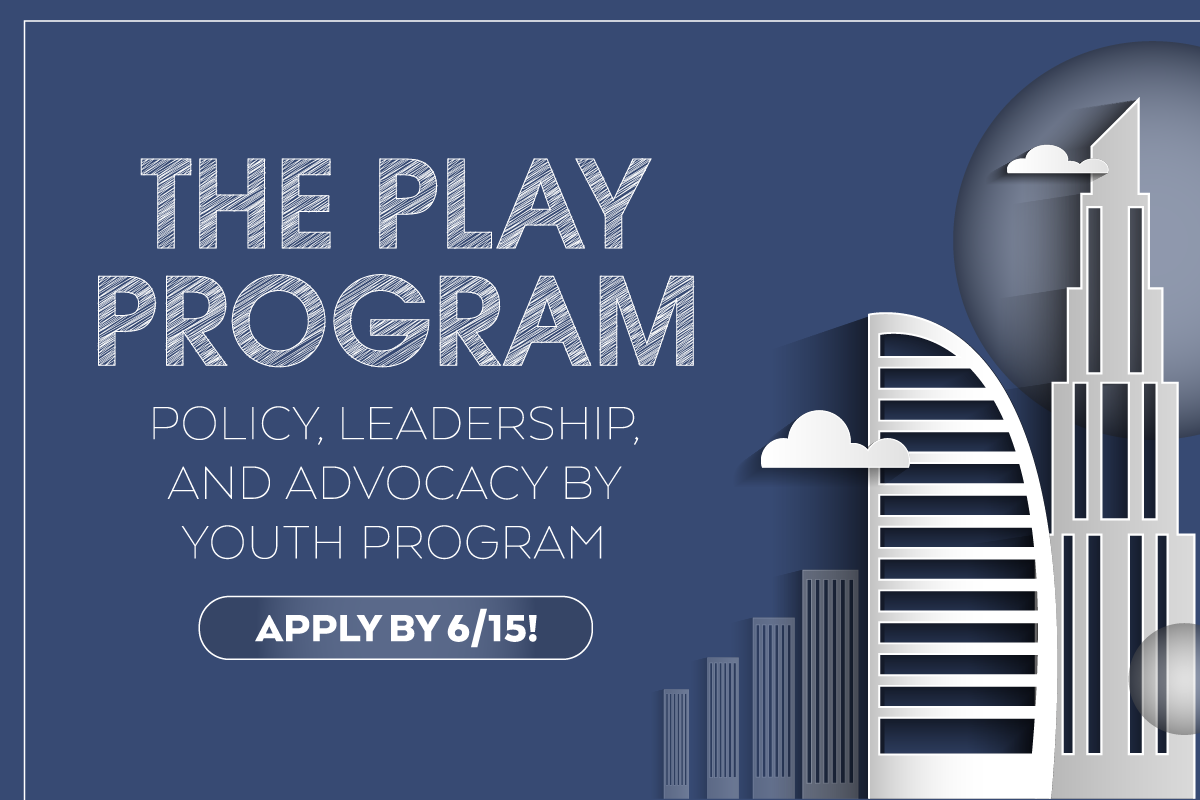
As agents of change, teens have the curiosity to ask the big questions, the tenacity to unpack social issues, the brilliance to dream up solutions that respond to them, and the willpower to make those solutions real. At iThrive Games, we work with and for teens, creating learning experiences that center play and game design to meet them where they are, engage them in their genius, and nurture their change-making abilities and social and emotional skills.
This summer, we're excited to join forces with the Frank Batten School of Leadership and Public Policy and build on our library of teen-centered learning experiences with the PLAY (Policy, Leadership, and Advocacy by Youth) Program. The PLAY Program will bring 40 high school students from across the Piedmont, VA area together for an all-expense-paid, week-long program at the University of Virginia. Students will use game design activities from our Game Design Studio Toolkit to explore policy issues and potential solutions that impact them and today's teens.
From policies around mental health to education to homelessness to gun control, teens will also connect with real-world policy leaders and gain exposure to the practical "toolkits" they use in their own impactful careers. Professional development opportunities like resume- and college essay-writing workshops will complement other interactive activities like a field trip to the Moton Museum—the birthplace of the U.S. student civil rights movement-and a graduation luncheon.
Thanks to a generous donation from the Jefferson Trust, all expenses, including meals and transportation, will be covered. The program will run from Monday to Friday, July 18 to 22, from 9 a.m. - 4 p.m. daily (ending at 1 p.m. on July 22). Participants should be high school students committed to engaging with other teens throughout the program and making a positive impact in their communities at its conclusion. Invite the teens you know to apply by Wednesday, June 15th!
APPLY TO JOIN THE PLAY PROGRAM
SEED Designers Bring Games & Experiences to The Heller School at Brandeis
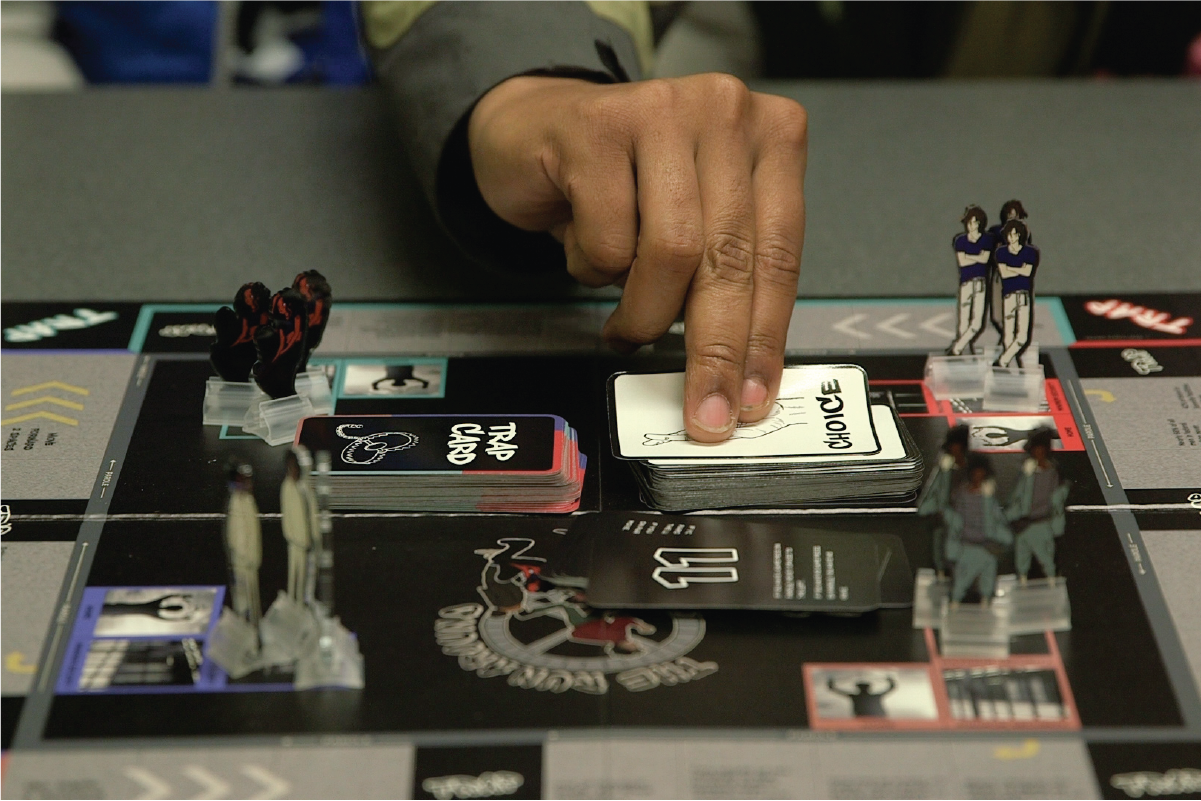
This summer, youth designers at the SEED Institute are bringing their expertise (and games) about the harmful systems they've navigated to graduate students at The Heller School for Social Policy and Management at Brandeis University.
Those who are most impacted by systemic harm know what's needed to disrupt it.
This belief is a foundational one at the SEED Institute, a collaborative effort between Transition HOPE, iThrive Games, and the Black Ministerial Alliance-Ten Point Coalition. At the Institute, young people are SEEDs—System Educated Expert Disruptors. Synthesizing their lived experiences navigating systems of oppression into structured games, SEED Designers use play to advocate for meaningful change in youth-serving institutions. They then bring the games to sessions with community stakeholders throughout Boston, where the designers facilitate play-based conversations to share knowledge, identify and unpack inequities, and imagine possibilities for systems that truly nurture youth. The work of the Institute so far has been powered by SEED Designers' inventiveness and their commitment to building relationships and facilitating conversations that ignite and inspire action.
For a few designers at the SEED Institute, advocacy began with Transition HOPE's Summer of HOPE 2018, an initiative that paired them with graduate students and faculty at The Heller School for Social Policy and Management at Brandeis University. Working as research assistants over seven weeks, the SEED Designers had the opportunity to learn more about how structural violence impacts day-to-day life. Meanwhile, the graduate students and faculty learned more about how to best support young people.
This year, the SEED Institute will continue this vital work with The Heller School's newly launched Racial Justice and Tech Policy Initiative (RJxTP). Through this initiative, SEED Designers will engage in research and develop a game as part of the Hidden Bias Research Prize. RJxTP aims to create more opportunities for knowledge-building and knowledge-sharing between and among youth designers, graduate students, researchers, and policymakers. SEED Designers will use their stories, wisdom, understandings, and ideas to contribute to the dismantling of systems of injustice. Check out the video below for a glimpse of the collaborative work ahead:
Stay in the loop! To quote one of the designers at the SEED Institute, "awareness is like a fire—and that's what we're here for; to spread that fire and spark change in somebody's mind." Keep up with the SEED Institute's design team as they develop and launch new games, and press forward with their advocacy and awareness-building through play, by signing up for our mailing list today.
Game Design Supports Deep Learning. Here’s How It Can Help School Communities.

Engaged learning and connection help us get to the world we're all yearning for—one where we all have the social and emotional faculties to work collaboratively with empathy and curiosity in support of our collective thriving.
At iThrive, we see game design and play as springboards for both, creating connective pathways for knowledge sharing and knowledge building. We invite teachers and students to be game designers as a way to activate deep learning. In using game elements like rules, characters, ways of progressing, and win and loss states to craft a structured game reflective of lived experiences, the game designer has the chance to think concretely about the specific changes they want to see in the systems they navigate. The game they create, in turn, offers a play experience that opens up space for dialogue, exploration, and empathic listening, setting the stage for deep reflection that inspires movement from aspiration to action.
On March 30, iThrive's Susan Rivers and Transition HOPE's Janelle Ridley brought game design to High Tech High Graduate School of Education's Deeper Learning 2022 Education Conference in a deep dive crafted to engage educators in innovative and collaborative thinking. Attendees of their "Game Design for Understanding and Learning" workshop were invited to use game design techniques to reflect on their experiences, connect with other educators who care deeply about student thriving, and envision new practices that support deep learning.
Pulling from our Game Design Studio Toolkit, the four-hour workshop began with play. We played The Run Around, a game created by SEED Designers, and a prototype of one of the games developed by Fugees Family students. These served as an introduction to iThrive's unique use of game design in youth-centered spaces to support generative thinking and social change. Play and icebreakers were followed by empathy mapping, where educators were invited to reflect on their lived experiences as learners and teachers. After analyzing their reflections and noting the shared themes among them, participants synthesized the themes to define core needs, challenges, and possibilities. Working collaboratively in groups, educators then gathered to ideate ways to represent their stories and experiences using game mechanics and world-building tactics. Those ideas came to life in the participants' prototyped game boards and accompanying materials, which were exchanged and playtested by other groups for feedback. From this interactive experience came deep reflection on the needs and wants of students and educators, how things are in education, and how things could be.
 The Warm-Up, Empathize, Define, Ideate, Prototype, and Test sequence taken from the Game Design Studio Toolkit.
The Warm-Up, Empathize, Define, Ideate, Prototype, and Test sequence taken from the Game Design Studio Toolkit.
By the end of the "Game Design for Understanding and Learning" deep dive, 25 educators created four game prototypes that focused on topics such as the importance of designing learning experiences for student agency; the unreasonable demands placed on teachers; how a culture of deeper learning, in contrast to a culture of testing, leads to student success ; and supporting students to embrace productive struggle. Each of these games was demoed at the Deeper Learning Showcase later that afternoon.

Game prototypes shared at the Deeper Learning 2022 Showcase.
Participants in the deep dive shared that crafting a game based on their lived experience was a great way to solidify their thoughts, think critically about systems they've navigated, and identify ways to change those systems. All were excited and engaged by the deep learning and reflection that surfaced from the experience, with teachers afterward calling game design "collaborative," "relevant," and "an interesting way to view issues and problems."
"The openness and curiosity that comes from play, which is energy giving, creates opportunity for imagination, and to think about what could be next," shares iThrive's Susan Rivers. "Bringing the Game Design Studio approach to Deeper Learning was an opportunity to support teachers in reflecting on new ways of doing and being in and outside of the classroom in service of young people's thriving."
For educators and administrators interested in unpacking challenges in their school communities or sparking new ideas that contribute to educator and student thriving, we invite you to use design thinking activities from our Game Design Studio Toolkit in your brainstorming. Activities included within the complete kit support active listening, needs mapping, and iterative testing to ensure the solutions you dream up with your team are relevant and responsive to your school's unique goals.
Here's a glimpse of what's on the other end of the exploration the Toolkit guides its users through in the context of education:

Interested in using game design to support design thinking and program development in your school community? Contact us to explore facilitation options crafted to help educators and administrators co-design youth-centered solutions with their students.
Refugee Students Use Game Design to Support Schools Welcoming Refugees
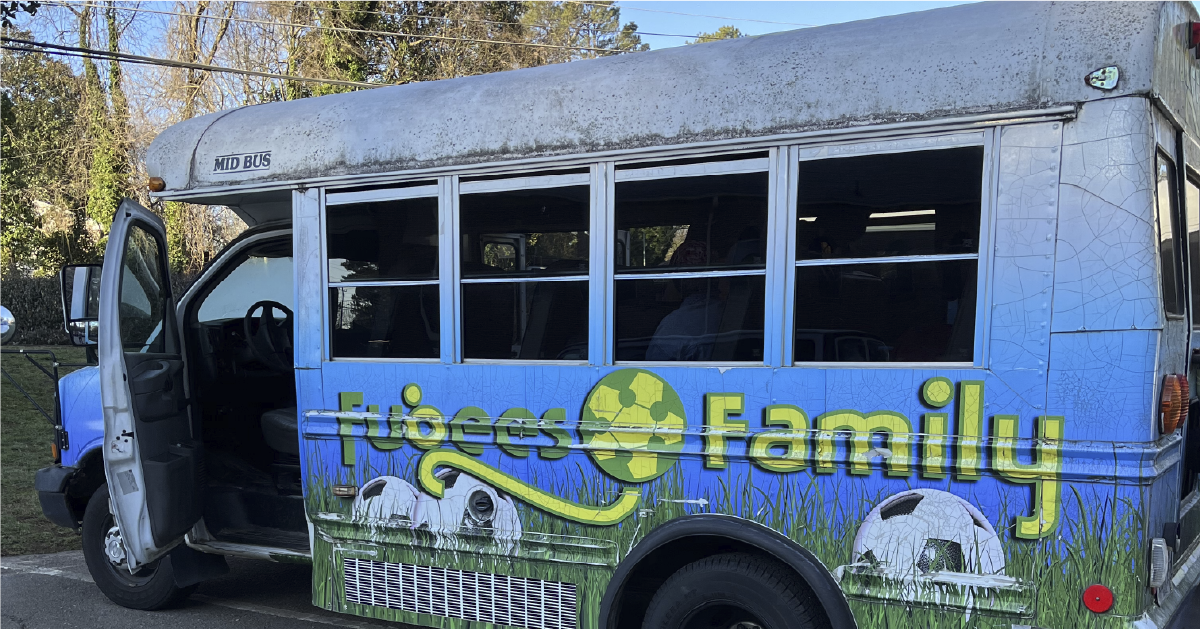
"What do you want teachers and other students to know, feel, say, and do when they connect with refugee students?"
On the morning of Wednesday, February 10th, members of the iThrive team posed this question to a group of experts—22 high school students from Fugees Family, a community-based school designed to meet the unique academic, social, and emotional needs of refugee students acclimating to life in the United States. What followed was two and a half days of deliberation expressed in story-sharing, collaborative thinking, imaginative drawing, and play, the insights from which will inform the creation of tabletop games that communicate an answer.
In December, Luma Mufleh, founder of the Fugees Family, approached iThrive and shared her desire to co-create with Fugees Family students resources that would highlight their expertise, communicate their experiences, build empathy, and ultimately, support schools across the nation who are accepting incoming communities of refugee youth. We knew then that game design, and the cognitive process it entails, was the way to go.
"Games are a safe way to learn about something," shares Luma. "We want to create empathy, so the games' content needs to come from those with lived experience. The games have to be through the lens of those who've experienced what it's like to be a refugee and enter a new country, school system, community, and lifestyle. And that's why it is super important to bring refugee students into the design."
iThrive's Game Design Studio program offers schools and youth-serving organizations a unique design thinking and social and emotional learning experience where teens play, analyze, reflect, connect, and design games that express their ideas and prompt change in those who play them. In bringing the Game Design Studio to Fugees students, our objective was to join the Fugees Family in their commitment to amplifying the voices of refugee youth. We committed to using what their students shared to develop games that center and highlight their courage, creativity, and resilience, and humanity.
Here's a snapshot of what was surfaced, shared, and dreamt up in our time together:
DAY 1: PLAY, IDEATION, AND MOOD BOARDS
The first day of the Game Design Studio began with play. Introductions were made during an icebreaker activity where each student and staff member shared their name and a dance move that everyone else in the group repeated and mirrored. The icebreaker was followed by an opening design activity that added new layers and variations to Rock-Paper-Scissors and invited students to name and explore mechanics that can be added and taken away to games to make the play experience more collaborative and comprehensive. Reflections on the 'Rockstar' and 'Giants-Wizards-Elves' versions of the classic game led to even more ideation as students played an array of board and card games, noting each game's components and reflecting on whether or not they'd like to incorporate them in the ones they were co-creating.
In the second part of the day, students explored how design can evoke emotions that enrich a game experience with depth and intention. After being assigned an emotion card that they were asked not to show to their peers, students grabbed a piece of paper and sketched out a scene reflective of the word on the card. Once done, students posted what they created on a board and did a gallery walk, making predictions about what mood each board communicated and noting how certain colors, imagery, patterns, and dialogue spurred visceral emotional reactions.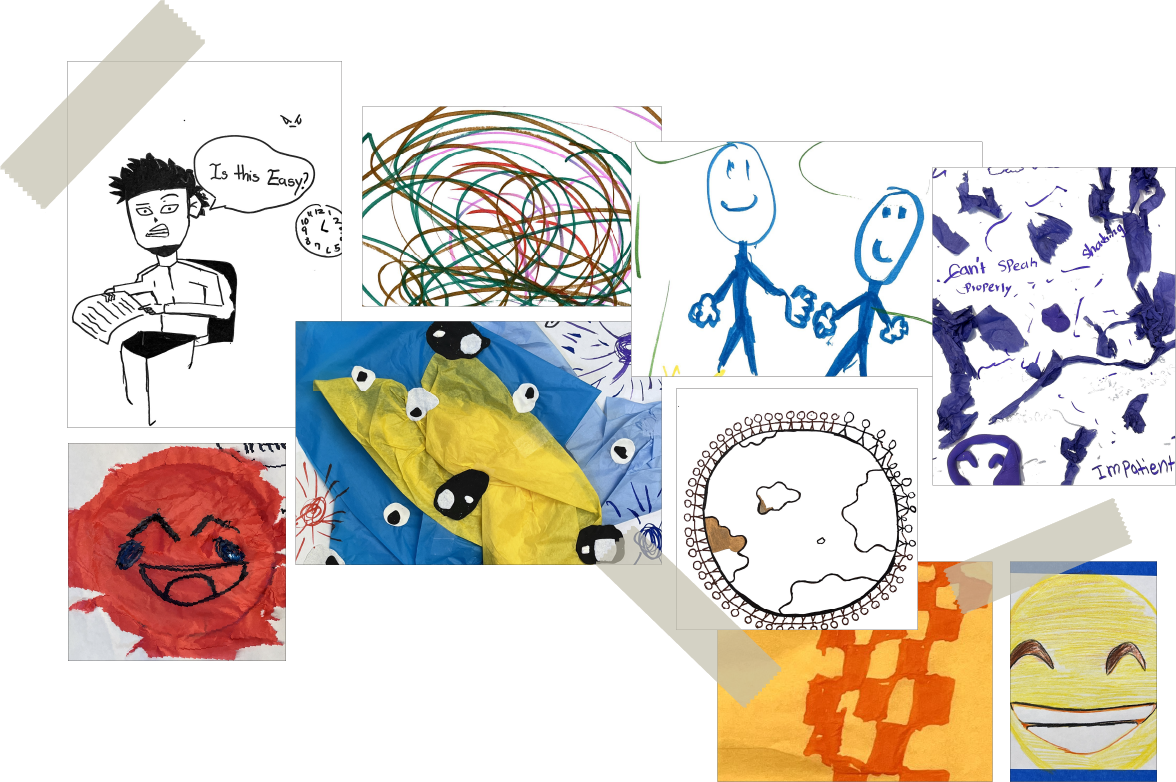
Mood boards created by students from Fugees Family.
DAY 2: CHARACTER DESIGN, WORLD-BUILDING, AND PAPER PROTOTYPES
"What does your refugee superhero look like?"
The second day of the Fugees Family Game Design Studio kicked off with this prompt and an invitation to dream up game characters. Students thought critically about the parts of every superhero's story—their origin, transformations, life shifts, weaknesses, superpowers, and strengths—conceptualizing characters reflective of the students' own personal stories and brilliance. After drawing and documenting these characters, students were asked to draw the world that surrounds their character, one that encourages them to step into and stay in their full power.
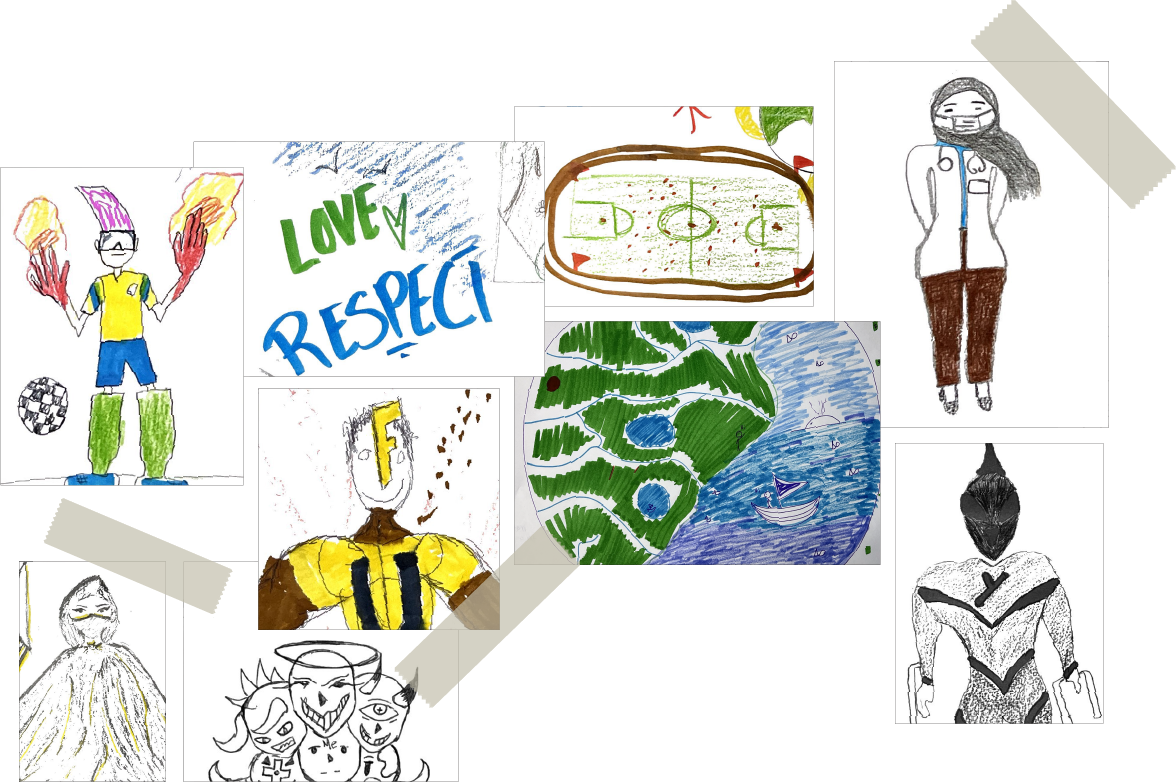
Worlds and characters designed by students from Fugees Family.
With worlds and characters in hand, students reflected on a critical question: "If your superhero was stripped of their superpowers and taken from the world that supports their thriving and special abilities, what could empower them? What could discourage them?" Pulling from both their lived experiences and imaginations, students, working in groups, began to map out the attitudes, actions, and behaviors they associate with a genuinely welcoming environment along with the ones they see as othering and isolating. By the end of the first part of the day, together, students had created 100+ cards with insights that will be incorporated into future games and learning tools to support the work of Fugees Family.
The remainder of the day was dedicated to paper prototyping and playtesting. On a game board template, students worked in groups to assemble games that centered and used the cards they made and behaviors they mapped. In brainstorming together, students laid out their game's learning objectives, mechanics, rules, and win and loss states. The iterative process of playtesting their games with others and then fine-tuning them based on observations and feedback led to the development of five paper prototypes with components that will be incorporated into the final games.
DAY 3: PLAYTESTING, STORY-SHARING, AND LIFE MAPS
A common thread in each of the five prototypes developed by the designers on Day 2 was a desire to create a gameplay experience that helped teachers and students—refugee and non-refugee students—learn more about each other. On the morning of the last day of the Game Design Studio, students built on this throughline. Working in pairs, they drafted questions and conversation starters on index cards. Once done, they swapped decks with another team of student designers and playtested their questions, ensuring they were all accessible, welcoming, and connection-centered questions. By noon, students had compiled over 200 conversation starters that will be shared in a future game.
The last few hours at Camp Twin Lakes were full of personal stories and reflections on what refugees leave behind, what they encounter on their way to refuge, and what life is like when they arrive. After Luma shared her grandparents' story of fleeing Syria during the Assad regime, students, gathered in a circle, used it as a springboard to dig deep into their own stories and note the similarities in their experiences.
For the last design activity, students spent time outdoors sketching out a life map that outlined the emotional journey of their lives so far. These maps, along with the creations and ideas generated up until then, will inspire a suite of games for teachers and non-refugee students that will support the welcoming of refugee youth who, as one student shared, "just want to be treated as human beings." As students and staff loaded onto the Fugees Family buses and left the camp, we were all reminded of what can come from co-creation and the role it plays in imagining new solutions.
"When we desire to imagine what a better future can be and needs to be, there's no one better to imagine and co-create with than teens," shared Susan E. Rivers, Executive Director and Chief Scientist at iThrive Games. "The teens from Fugees Family are the experts and the ultimate design partners in designing the tools schools and communities need to welcome families who have been forced to flee their countries. These teen designers bravely and candidly brought their lived experiences and expertise to Game Design Studio with the goal of helping schools offer safe and supportive and empowering environments for all students, including refugees. The schools they imagine are ones where all students—refugees and non-refugees—feel cared for and respected, where shared humanity is the connective tissue."
The Fugees Family model, centered in soccer, encourages every student to work as a team member to support collective thriving and well-being on and off the field. We see the tabletop games that will be generated from this Game Design Studio session with Fugees Family students as an extension of that model. The students' genius and honesty will lead the way for better support of refugee students and help schools get better at togetherness. Sign up for our mailing list today to be one of the first people notified when the games launch.
To learn more about the Fugees Family and their mission to advance educational justice for refugee and immigrant youth, visit their website at www.fugeesfamily.org.
iThrive’s 2021 Annual Report Celebrates Teen Genius, Community, and Play
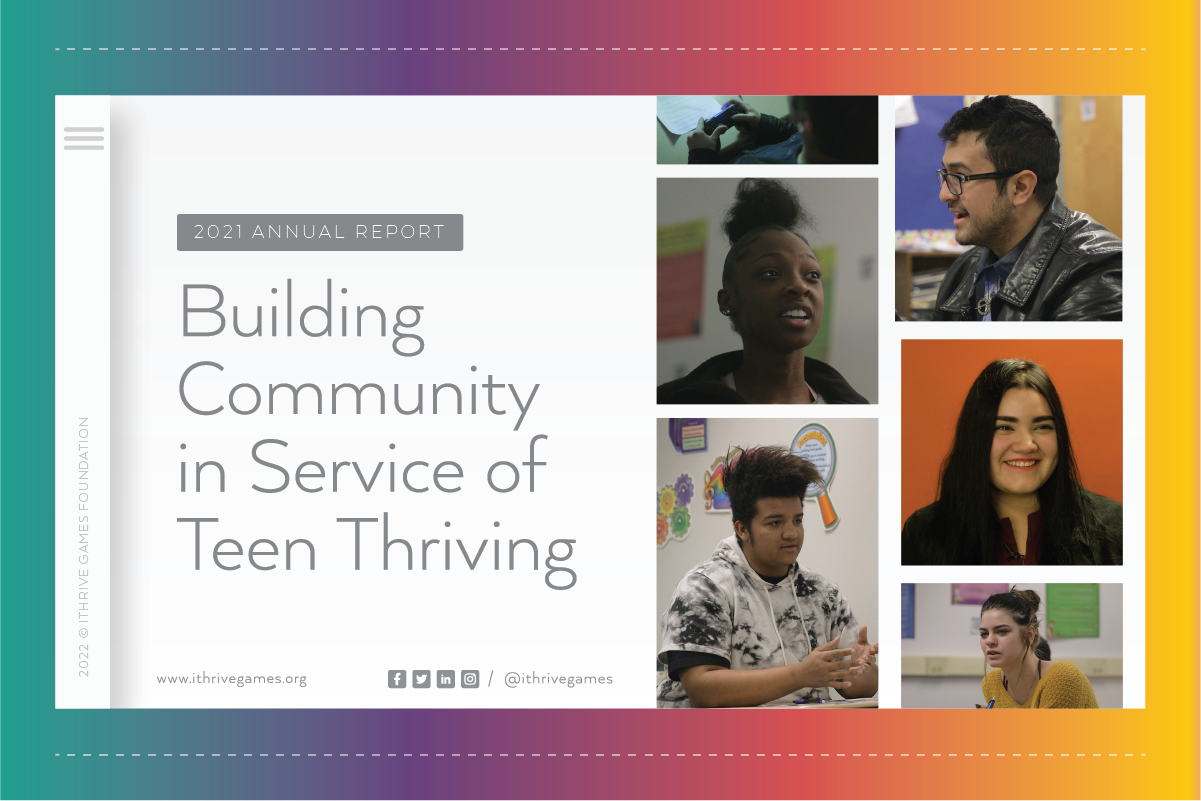
Connection brings healing the same way co-creation brings innovation—through intention.
In 2021, we intentionally leaned into both, connecting with teens, educators, game developers, university partners, museums, and youth-serving organizations across the globe to co-design meaningful learning experiences that enlist the power of play to support teen thriving.
True to our mission and vision, we actively sought partners who want to engage young people in their genius and support them in developing the social and emotional skills to be in the world they will one day inherit with both empathy and curiosity. Bridging our partners' subject matter expertise with our co-design approach ensured that teen voice remained at the center of every tool, experience, and resource that sought to engage them. Our 2021 Annual Report, Building Community In Service of Teen Thriving, highlights all that we co-created, refined, and shared last year. Here are a some of the report's highlights:
- Our commitment to knowledge-building and knowledge-sharing brought us to conferences where we connected, learned from, and shared with game designers, researchers, educators, administrators, policymakers, and other intersectional experts across the globe.
- iThrive Sim, our award-winning ed tech tool that hosts immersive civic learning experiences, expanded with two new role-playing simulation scenarios: Leading Through Crisis and Follow the Facts, both of which were created with guidance and input from students, teachers, and subject matter experts.
- In May, we launched iThrive Curriculum's third game-based learning unit, A Moment in Time, an eight-lesson social and emotional learning experience that pairs with the mobile game Florence and supports teens in reflecting on relationships, grief, loss, and life shifts.
- Working in partnership with iThrive, youth designers at the SEED Institute created and launched The Run Around, a board game that mirrors their lived experiences in the juvenile justice system, authentically communicates its harm, and advocates for structural supports capable of disrupting it. Since launching, The Run Around has garnered press in The Boston Globe and won gold at Serious Games' 2021 Serious Play Awards.
- Working with High Resolves Group and Rise, an initiative of Schmidt Futures, we have been working on curating transformative educational experiences and making them widely available through Symphony, a new online tool that supports student-centered and self-directed learning.
An all-of-us approach is needed in supporting youth as they navigate the complex challenges of this time. A special thank you to every teen, educator, and collaborator who connected with us in 2021 and joined us in our commitment to creating learning environments and shared spaces that ignite and value the potential of young people.
New Game Design Toolkit Supports Teens in Leading Systems Change
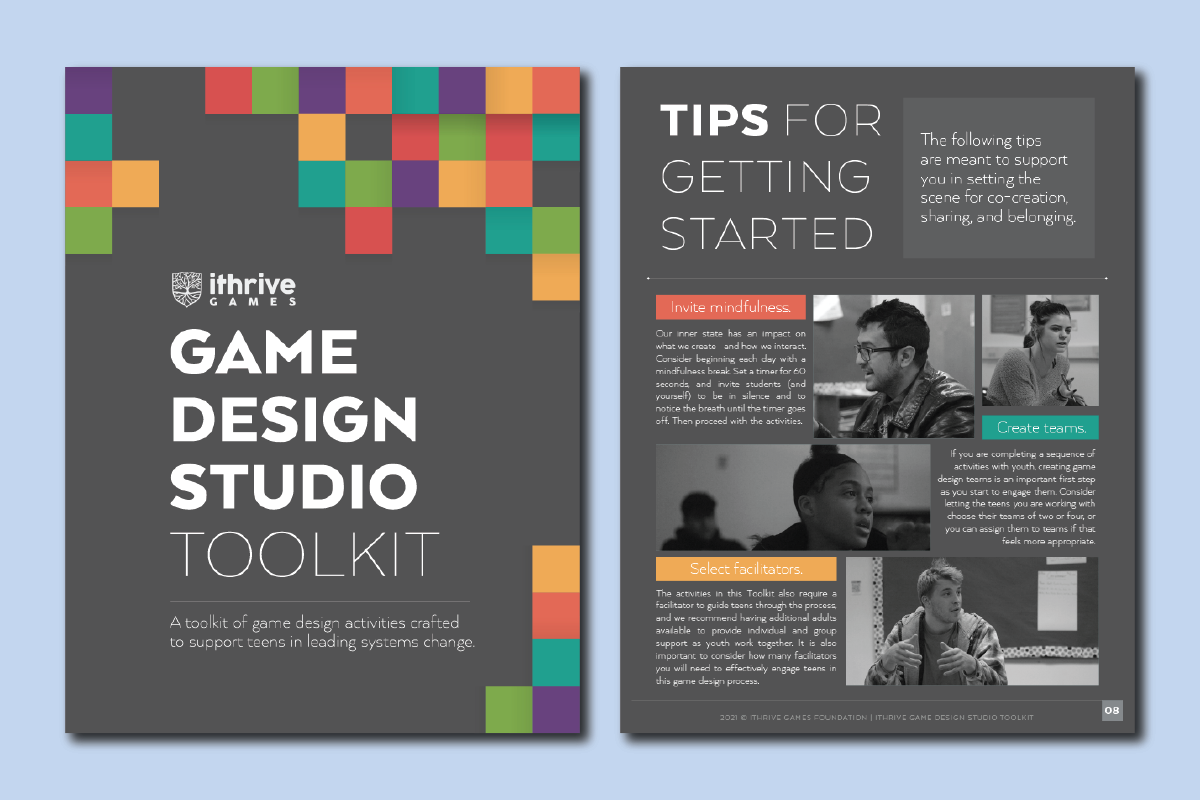
Games are microcosms of the real world, making play and game design springboards for possibility.
At iThrive, we use games to support teens in discovering new ways of doing and being. Our approach centers on their developmental needs, wielding the power of play and emotions to deepen their civic and social and emotional learning. At the core of each tool or experience we've created for and with young people is an unwavering belief in their genius and creative potential to build and imagine a better world. The Game Design Studio Toolkit, created in collaboration with EdTogether and made possible by the generous support from the DN Batten Foundation and the William T. Grant Foundation, assists them in uncovering this within themselves, using game design to reflect, connect, ideate, and lead systems change.
The Game Design Studio Toolkit features 50+ activity guides and accompanying worksheets that merge design thinking, social justice, and social and emotional learning to support teens in exploring societal issues that they experience while thinking collaboratively and creatively about how to respond to them. As teens work through these activities together and create their own games, they engage in individual and collective reflection and action as they challenge their assumptions, redefine problems, and imagine new solutions.
"These field tested activities invite teens to consider their own expertise from their lived experience as they work to understand the systems that surround them," shares Susan E. Rivers, Executive Director and Chief Scientist of iThrive Games. "The activities tap into and build skills like self-reflection and self-expression, empathy and compassion, collaboration and critical thinking as a means to unpack the rules and structures that shape relationships with parents, teachers, and other adults in the many systems teens encounter. Game design offers an amazing, engaging way to merge systems thinking, design thinking, and social and emotional learning."
An identity-safe environment is essential to help teens feel valued, accepted, seen, and welcomed. Tips and design principles found throughout the Toolkit help adult facilitators create this and set the scene for sharing and belonging—two parts integral to co-creation.
"We know that emotion is the driver in learning and in life. It is the thing on which we base our relationships and orientation to the world," says Gabrielle Schlichtmann, Executive Director and Chief Scientist of EdTogether. "With this in mind, we designed the activities in the Game Design Studio Toolkit to fully engage teens in playing games, analyzing games, and making games. The activities tap into and foster their social and emotional skills."
The social and emotional learning opportunities nested in each activity featured in the Game Design Studio Toolkit support the fostering of knowledge and attitudes across each of CASEL's five areas of social and emotional competence: self-awareness, social awareness, self-management, responsible decision-making, and relationship skills. Each activity prompts teens to nurture and exercise these essential skills in areas necessary for individual and collective well-being.
"As youth work together to design games and grapple with important issues, they are developing the necessary SEL skills to make change in their schools, communities, and beyond," shares Lora Henderson, a clinical psychologist, Assistant Professor at the James Madison University, and contributor to the Game Design Studio Toolkit. "We have grown accustomed to manualized social and emotional learning (SEL) programs that teachers implement in the classroom but game design offers a flexible and innovative approach that allows youth to use and further develop SEL skills while also engaging in activities that require both critical and systems thinking."
The Game Design Studio Toolkit invites young people to unpack complex social challenges and understand the human needs involved so they can imagine, create, and test games that prompt new solutions. Built across 5-years of inspiring collaboration with teens and adults across the US, we hope the Toolkit encourages and supports teens in creating the world they want to live in.
Download the complete Toolkit to bring it to the teens in your school, out-of-school program, museum, library, and summer camp today. And let us know how you are using it!
Youth Designers Collaborating with iThrive Games Win Serious Play Award
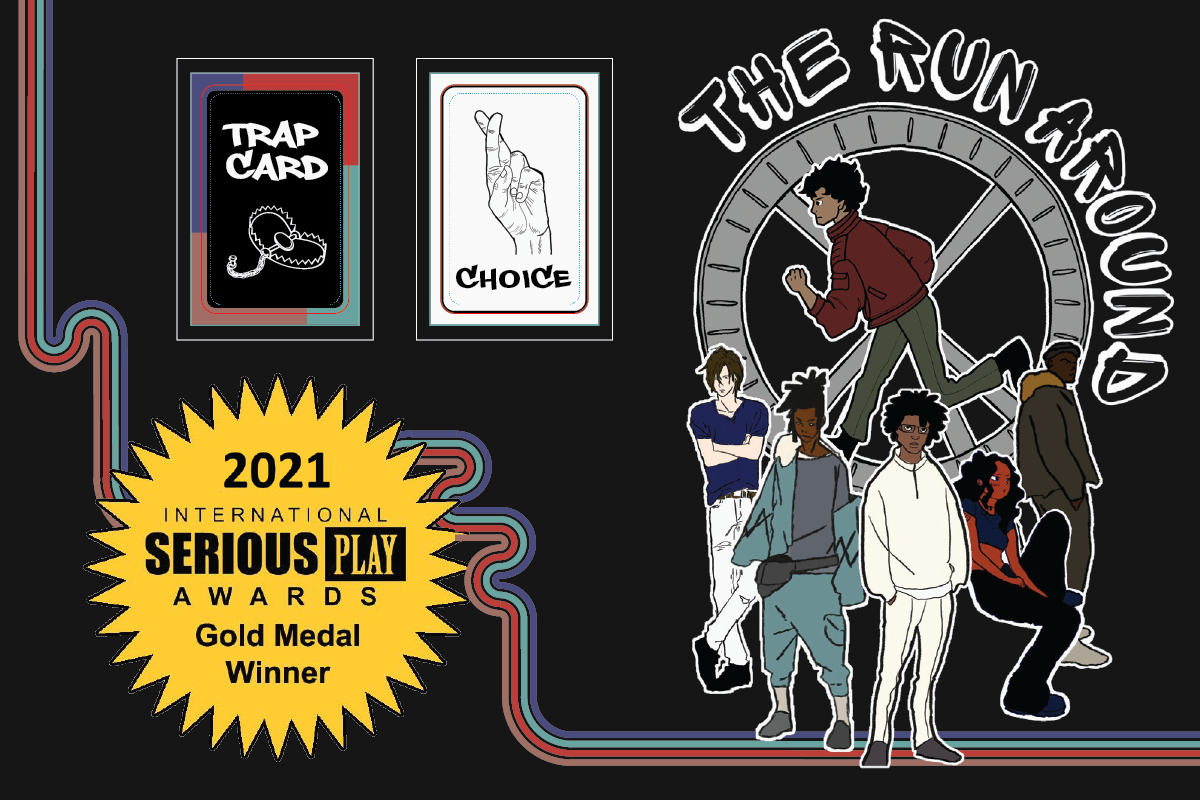
BOSTON—iThrive Games is pleased to announce that The Run Around, created by youth designers in partnership with iThrive; Janelle Ridley, Founder of Transition HOPE; AGNCY; Black Ministerial Alliance/Ten Point Coalition; and Dr. Beverley Cush Evans with Lesley University; won a gold medal in the category of Educational Tabletop Games in the 2021 International Serious Play Awards Program. The program honors outstanding commercial and student titles used for education or training.
Created from the lived experiences of the youth who designed it, The Run Around is focused on raising awareness about inequalities in the justice system. The designers sought to use their voice to shed understanding on the emotional, mental, and spiritual bondage the system creates, as they do not want others to fall into the same traps.
Staff members were inspired by the experience of working with the youth designers.
"The process of changing and dismantling unjust systems has to center the voices of those who have been impacted by it," said Susan E. Rivers, Ph.D., Executive Director and Chief Scientist at iThrive Games. "I'm proud of the youth designers who shared their stories, challenges, and triumphs and collaborated to create this game that will educate adults on their lived experiences."
The Run Around was developed to encourage empathy and change, with funding from the William T. Grant Foundation and the DN Batten Foundation. Game design and gameplay provide an opportunity to have important conversations around critical questions for designing systems that better support youth: how can systems help youth who are getting out of the justice system reintegrate successfully to stable living? How can we better understand young people's feelings, behaviors, and experiences to provide the structures, opportunities, and environments they need to thrive?
To learn more about the SEED Institute, which highlights youth designers, click here. Click here to read more information about the game design process.
###
Media Contact
Eghosa Asemota
eghosa.asemota[at]ithrivegames.org
ABOUT iTHRIVE GAMES
iThrive Games prepares teens to thrive by meeting them where they are and working in partnership towards a world where all have the voice, choice, and agency to reach their full potential. We use games and game design to equip teens with the social and emotional skills they need to be healthy and resilient.
Learn about the Power of Play at these Upcoming Conferences

2021 SERIOUS PLAY CONFERENCE
The Serious Play Conference this year features different tracks and multiple sessions with the common theme of using games or simulations in training and education. Our session on Wednesday, June 23, 2021 from 2 to 3:15pm ET will be presented by Executive Director and Chief Scientist Susan E. Rivers, Ph.D., and Senior Director of Communications Nicole Taylor. Stress Storm/New Norm: How Role-Playing Simulations Can Help will explore how role-playing simulations can be used in the workplace to assist leaders in identifying opportunities for coaching people managers and staff members.
The ability to practice social and emotional skills such as self-management, emotional awareness, social awareness, and responsible decision-making under stress is necessary for a healthy culture and optimal performance. Being able to observe how leaders perform under stress is a high-value opportunity provided by role-playing simulations. Using iThrive Sim: Lives in Balance, Susan and Nicole will share how a role-playing simulation can be used both to observe stress behaviors, assist people managers in identifying and working with their stress response, and provide opportunities for coaching to improve how staff members manage themselves and others. If this lights you up, register here.
2021 ASCD CONFERENCE: EMPOWERED AND CONNECTED
The theme for this year's ASCD conference is Empowered and Connected. The annual conference is full of sessions that will accelerate your summer learning plans and help get you prepared for the school year. At our session, Susan Rivers will be joined by educators Paul Darvasi and Mira Cohen to present Play to Thrive: A Game-Based Approach to Social and Emotional Learning for High Schools. If you're heading to ASCD, this session will allow you to:
- Walk away with free, classroom-ready game-based social and emotional curriculum and tools to use immediately for in-person and distance high school humanities courses.
- Understand how game-based learning approaches align with teens' specific developmental, social, and emotional needs.
- Discover a roadmap for infusing core curriculum with playful, tech-supported interaction for high school students' social and emotional growth.
Sound useful for your classroom? Register for ASCD Empowered and Connected.
COALITION FOR JUVENILE JUSTICE (CJJ) 2021 ANNUAL CONFERENCE
The Coalition for Juvenile Justice (CJJ) is a nationwide coalition of State Advisory Groups (SAGs) and allies dedicated to preventing children and youth from becoming involved in the courts and upholding the highest standards of care when youth enter the juvenile justice system. At CJJ's 2021 virtual annual conference, iThrive's Susan Rivers, Transition HOPE's Janelle Ridley and iThrive youth designer Bernardo S. will be sharing a session on Friday, June 11th from 10 to 11:30am ET entitled "Designing Games with Youth Experts to Dismantle Unjust Systems." They'll share the story of youth game designers who created a game called The Run Around to delineate their lived experiences in the juvenile justice system and advocate for changes to it. They'll also share how decision-makers can bolster supports for the well-being of incarcerated youth. You can register for this event here.
MORE WAYS TO CONNECT
Next month, we'll share the conferences iThrive is presenting at for the remainder of the summer. There are many ways to engage with us, and we look forward to connecting with you.
Exploring Juvenile Justice and Mental Health with Teen Game Designers (Part 2)
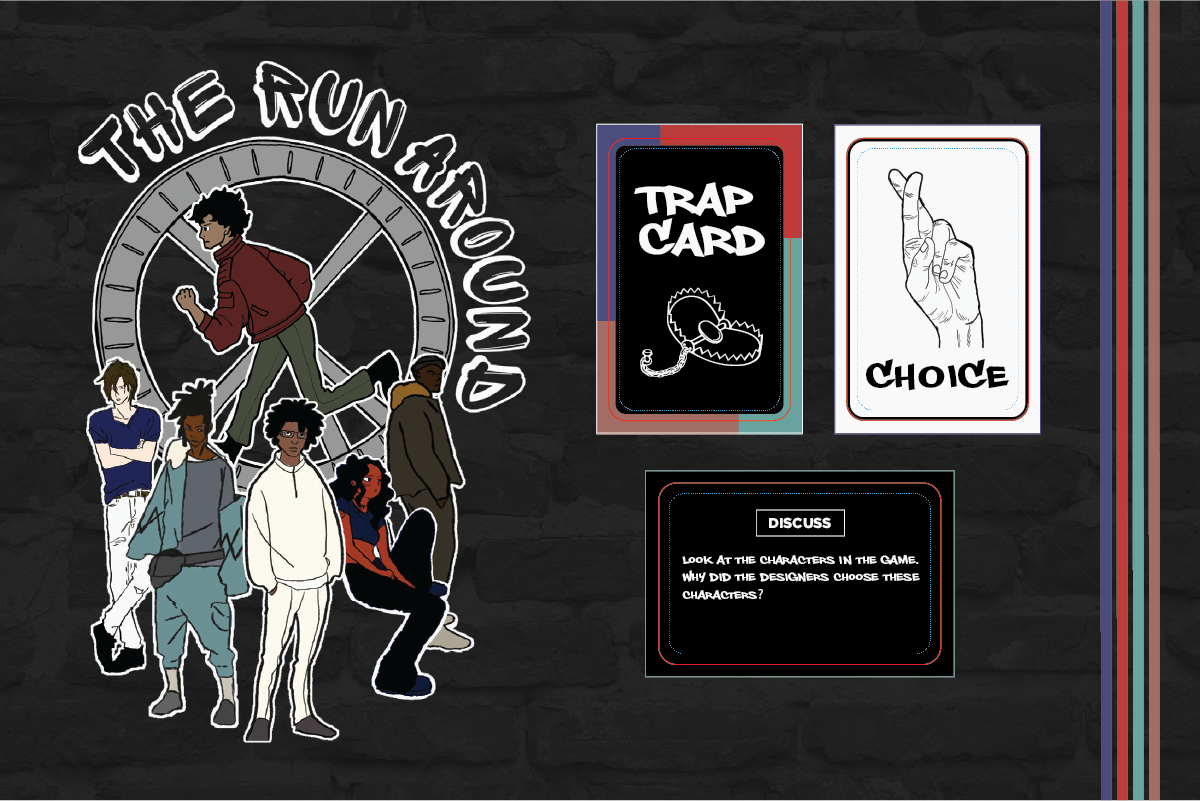
Part 1 of this series includes an overview of iThrive's Juvenile Justice System project and the framework for the Game Design Studio program. Click here to read Part 1.
It's called The Run Around. The goal of the board game is to be the first player to move all of your game pieces out of Maximum Security prison to Home. It's hard. It's frustrating. There are tons of setbacks. And it reflects the experiences of the youth designers who made it. The creative act, in the game design process, is part of how the designers cope with their experiences.
‟We tried to shape the game the way the justice system is," said K.C., one of the designers of The Run Around. ‟And we tried to base our directions and rules on what would happen in real life. One of them was like, when we are on parole or talk to our case worker, any little thing can get us put back into the predicament that we were in before. So we made the rules and regulations in the game to show that. It was to show how hard it is for you to get out."
While the subject matter was intense, K.C. found the design process enjoyable.
‟It was so fun," she said. ‟It was fun to see the finished product. It was fun making the rules and seeing other people get frustrated playing it [because our experience in the system is just as frustrating]. It was like when we were making the game, we were making it so people would get irritated because they wouldn't be able to win. And then seeing that they really did get mad. It was fun watching it become what it is now."
Another game designer was lit up by the aesthetic of the game.
‟I like the graphic designs of what we created," said R.D. "I like the clothes they have on. It looks very much like society right now."

K.C. agreed, saying, ‟They each have their own individuality."
Players advance their character through the game via the Choice cards. The Choice deck is stacked though. Only a few of the cards will actually allow you to leave prison. But watch out for traps! Landing on a Trap spot—and there are many—will cause you to move backward, lose a turn, or be sent back to prison.
R.D. sees the toughness of the game as a key design choice to add realism.
‟For guys who have been in jail, I feel like they can relate to it," he said. ‟A lot of stuff said in the scenarios in the game...it's realistic."
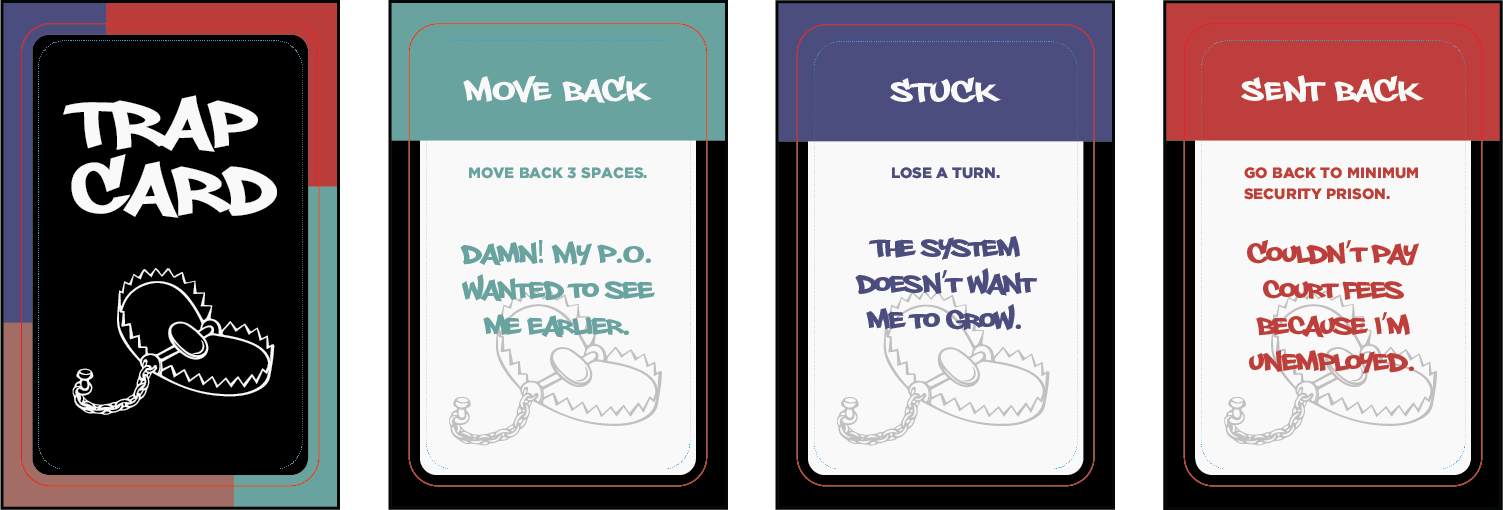
The game designers put a lot of intentionality into the design of the six characters, named Naomi, Marven, Jay, James, Ty, and Ace.
‟I created Marven," said M.A. "I relate a lot to Marven because my charge was similar. He gets caught up with friends and drugs and has to go to trial. People rat each other out."
For M.A, it wasn't just the circumstances that he channeled into the game. It was also the emotions.
‟The same thing with depression and anxiety happened to me while I was waiting for trial," he said.
And the final step of the game design process, which is to act, is set to happen over the next few months. The game designers will use The Run Around in workshops they are both designing and facilitating for stakeholders from the juvenile justice system in Boston beginning in May. They are also set to share their experiences at Games For Change this June. They are hoping that by sharing their experiences, decision makers can begin to create better support for youth who are system involved.

‟Anyone who goes through this has these feelings and the fact that it's a person of color doesn't make it any better," said M.A.
Exploring Juvenile Justice and Mental Health with Teen Game Designers (Part 1)
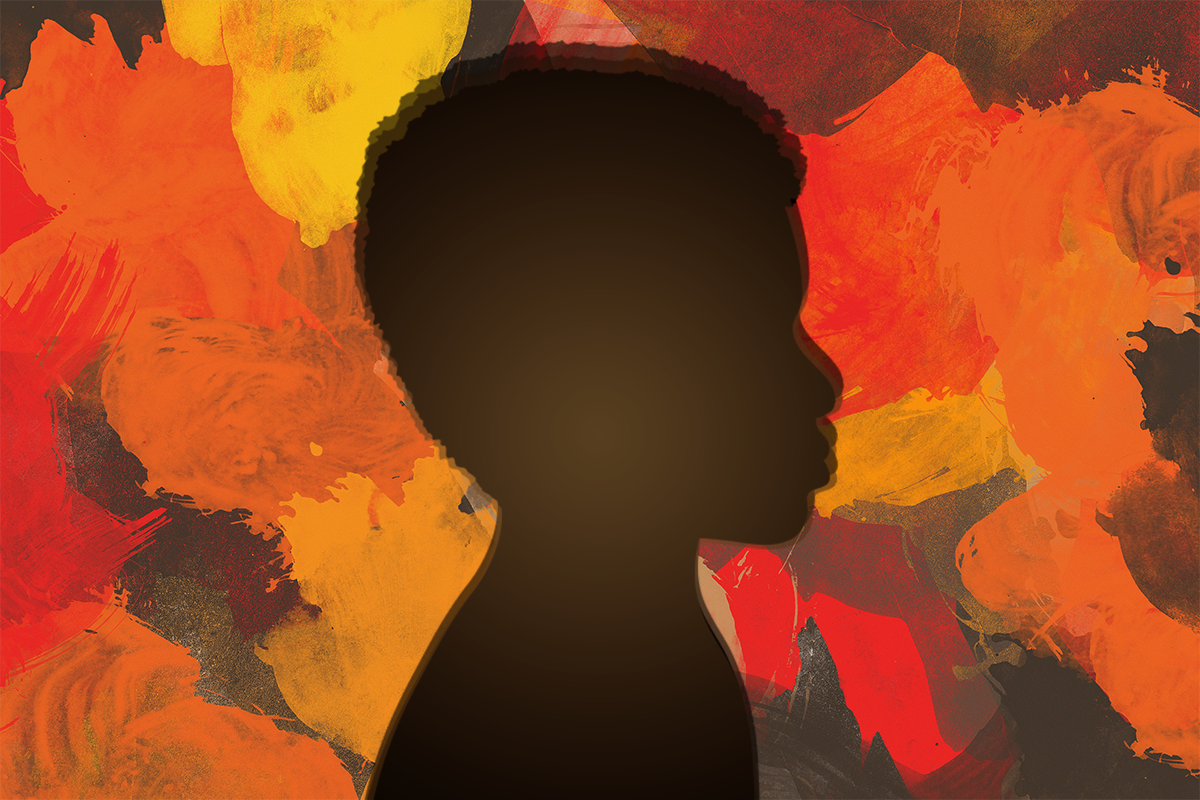
Since 2019, iThrive Games has been collaborating with partners to use games and game design to highlight the voices of Black youth involved with the juvenile justice system. Inequity in the provision of mental health services on the basis of race before, during, and after system involvement negatively impacts the health, well-being, employment opportunities, educational attainment, and relationships of individuals of color. Youth in our program use game design techniques to express their lived experiences with the justice system. They use the games they design to engage stakeholders in conversations about the inequities within the system and to identify how the systems could be improved to better meet the mental health needs of other young people who are subjected to the cradle-to-prison pipeline.
The current cohort of youth hails from Boston. The participants have been system involved at some point of their lives and now have a round of game development under their belts. For the purposes of this article, we'll use initials for the names of the participants.
These youth designers enhanced and completed a game called The Run Around, which was initially prototyped by an earlier cohort. The Run Around board game helps youth-serving adults and stakeholders understand how youth feel and explore opportunities to improve services and experiences for youth. The gameplay provides an opportunity to have important conversations around critical questions for supporting youth: how can we help youth who are getting out of the system reintegrate successfully to stable living? How can we better understand the feelings and behaviors young people grapple with to provide the support they need before being swept into the system, and while in the system?
The youth designers created this game using iThrive's "Surfacing-Coping-Acting" co-design cycle. The goal of this approach is to invite teens to raise up (surface) and work productively (cope and act) with the experiences that make adolescence both an incredible and vulnerable developmental stage.
"Social and emotional learning happens in community," said Susan Rivers, Executive Director and Chief Scientist of iThrive Games. "Belonging is key to our sense of wellbeing-especially so for teens as their brains continue to develop. Our co-design process not only supports well-being of the youth designers at this moment, but it also allows them to pay it forward by suggesting wellbeing supports for other youth who are involved with the system."
In the surfacing part of the design cycle, the youth designers shared some of the experiences they had when they were involved with the system. By sharing their experiences with each other, they validated one another's experiences and did the healing work listening and being listened to. Sharing difficult stories with others is one proven way to manage the discomfort and to challenge any fears that we're different or alone in our struggles.
K.C. shared what she thought was most important for people to understand about her experience.
"...It isn't easy at all. And we do go through struggles that we need help with," she said. "The world needs to know that the minority community goes through. It's sad that a lot of people in the world don't understand how messed up the justice system or school system is for minorities in the US today."
M.A. found that using his experience to design a game reinforced something he felt he already knew.
"It wasn't a surprise but when I saw it being implemented in the game, I thought, oh, that's dope," he said. "The only white character in the game starts off in minimum security. That was an insight...because he's white he goes in minimum not maximum."
"Game design has the power to help youth understand the systems that impact their lives," said Janelle Ridley, Founder of Transition HOPE. "In community, by sharing experiences and reflecting together, they can move toward how best to use their own agency to impact those systems."
The act of sharing and creating together offered an opportunity for social and emotional learning for the game designers.
"I knew it took a lot to make a game," said M.A. "It takes more than a lot. It takes everybody. Everyone brings a different skill. It takes a lot of teamwork. That's what I took away from the experience."
Part 2 of this series will explore the creation of the game and plans to share it with stakeholders.
2020 Annual Report: A Year of Play, Co-Creation, and Community
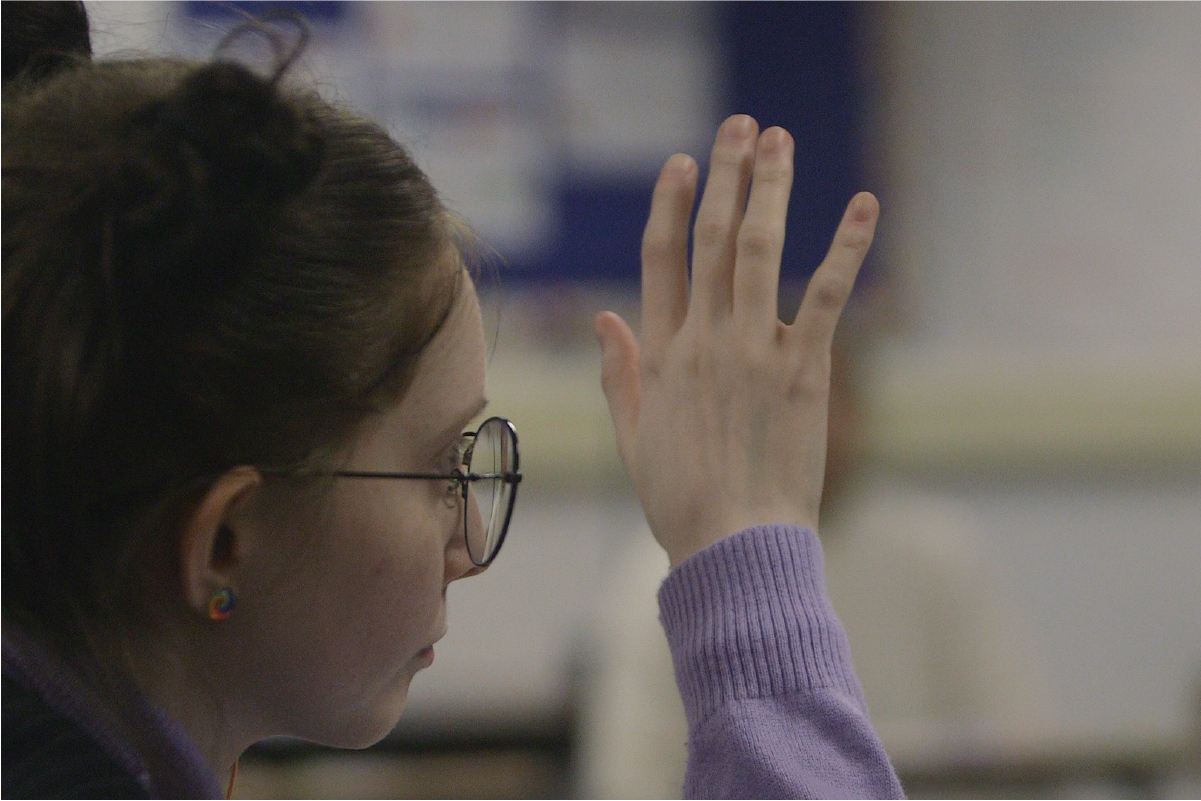
The strands of iThrive's DNA are composed of understanding the power of play. Social and emotional learning. Belonging and engagement in the spaces where teens are. Being teen and educator-centered.
Thank you to each of the teachers, teens, and collaborators who share those same building blocks at their core. Here are our highlights from last year:
- We appreciate the 120 of you who downloaded iThrive Curriculum: Sam's Journey and/or iThrive Curriculum: Museum of Me.
- Shout out to the over 400 teens who playtested iThrive Sim: Lives in Balance.
- High five to the teachers who completed over 90 play sessions of iThrive Sim in their classrooms.
- Game developer friends, we see you. Thanks for downloading our game design kits over 250 times last year.
- Parents and other adults, we appreciate your interest in our game guides, which you downloaded over 130 times.
For more information on how we are working to further our mission of using games and game design to equip teens with the social and emotional skills they need to be healthy and resilient, the tools that support and protect their mental health and well-being, and the systems thinking they need to recognize inequity along with meaningful opportunities to imagine and design a better world, view our annual report.
Urban Assembly Students Create COVID-19 Choose-Your-Own-Adventure Story
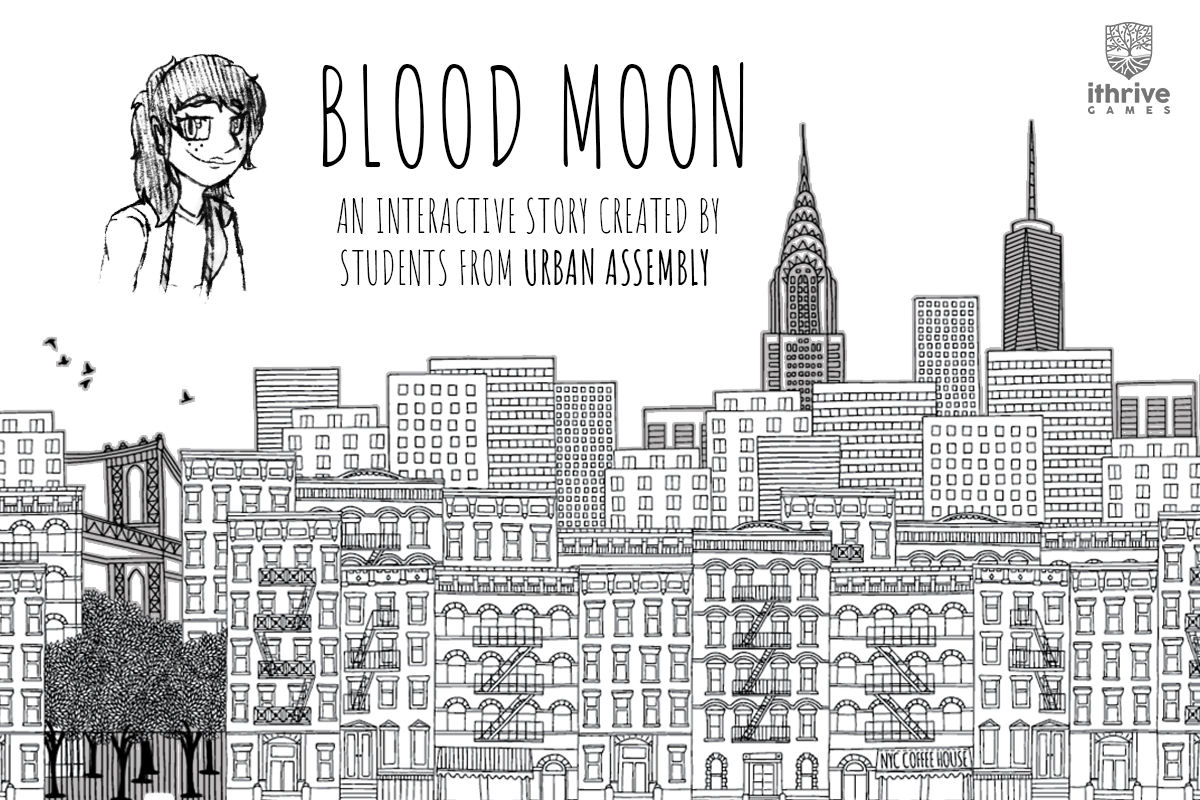
This spring, a cohort of high school students from Urban Assembly joined iThrive staff online for a design thinking and social and emotional learning co-design experience. The virtual Game Design Studio engaged teens in self-reflection, creativity, and systems thinking using the framework of game design. Over the course of six sessions, the students brainstormed ideas for a game that would share the perspective of teens living through the COVID-19 pandemic.
The end result was an interactive story game called Blood Moon. Choose your own adventure and play the game here. The main character is Brooklyn teen Artemis, who wakes up from a long nap during the COVID-19 shelter-in-place orders. Her parents, hospital workers across town in Manhattan, should have returned from their shift by now. Where are they? Artemis must strike out of quarantine and into the streets of New York in search of her parents. Along the way she encounters helpers on her journey, runs into trouble both with the law and the locals, and even meets a super-sleuth delivery dog named Issac who won't leave her side until she is safely reunited with her family.
In order to track down her missing parents she will have to use all the tools in her social and emotional toolbox—she'll need self-management and self-awareness to keep herself strong, while her social awareness, relationship skills, and responsible decision-making will help her make connections and collaborate to solve the mystery.
Art Imitates Life
Early on in the development of this interactive story, the students wanted to create characters that reflected their world. There's Artemis, Ari for short, brave, and bold like the hunter for which she is named. This young Latinx powerhouse has a huge heart and the power of empathy, turning connections into relationships when she can, and setting healthy boundaries when she needs to.
Ari meets Issac, a dog just as scrappy as she is. As a delivery dog for DoggoPrime, Issac knows how to get around the city, and he has a few tricks—and treats—tucked away in his knapsack to keep himself and Artemis on the trail of finding a family. He might just find a new family, too.
There's also Apollo, Ari's brother, who is the leader of the pack in their neighborhood and is just as bold as his sister. But while Ari looks for Mom and Dad, Apollo has a different journey to keep the city safe. He'll just have to keep everyone from thinking he is on the wrong side, including his sister Ari and that little mutt following her everywhere.
Other characters featured in the interactive story include Frank, the owner of a hot dog kiosk near the train station, who has seen it all, and knows Ari and Apollo are in more trouble than they know; Laura, Frank's sister, who is a master procurer who may or may not be able to help Ari find her parents but doesn't intend to stop trying; Captain Max, an officer who is here to make sure everyone shelters in place, but is starting to wonder if he is on the right side, or if he is quarantined from the truth; and Timmy, who lost his mind to COVID, is looking for family, and believes that helping Ari find her parents can help him back to himself.
Game Mechanics
Blood Moon is a branching narrative Twine game that can be played alone or with a group. The Urban Assembly students, who met via Zoom, wanted to create a game that teens could play by reading the interactive story together in Twine and then talking through the best ways for Artemis to make her way across the city by drawing on her social and emotional skills.
Students can debate Artemis' choices, and think about the ways that they use social and emotional skills in their own lives with friends and family. Blood Moon is text based and includes prompts for discussion, asking young people to talk about each of the social and emotional skills and learning.
Social and Emotional Learning
The interactive story applies social and emotional skills to the troubles teens face maintaining relationships during COVID, navigating family ties in stressful times, and managing the social upheaval of this year. Talking together provides teens with space to learn together and to practice the tools that will help save Artemis. In practicing those tools, the social and emotional skills are there for them when the game is over.
Visit the For Teens, By Teens page of our website to check out this interactive story game and other games created during iThrive's game design sessions with teens.
This work was supported through generous funding from the William T. Grant Foundation and the D.N. Batten Foundation.
Virtual iThrive Game Design Studio Melds Design Thinking and SEL
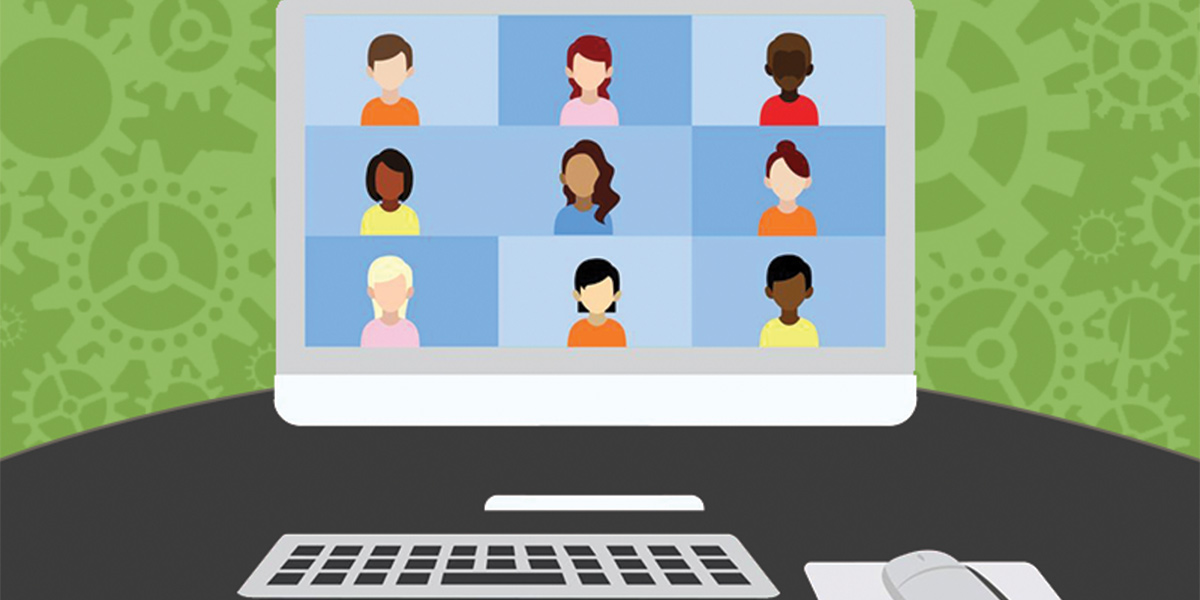
iThrive Games Foundation and Urban Assembly Partner to Create Online Teen Makerspace
FOR RELEASE — May 7, 2020
A cohort of students from Urban Assembly is joining iThrive Games Foundation staff online for a design-thinking and social and emotional learning co-design experience. The virtual Game Design Studio engages teens in self-reflection, creativity, and systems thinking using the framework of game design.
Beginning on May 8th, the students will collaborate with iThrive staff on six sessions over the course of two weeks to round out the school year. Discussion and gameplay will create a space for iThrive to share, connect with, and learn from teens. Using iThrive's co-design model for engaging with youth, the group will work together to find ways to help teens think and talk about life during the COVID-19 pandemic. Teens from schools focused on design, math, and media will use the varied skills and design-thinking processes that they have learned in their academic coursework to build a game for their peers that addresses heightened social and emotional issues teens are facing.
Susan Rivers, Ph.D., executive director and chief scientist of iThrive Games Foundation said the idea began with the question of how to engage with teens in support of navigating these Covid-19 times.
"We know that designing with teens is the best way to design for teens," she said. "Collaborating with students at the Urban Assembly creates opportunities for us to learn with and from them informing the development of tools that support the social and emotional needs of teens across the country. No one knows teens' needs better than teens themselves."
David Adams, Director of Social and Emotional Learning for Urban Assembly, saw the mixture of SEL and game design as a fit for students at his schools.
"Across the country, it has become evident that experiences that build problem-solving, collaboration, and communication skills are essential preparation for our youth to tackle society's most pressing issues," he said. "I am grateful that our students will contribute to the wellbeing of others through this collaboration with the iThrive Games Foundation."
iThrive's Senior Director of Organizational Strategy, Susan X. Jane, and Teen Engagement Manager, Tabia Batts, are ready to meet the moment by taking the Game Design Studio online.
"We know these times are challenging, but that doesn't mean that we must abandon play," said Jane. "Games create spaces for thinking, reflecting, and becoming—something teens need now more than ever."
Additional updates about the collaboration will be shared on Twitter, Facebook, and LinkedIn.
About iThrive Games Foundation
iThrive Games Foundation prepares teens to thrive by meeting them where they are and working in partnership towards a world where all have the voice, choice, and agency to reach their full potential. We use games and game design to equip teens with the social and emotional skills they need to be healthy and resilient, tools to support and protect their mental health and well-being, systems thinking they need to recognize inequity, and meaningful opportunities to imagine and design a better world.
Media Contact:
Nicole Taylor
Senior Director of Communications
nicole.taylor[at]ithrivegames.org
This work was supported through generous funding from the William T. Grant Foundation and the D.N. Batten Foundation.
Atlanta Teens Use Game Design Studio to Explore Injustice in Schools
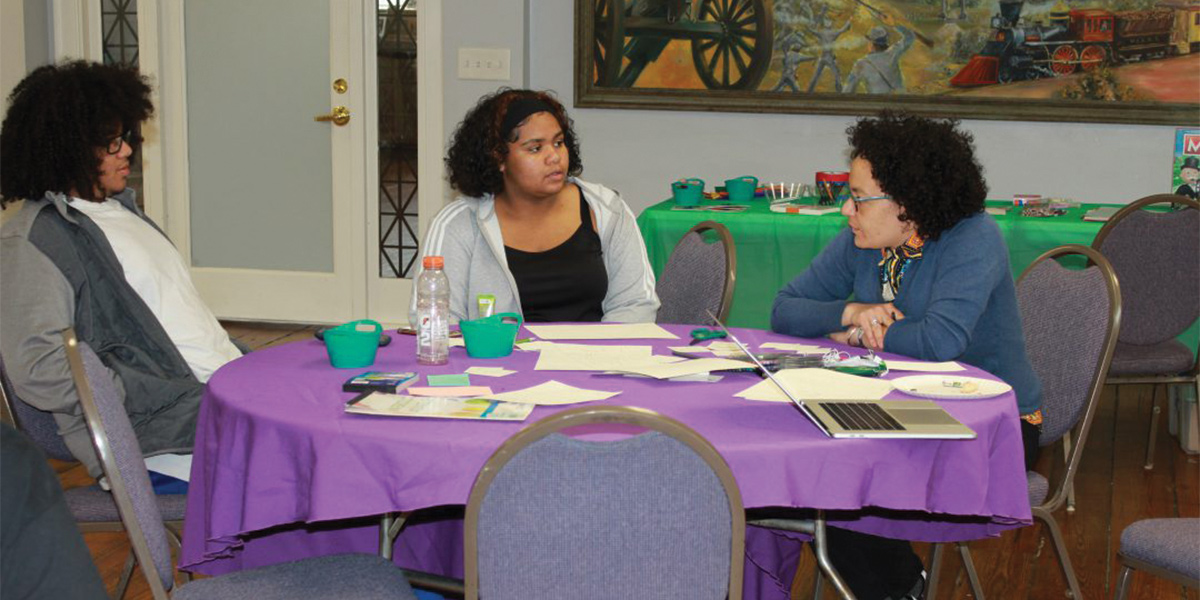
In February, iThrive Games partnered with Stronger Together, a Georgia-based coalition of youth and adults committed to racial justice in Atlanta schools, to offer Game Design Studio with the support of the Marietta Museum of History.
Black students still report facing shocking levels of discrimination at school, and games provide a unique framework for teens to break down why it happens, express what it means to them, and invite adults to interact in a new way with reflections about how teens need to be supported.
Eight Black middle and high school students who attend Atlanta schools came together at the museum for three days over their winter break to design games that would offer a window into their perspectives on the injustice that impacts them on a daily basis.
Tracing Experiences in Atlanta Schools: Surfacing, Coping, Acting
Each instance of Game Design Studio uses a "Surfacing-Coping-Acting" co-design cycle. The goal of this approach is to invite teens to raise up (surface) and work productively (cope and act) with the experiences that make adolescence both an incredible and vulnerable developmental stage. In this particular Game Design Studio, here's how these components played out.
Surfacing
Teens were joined on the first day of the workshop by elders in the community for an intergenerational conversation to explore and observe how race and racism have manifested in the local region across eras, from segregated Atlanta schools to hate speech on Twitter.
Teens further explored the history of race and racism in their region through a gallery walk featuring a special museum exhibit highlighting photographs of important moments in Marietta's Black residents' history.
As teens surfaced the ways that race and racism manifested in their community over time and in Atlanta schools, iThrive facilitators led a brainstorming session around the prompt, "What do your teachers need to know about race and racism?" From there, teens collectively settled on three themes to inspire the design of their games, each relating to what they'd like to see in Atlanta schools:
- Race should be taught in-depth
- The voices of Black teens need to be heard
- Power: who has it, and who gets hurt?
Coping
Game Design Studio offers a way for teens to connect through play as a vehicle for reaching deeper social connection, understanding, and self-awareness. Telling our difficult stories to others is one proven way to manage the discomfort and to challenge any fears that we're weird, different, or alone in our struggles.
As teens described their experiences with racism, listened to one another, and played games together like Jenga and The Mind, they bonded over common threads in their stories, learned about and drew parallels between game mechanics and real-life interactions, formed working teams with friends old and new, and got ready to create their own designs.
Acting
The power of Game Design Studio is that it's not just about discussing issues teens face, it's about working through those challenges creatively with other people; something that is never wholly without tension.
As the teens played together and collaborated on games in teams, they inevitably encountered and worked through conflict in ways that helped them to identify their own and others' strengths and capacity for resilience.
In this Studio session, teens had, and seized, opportunities to advocate for themselves, to disagree, to compromise, and to make amends; all social and emotional skills that underpin success and well-being in the long-term.
Here's what teens made:
The Society Game
This delightfully complex game about power in our society has players vying for a coveted spot at the top of the pyramid, reserved for "the elite." But getting there is nearly impossible, and losing status is easy to do.
Black Trivia
Two teams made games that honor teens' insight that Black history and culture need to be integrated meaningfully into the fabric of the schools that serve them. In Black Trivia, answer a question about an illustrious figure in the Black community correctly to move ahead and claim your reward: more trivia tidbits! In The Matching Game, test your knowledge of famous Black figures and challenge your memory as you strive to match over 50 notable people with their achievements.
Even & Odd
This game has two paths to the finish, but they're far from equal. Roll an even number and you start out on the track where resources come easily and penalties are light; roll an odd number and your "luck" looks very different. Prepare to get passed over for a job interview for which you were qualified or evicted from your apartment. But just as you're getting used to your privilege, or lack thereof, you might draw the card that forces you to switch tracks. What does life look like from this new point of view?
Learning Together
Designing with teens in Game Design Studio enriches all who participate, teens and facilitators alike. We as adults show up prepared to listen and to offer what we know about why things are the way they are, and we work alongside teens as their reflections and interactions spark new ways of thinking about and coping with the challenges they face. Making games together is a powerful and creative way for teens to exercise and refine social and emotional skills while concretizing their unique experiences, and we are lucky to be in partnership with teens in this generative space.
Stronger Together will highlight the games created during this Game Design Studio at an upcoming community celebration, also to be held at the Marietta Museum of History.
Expanding the Power of Play with Game Design Studio
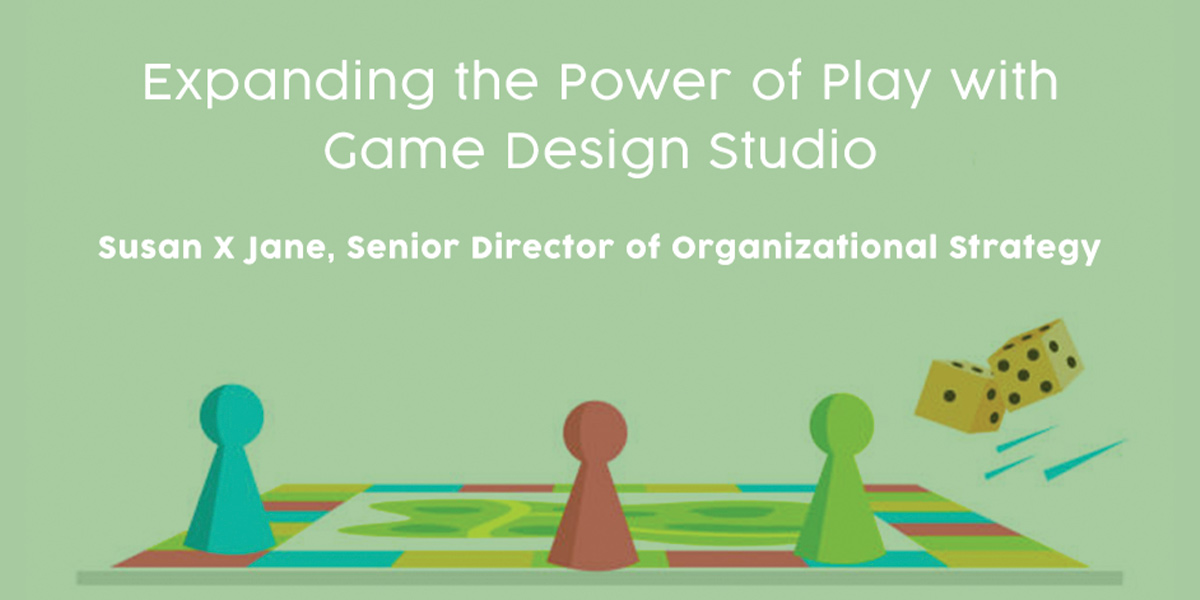
This article is the last in a series of posts that explore iThrive's Game Design Studio approach, which staff will be sharing in a presentation called Teens as Changemakers at SXSW EDU on March 9th. You can read the first article here and the second one here.
Play is a serious business: we know that games are a rich space for learning about the world and developing skills. From counting and puzzle games to strategy and dexterity, games provide lots of opportunities for player transformation. But what if we could use games to transform whole communities? That's what we've been working on at iThrive Games Foundation, with our Game Design Studios. Our two-week game design camps, hosted in local communities with youth in classrooms, camps, and youth programs, seeks to expand the power of play by applying game design to social issues.
Of course, playing games can help us learn about systems—think Monopoly or the Game of Life. Game Design Studios challenge youth to go beyond making models of systems they know to transform the player through the experience of the game. Game design can open up space for dialogue, exploration, and empathetic listening, connecting teens to each other, and to adults that care about them, playing together to find understanding and brainstorm solutions.
We know games create experiential space to explore, test, try, fail, and learn together. We also know teens care deeply about the issues they face in their communities. Game Design Studios combine a supportive space where teens examine the issues they face with play and design—tools to help them bring their experiences to others. During Game Design Studios, teens share personal experiences through facilitated dialogue, learn about game mechanics, and of course play lots of different kinds of games. Groups produce game prototypes and share what they have created with their peers and community stakeholders, shaping a shared space for dialogue, spurring important conversations about the lives of youth, and generating solutions to issues youth face.
Youth feel the effects of the unequal system on their life—the education system, justice system, and the economy all have a profound effect on shaping the lives of teens, particularly those in marginalized communities. Power can feel like an abstract concept to teens, but games make power visible and playable. Teens can use game mechanics to see how rules, win states, and world-building shapes the world of the game, as well as the world they live in.
At a recent Game Design Studio hosted in Marietta, GA, teens created a board game based on class structure, playing for the power of upward mobility. Players were eager to move to the top, but challenge cards kept players back with health care costs, student loan debt, and job losses. Designing the game, getting the information on the privilege and perils of class in America, and playing together make exploring the abstract easier, bringing power to life with a spin of the wheel.
Games create experiences to engage community in empathetic immersion. Youth game designers learn to balance player agency and uncontrollable constraints to shape the emotions of the player and help others tap into their experiences. At a Game Design Studio in Boston, teens shared their experiences with entry after contact with juvenile justice social service systems. They created a re-skinned version of Sorry called The Runaround, complete with parole violations, family setbacks, and missed fines. The game is frustrating to play: as soon as you get some pieces out you find yourself sliding back to the start. Players feel the stress, sadness, and frustration teens feel trying to get home and stay home. Though the game rarely has a winner, players have a chance to talk about how the systems designed to serve youth can better meet their needs. Adults take the experience of playing The Runaround with them when they return to institutions and agencies positioned to make a difference in services to support teens.
Game Design Studio creates important spaces for learning and growth, lessons that should be shared with teen communities. The encounters end with game showcases, inviting administrators and teachers, social workers and principals to play the games the teens have designed, and talk with teens about how to make the community one where teens have a seat at the table on issues that affect them. Teens have a chance to also learn from each other, exploring their peers' prototypes and sharing feedback and learning with each other. Long after the Game Design Studio is over, teens and adults can continue to dialogue about the issues that matter to them, playing and working together to help teens thrive.
This work was supported through generous funding from the William T. Grant Foundation and the D.N. Batten Foundation.
Game Design with the Next Generation of Changemakers
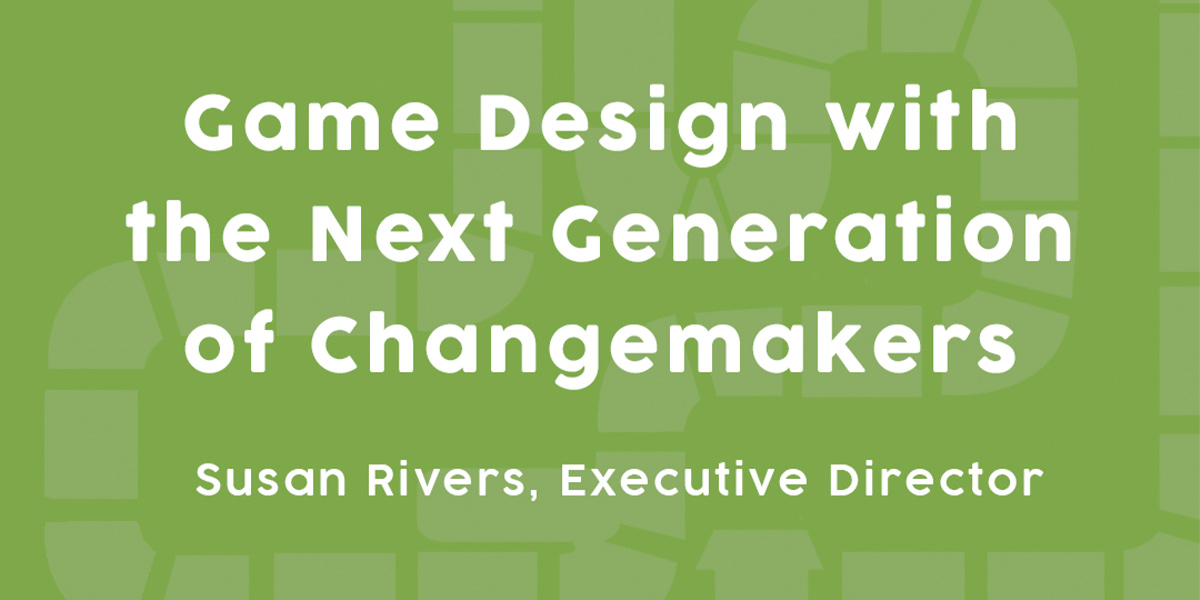
This article is the second in a series of posts that explore iThrive's Game Design Studio and our youth positive development approach, which staff will be sharing more about in a presentation called Teens as Changemakers at SXSW EDU on March 9th. You can read the first article here.
Teens' brains are undergoing the last major restructuring of development, one nearly on par with the brain growth of early childhood. That means the environments and interactions teens experience—good and bad alike—leave a deeper mark on the brain than they will in later years. At SXSW Edu next month, we'll be sharing our method of creating transformative environments.
Empowering teens as changemakers means engaging youth and communities in drawing on the past and present to create new knowledge. This positions teens not merely as end-users or consumers of programs, but as creators both of knowledge and action steps to begin the work of building healthy, equitable, and sustainable communities.
Game Design Studio is a co-design experience that furthers youth as creators of knowledge, individuals who have a real ability to contribute to meaning-making and surfacing of solutions. Teens who work in codesign on curricula, projects, games, and other products will help to shape the understanding of teens for their peers, teachers, educators, parents, and policymakers.
Positive Youth Development Approach
Game Design Studio is a positive youth development approach. Rather than focusing on what teens lack in their lives or community, positive youth development sees all teens as having the potential to make a meaningful contribution to society. In Game Design Studios, we create experiences and environments where:
- Youth contribute to knowledge creation and practice skills in substantive activities.
- Youth voice and youth agency are respected and encouraged, and
- Youth are authentically valued as creators and end-users, their contributions are critical in program development and execution.
Game Design Studio is one way that we integrate youth voice in our organization and beyond. Across activities, gameplay, and being present and in relationship with young people, we develop knowledge in partnership with them.
Structure and Experience
Designing games—like making a painting, composing a song, or writing a poem—is an act of self-expression. Unique to game design is designing a system with rules, roles, ways of progressing, and win and loss states. We use game design as a way to engage youth in thinking about their lived experience, how they think about and understand the world, and what they might like to be different in their world and how they would go about making that change. Synthesizing their imagined change into a structured game that others can experience supports youth designers in thinking concretely about the specifics of the change.
Through various structured and open-ended activities, we explore questions such as: How do you feel in the current state (your lived experience) and how would you like to feel instead? What would need to change about the rules, roles, ways of progressing, and win and loss states in your own life to feel that way you want to feel, as opposed to the way you do feel?
Changes that youth designers have imagined and designed games around have included:
- Being in a mutually respectful relationship with another adult (instead of one where they are expected to respect adults but adults are not respectful in return),
- Getting more sleep at night by having a room that is quiet and a mind that is not racing with the worries of the day (instead of suffering intrusions of sound and thoughts throughout the night), and
- Having conversations about someone dying and what grief feels like (instead of adults ignoring or being largely silent when someone close dies).
We believe this process lays a foundation to support social change, and it includes guiding teens in critical reflection to build hope and self-efficacy related to the possibility of system change. Teens think about and explore through gameplay and game design techniques the design of systems that impact their lives, the interpersonal and sociopolitical processes that perpetuate those systems, and the leverage points that have the potential to change interactions and processes for the better. This serves to prime youth to see their potential as change agents in the communities to which they belong. It can also support their integration of individual-level and community-level empowerment by informing those in power about helpful actions they could take to improve interactions with and experiences for disenfranchised teens.
At SXSW Edu 2020, we can't wait to highlight how making and sharing self-expressive creations can lead to positive change, first internally (within the teens' own minds by supporting identity formation, positive self-regard, and advocacy skills) and, ultimately and ideally, externally (longer-term, by informing those already in power in the systems that affect teens about how teens are experiencing those systems). We hope to see you there!
Teen Perspectives on Sleep and Social Media: What Research (and Game Design) Reveals

A recent study in Sleep Health: Journal of the National Sleep Foundation found that teens use social media despite sleep costs for two main reasons: Fear of missing out, and norms and expectations.
Researchers invited 24 teens ages 11 to 17 to participate in focus groups, answering questions related to their social media habits around bedtime, their motivations for engaging with social media, and their perspective on how it impacted their sleep.
When it comes to fear of missing out, the participants share that not being involved in interactions online has social costs in the real world. They worry about being left out of conversations, and seeking to assuage that worry motivates them to engage with social media at bedtime.
Norms and expectations are also key drivers. Participants share that being active on social media is part of being a normal teenager, and that quick responses are expected. For them, this leads to continued engagement, even when fatigued.
At iThrive Games Foundation, we have also explored teen behaviors around sleep. Last fall, staff held a Game Design Studio at Madison Park Technical Vocational High School in Boston, engaging with a class of teens there to create games related to their pressing concerns. Sleep was one of the issues that the teens surfaced during the design session.
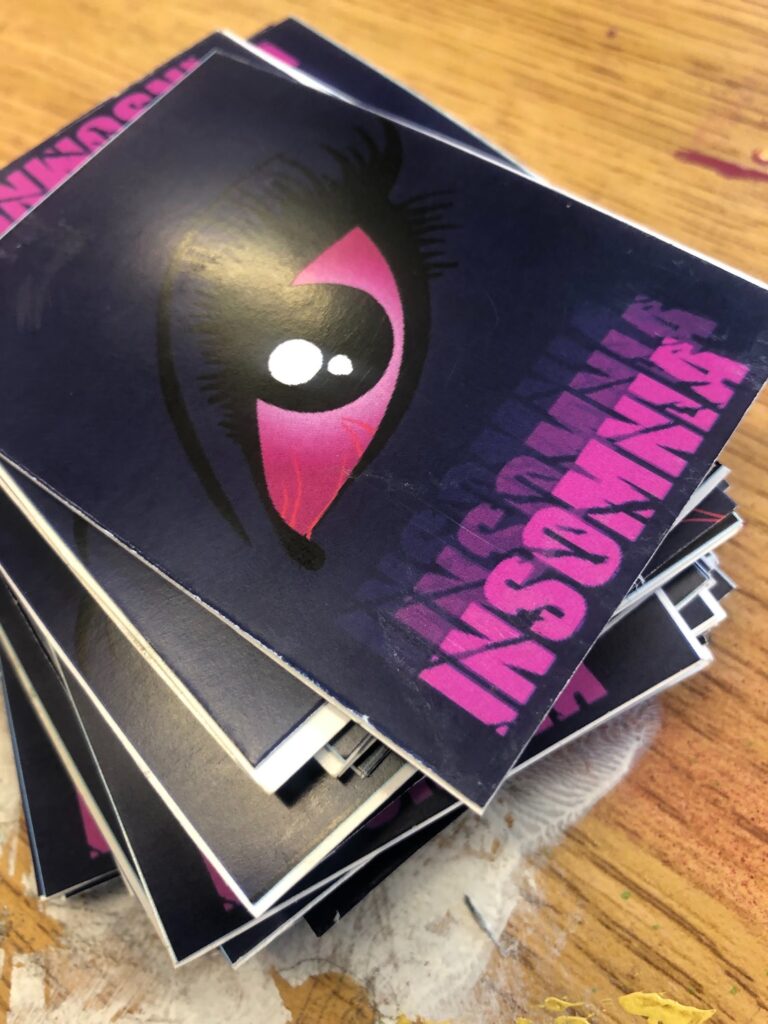
Materials from Insomnia, a fast-paced card game related to teen sleep patterns created by teens at Madison Park Technical Vocational High School in Boston, MA.
Youth shared factors that thwart their ability to get to sleep on time, including too much homework, stress, and anxiety. And they shared factors that support them in getting enough sleep, such as healthy social media boundaries, opportunities to discuss their problems (at times other than bedtime), and healthy eating and movement.
Students worked through their design process to co-create ideas around solutions to the issues they surfaced, which led them to create Insomnia, a fast-paced card game. Each card in the game represents hours of sleep gained or lost, with some cards helping players earn additional sleep (e.g. blanket card) and others, like the dreaded insomnia card, leading to the player losing sleep. The player with the most sleep hours at the end of the game wins. The students were energized by being able to share their perspectives and create a game from their experiences.
They shared their games with teachers, administrators, and school staff, sparking discussion about how to best meet students' needs. School counselors were interested in the way the game could help counselors open up discussions with students to identify outside issues that might affect their participation in the classroom.
Our Game Design Studio approach facilitates an environment where teens surface what's meaningful to them, co-create solutions to the issues that they surface, and create games that explore the actions they can take to feel empowered.
Whether it's iThrive's approach or a research study such as this one that centers teen voice, teens are telling us how they feel. Adults taking the time to authentically and meaningfully engage with teens—and truly listening to them—is how we can best support their development.
This work was supported through generous funding from the William T. Grant Foundation and the D.N. Batten Foundation.
Designing with Teens, For Teens
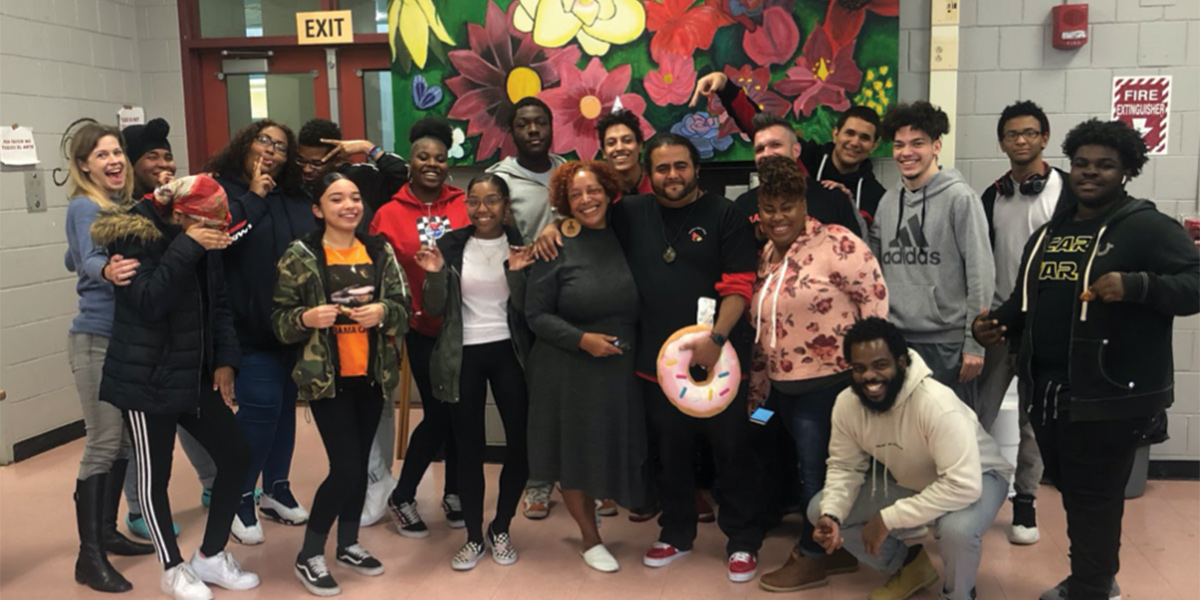
On a cool fall morning, iThrive's Boston-based team walked into the Design and Visual Arts classroom at Madison Park Technical Vocational High School in Roxbury, MA. After being stuck in traffic and frantically searching for parking, we carried crates of games and design supplies as we breathlessly climbed the long, spiral staircase to reach the third-floor studio space that housed the Design and Visual Arts Program. A few of the 18 juniors in the class looked up from the self-portraits they were drawing or charcoaling or painting to study us, while others did not acknowledge our arrival.
We were about to embark on two weeks of full-day sessions of Game Design Studio with these students. Every other week, the junior class spends all day on their vocational training, with the off weeks spent in academic courses. For two weeks of their vocational training, they would co-design games with iThrive.
In Game Design Studio, we use games and game design to invite teens to give voice to their experiences and create games that reflect their point of view, ideas, feelings, and understandings of the world. The youth designers determine which games will be created. Their ideas form from many brainstorm and gameplay sessions while iThrive staff and Design and Visual Arts instructors roll up their sleeves to take on whatever work needs to be done to produce the games within a tight timeline.
Creating Shared Space for Codesign
We spent our first day with the youth designers at Madison Park playing and modding games together and getting to know each other. At the end of the day they were tired and so were we. We didn't know exactly what we would make together but we knew through relationship building, play, game design activities, and exploration these teens would give voice to their experiences.
By the middle of our second day, we were composing and performing a song together. The lyrics came courtesy of the teens' brainstorm about the challenges they face in daily life. The melody was devised by iThrive's Tabia Batts, beats were made by a tag-team of two youth designers, and iThrive's Jamal Hamilton provided the rap.
Through building this song together, we connected a creative process familiar to the teens with the unfamiliar process of creating a game. By using this natural entry point, we also laid the foundation for critical relationship building. Songwriting helped create a shared, trusting space where it was clear to the youth designers that we listened closely to their ideas and that their voices were valuable and critical to our game design process. And, singing together created shared vulnerability; each of us being vulnerable together reflected that we were present with them and that what they shared would be taken seriously and used to co-design games.
Tabia describes the moment she performed the song inspired by the teens' discussions on that first day:
"I would have to say that it was a very vulnerable moment for me but also very relatable. Every issue that was on the table was something that I had dealt with myself as a teen and an adult. Working with teens takes a level of authenticity and transparency. I wanted them to understand how they can take something so simple like a word and add meaning to tell their story."
Playing + Designing = Growth
Each morning when we arrived, the youth designers were engrossed in either playing games or working on their game prototypes. Throughout the day, students were deeply engaged with the iThrive team, and many worked and played through lunch, stayed after school to design game elements, and demonstrated leadership, creativity, and persistence throughout. Geo Ortega, one of the course's instructors, commented, "I can tell they really like this because they're here late to finish their projects [for playtesting]."
One group of designers had an early inspiration to create a game where players would have to grapple with relevant social and personal decisions. If players successfully navigated the decisions they would win the game, staying in school and making it to high school graduation. If they didn't, graduation was off the table and other fates awaited.
The team designed early prototypes using google slides and began to shift toward a board game structure as we played more and more board games together. Eventually, we suggested to the team that the digital platform Twine may be a great fit for their core game mechanics. Intrigued by the possibility of creating a digital game, they took on the challenge.
Armed with a book on how to use the software, links to YouTube videos, and the iThrive team to jump in as needed, these designers took to Twine like experts and produced the game Decisions Decisions. At one point, they encountered a problem in the coding where their story was not linking up to another story element so the player could go to the next step of the game. The team became frustrated but they pushed their way through. They had to learn new coding techniques to allow that storyboard to work-and they did! They chose to stay late at school to work through this and other challenges, proudly showcasing their game to peers and teachers who enthusiastically played and debated which decisions to make and why. Tabia reflected, "I was able to see their struggle and frustration, as well as their pure excitement and joy when they solved their problems."
Producing Games from Personal Experience
In just two weeks, the youth designers at Madison Park designed and built four games that touched on topics including lack of sleep, mental health, challenging decision making, and the difficulties of getting to school on time and safely. They ideated concepts; storyboarded; selected, devised, playtested, and revised core mechanics; and, with some help from their peers and teachers in fabrication, 3D printed, laser-cut, illustrated, and programmed all components of each game. Ortego shared with us, "This is a really strong group of students and they need projects like this that challenge them to create." And create they did!
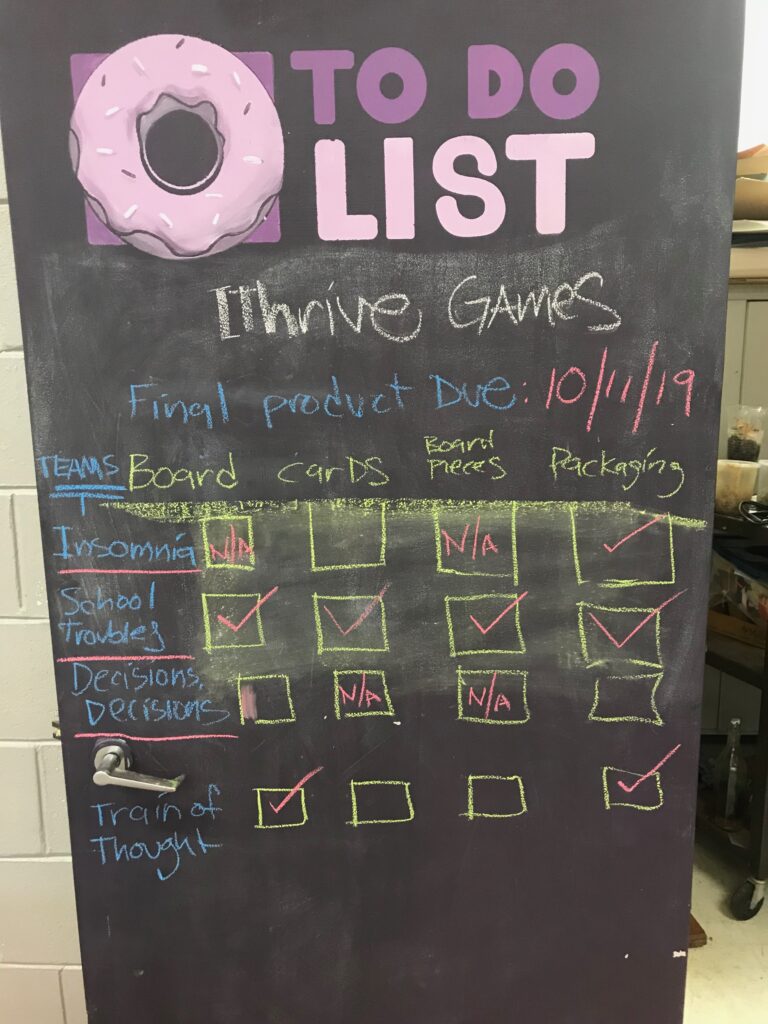
A palpable enthusiastic energy filled the room each day as the youth designers built and playtested their games across the two weeks. There was a growing buzz around the school; each day more and more teachers, administrators, and other students stopped by to check out what the youth designers were making. And by the day of the showcase, word had spread so much that there was a constant flow of visitors and playtesters for the full three hours.
Here's what they made:
Insomnia, a fast-paced card game inspired by teens' experiences of trying and often being unable to get enough sleep each night. Each card in the game represents hours of sleep gained or lost (e.g., +2 hours, -3 hours). Some cards help players earn additional sleep (i.e., a pillow card or blanket card). The dreaded insomnia card forces the player to lose 10 hours of sleep. The player with the most sleep hours at the end of the game wins.
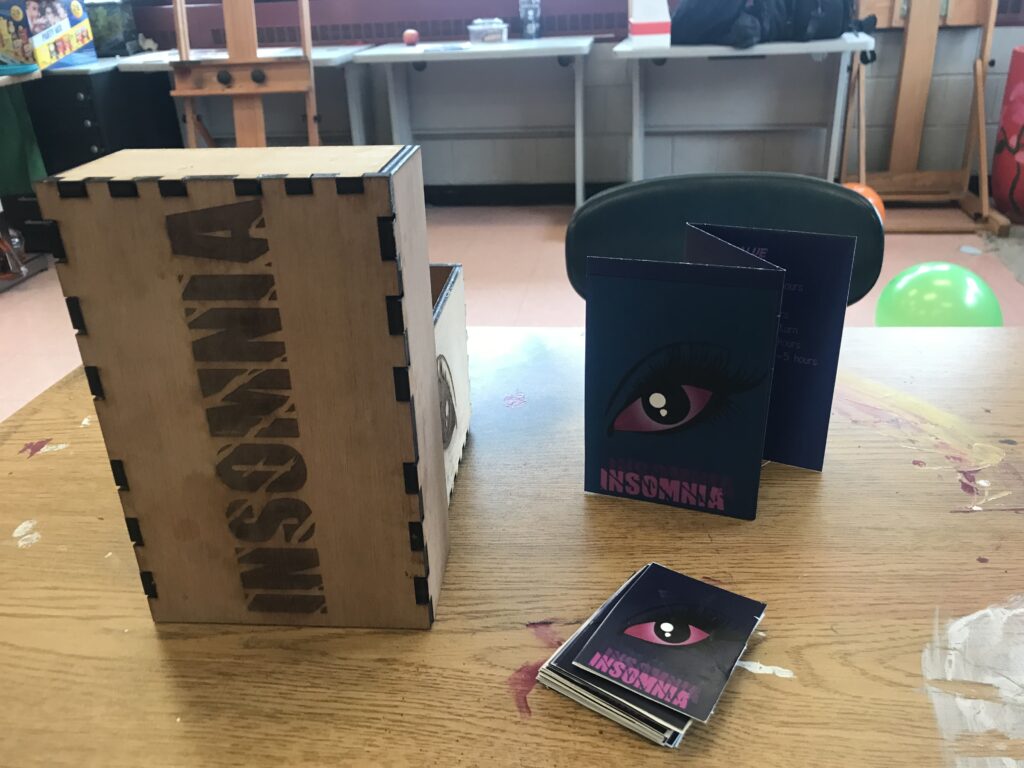
In the board game School Trouble, players try to overcome obstacles in their path on the way to school-late buses, traffic jams, delayed trains, and missed connections. This fast-paced, fun game reflects the real-life challenges the youth designers encounter as they try to arrive at school for the opening bell at 7:30 am.
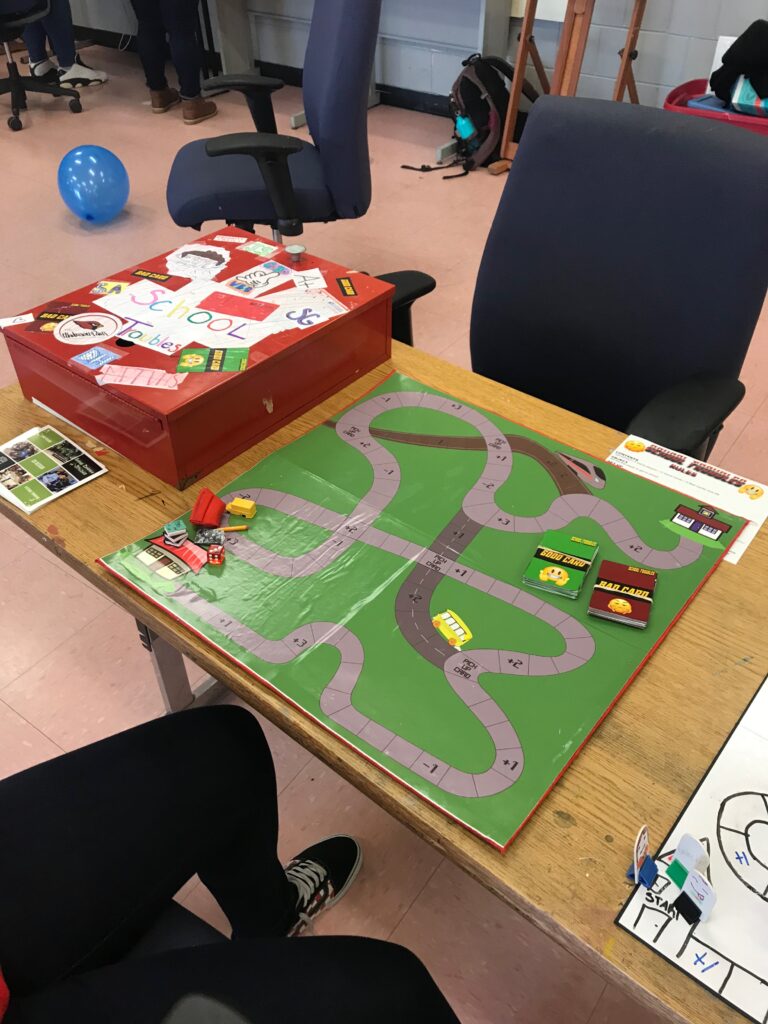
Decisions Decisions is a Twine game where players try to make it to high school graduation by making good decisions in the face of challenging real-life scenarios, like whether to sneak out to a party or do homework, whether to skip school when you're sick or stick it out, whether to lie to protect a friend, and more. The youth designers of this game wanted to create a fun and relevant game that would help their peers make better decisions by seeing the connections between the daily decisions they make and real-life outcomes.
The board game Train of Thought addresses mental health issues teens face. The youth designers compiled issues raised in the brainstorming sessions and explored which strategies would work best for coping with the different issues. "Talking to a friend" is a good strategic match for "feeling sad about a broken heart," while "meeting with a counselor" is a strategy match for "feeling depressed." During playtesting, one of the counselors from Madison Park had a chance to play the game and she said that she would love to have a game like this in her office to help teens talk openly and constructively about their mental health.
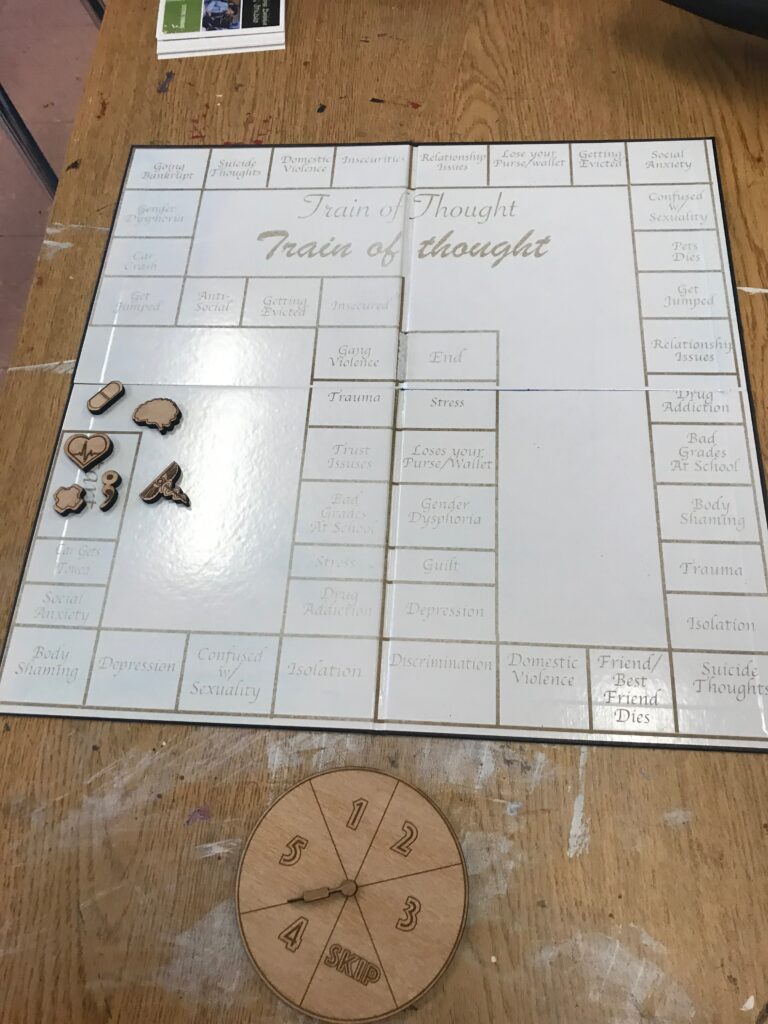
Authentically Engaging is the Magic
iThrive's Game Design Studio is designed to authentically engage teens in reflecting on their social and emotional challenges and opportunities while drawing on their lived experience to dream up and author their own games. Magic happens when adults and teens work together in this way to elevate and amplify what teens care about. In the process of co-designing games, we—teens and adults in partnership — build meaningful relationships with each other, lift each other up while sharing memorable experiences and encouraging personal growth, establish inside jokes, and sometimes, even, create an original song.
This work was supported through generous funding from the William T. Grant Foundation and the D.N. Batten Foundation.
We Can’t Design Games for Teens Without This

iThrive Games and EdTogether are co-designers and co-facilitators of Game Design Studio, a special game-based social and emotional learning program for teens. In this post, you'll learn: what teens in Game Design Studio have said really matters to them; the goals and structure of the program; its key features; and a primary takeaway from our design work with teens. You'll also be able to watch a brief video about Game Design Studio and learn more about iThrive Games and EdTogether.
It was week four of Game Design Studio at a Boys & Girls Club an hour west of Boston. We opened our session asking teens to complete these statements: "It drives me crazy when adults...." and "I wish adults knew that...".
The flurry of activity—the teens writing their responses on sticky notes—was unexpected. It was as if they couldn't write fast enough to keep up with their thoughts. The eagerness with which teens jumped up to share their responses reflected the urgency of giving voice to their experiences.
"I wish adults knew that teens have their own goals."
"It makes me crazy when adults...punish us, but they never own up to their mistake and never act like they did anything wrong. They never have to say sorry."
"We kids spend a long day at school walking from class and doing homework. We get tired too. And they call us lazy."
"It makes me crazy when adults don't need to do something the child asks, but when the adult asks the child, it HAS to be done."
Across their dozens of responses, many teens came together around mutual respect. That's not really too surprising.
Teens' Need for Respect
Although there are many individual differences across teens, something they share in common is a biologically-driven need to feel respected both by their peers and by adults. Respecting teens means engaging them with the intent to listen and to take their needs and interests seriously.
Even the most well-meaning adults are sometimes guilty of trying to enhance in young people the strengths we want them to have (ahem, self-regulation) rather than empowering them to pursue what they love and to build the unique profile of strengths that makes them, well, them.
In the 1990's, the disability rights movement launched the motto, "Nothing About Us Without Us." The same credo should guide the creation of games intended for teens. It's only when we involve teens directly that we can know whatever we create is truly FOR them.
We have collaborated with EdTogether to create a context for engaging with teens in a deeply meaningful and transformative way. Game Design Studio is our program that encourages teens to express what matters to them and to create games that reflect their point of view, ideas, and experiences.
Game Design Studio: An Outlet for Teen Voice
In Game Design Studio, teens explore who they are and express that to others across a series of sessions as they play, analyze, and co-design games.
Teens create characters, game worlds, rules, and mechanics around themes they identify as relevant to their lives. They test existing games and games of their own design to assess player experiences during gameplay. They alter game mechanics to test hypotheses around what affects player experiences and use that data to make gameplay more satisfying.
"I put what I thought, how I felt, into the game, and I knew that players would feel the same way I felt since I designed the game." - Game Design Studio participant, Age 13
We then share teens' insights with professional game developers with the goal of creating more meaningful games for teens. Game Design Studio strives to create a tight feedback loop in which teens' voices inform the design of digital games, teens play and analyze those games, and the feedback teens provide helps developers to iterate on and continually improve those games.
Inviting teens to dissect games in this way engages them as prosumers. They become critical analyzers of games and make more informed choices about what they spend their time playing. They think about how games were designed to make them feel, and whether they are comfortable with that or not. They are able to articulate what they like and don't like about games, and why. Instead of merely consuming media, they become their own informed advocates.
Key Ingredients of Game Design Studio
We structured Game Design Studio to have six key features that ensure an authentic and meaningful experience for teens:
- Focus on Teen Interests. Nearly all teens play games. Engaging teens starts by focusing on something that genuinely appeals to and motivates them. Games offer an excellent context for authentic discussions and learning that meets teens where they are. Games are used as the launch pad for teens to reflect and focus on their own social and emotional challenges and opportunities.
- Co-design. Game Design Studio's co-design approach invites teens directly into the game design process. Co-design changes the power dynamic of a typical learning interaction and empowers teens to directly engage with adults, challenge them, and co-design as equals. In this way, teens practice finding their voice and raising it in service of their own learning and development.
- Dynamic. The structure of Game Design Studio is intentionally adaptive to the insights and reflections from teens. We're constantly adapting to what teens find meaningful because that's what's going to produce games that feel authentic to teens' lived experiences.
- Universal Design for Learning. Game Design Studio was designed using Universal Design for Learning principles. In designing each activity, we consider the diversity and variability inherent to the teens involved and work to prepare the learning environment to be rich with options for how teens take in information and express their new knowledge and skills.
- Social and Emotional Learning. Game design requires social and emotional skills. How does the design of the game affect players' feelings? How does the design of the game keep a player engaged? These are critical social and emotional skills — identifying and managing other people's emotions. As teens work together in design teams, they build their collaboration skills.
- STEM Skills. In Game Design Studio, teens pinpoint the emotion they want someone else to feel and then leverage engineering principles to reflect, question, ideate, define problems, collect and analyze data, and build and test their creations. This kind of iterative, critical process is essential for learning. It also helps to redefine for teens what "science" is. Science is not confined to test tubes and programming; it's using curiosity about ourselves, others, and the world to pose questions and to experiment with possibilities. This can help to break down some of the barriers to belonging in STEM fields that many teens experience.
Key Takeaway: The Limitations of "Average"
Before iThrive Games and EdTogether launched Game Design Studio, we had only general impressions of "what teens like." But we soon found out that the general or average doesn't actually reflect any one person's experiences, values, or preferences. The huge range and complexity of interests and needs teens bring to Game Design Studio means that we just cannot design meaningfully for teens without engaging with them deeply and authentically.
We engage with teens to listen, not to impose our ideas of what's best for them. We at iThrive Games and EdTogether have committed to only designing for teens alongside a lot of authentic engagement with teens. We heard them ask for mutual respect. We listened and are acting accordingly.
"Game Design's definitely given me confidence in what I think I can do, but it also helped me think about how I could build off of other people's ideas in order to reach one progressive goal." - Game Design Studio participant, Age 13
Get Involved in Game Design Studio
Interested in making a difference with and for teens? Contact iThrive Games about hosting or sponsoring Game Design Studio!
More About iThrive Games and EdTogether
iThrive Games exists to empower teens to thrive using great games. Teen development is impacted by the settings they inhabit — their home, their classrooms and school, their neighborhood, their city. More and more, teens are inhabiting virtual settings. Their screens are available 24/7. They can and do take them anywhere and everywhere. The interactions they have in these settings impact how teens think, behave, and what they value. Video games are prevalent and offer an opportunity to engage teens where they are. iThrive Games is committed to creating meaningful experiences for players in games, experiences where they cultivate assets to support their thriving across the teens years and into adulthood.
EdTogether works to leverage emotion in education in order to engage all students. So many students (and especially students with unique learning needs) experience consistent disengagement from their educational experience, feel negatively about learning, and lack critical supportive relationships at school. This puts them at a significant disadvantage. They are, in essence, emotionally excluded from learning. EdTogether seeks to enhance the spirit of learning among all students by designing educational settings that spark and leverage curiosity and motivation.
From Angst to Engagement: Insights from our DePaul University Game Jam
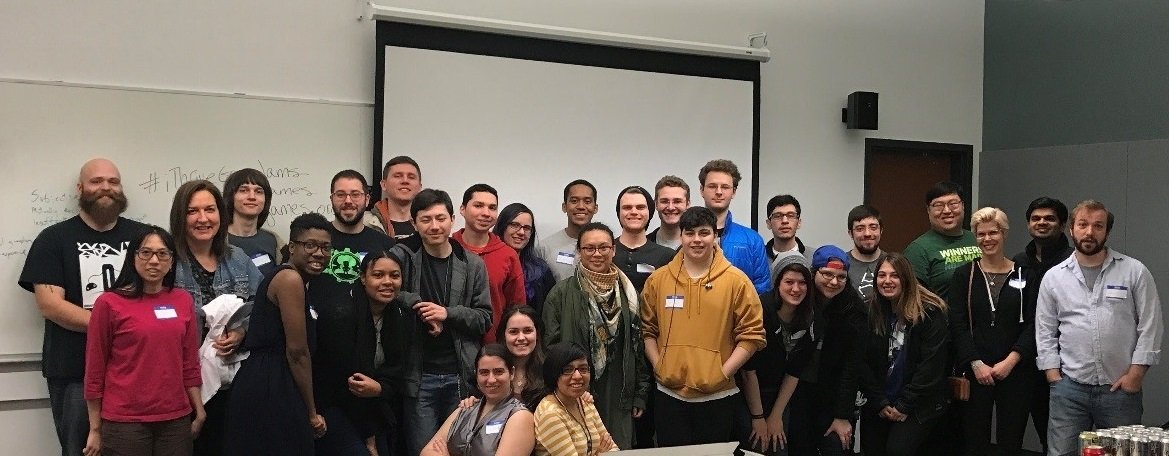
iThrive Games has been hosting a series of paper prototype game jams in recent months. We had one in January at MagFest, and on April 1, we held one at DePaul University in Chicago. No fooling!
This jam was different in that we included both college students and high school students. We presented game design resources to help them design around positive psychology concepts, and then let them loose to come up with game ideas. Some 42 people attended, and eight games were conceptualized or even designed! Spending the day with these folks was very rewarding for me, and left me with these important insights:
1. The high school students, by and large, had better ideas. The college students were coming up on final exams, so the instruction they'd experienced all semester about things like systems design and game balancing were at the forefront of their minds when approaching the exercise. While this meant that their ideas were often very well fleshed out and robust, it was the high school students who were unlimited by any constraints, who were more able to think outside the box and demonstrate great innovation. Pairing college students with high school students benefitted both groups and improved the ideas!
2. More presentation time resulted in more thoughtful design. At the MagFest Jam, we spent only 15 minutes talking about how to design for positive psychology and expected that the participants would be more dependent on our handouts to help them. This time, we spent 45 minutes explaining the resources and walking people through an example of how they might go about the process. This resulted in much more thoughtful ideas about what concept to use and how to express that in a game! We learned that participants respond well to more explanation, and the products reflect a greater understanding of what we're trying to do.
3. We learned how to engage reluctant teens. We had one 17-year-old participant who arrived with his mother. An aspiring computer programmer, he initially scoffed at the idea of an analog game jam. When we talked about things like kindness and empathy, he became openly hostile. They were getting ready to leave. I recognized immediately that this young man represents a contingent of typical teens, so I was intent on figuring out how to reach him. Here's what kept him at the jam until the end, until he had a game to present!
4. Even computer programmers need to understand and know how to prepare game design documents. In the games industry, everything you do on a game is reflected in the game design document. People of all disciplines need to know how to read these documents, respond to them, document their work, and to prepare their own (to help other team members understand how all the pieces of a game need to exist and interact with each other). Our jam requires you to prepare a game design document, which can help you with a required industry skill!
5. Finding out what games teens like, and why they like them, can provide direction. Popular games like Call of Duty, Doom, and Halo (which might be criticized as violent) are games that can still encourage positive things in certain kinds of players, so shouldn't necessarily be dismissed. The key is to recognize that each family needs to work together to determine what healthy gaming looks like for them, and this mom was okay with her son's gaming choices. This 17-year-old boy (a high school senior) likes shooters and horror games because they let him blow off steam, and let him explore and overcome danger. We decided that this connected well with resilience and curiosity, and he was able to move forward.
6. Not every positive psychology concept has to be "touchy-feely." For those kids who don't feel as comfortable exploring concepts such as kindness, optimism or empathy, there are equally important practices such as curiosity, growth mindset and resilience that might appeal to them to use.
We emerged at the end of the afternoon full of pizza and game ideas about everything from breaking up cliques, to a multi-player escape room experience to fight anxiety, to a cooperative game where players rebuild a destroyed city. People really enjoyed themselves and even stayed afterward to thank us and ask us to do more events!
Interested in attending or hosting an iThrive Games Jam? Leave a comment or send us a message!
Video Games Can Boost Empathy

Note: This article is the first in a series that captures game industry experts' opinions on game titles and mechanics that might boost players' positive habits, mindsets, and skills. These insights arose from discussions at an iThrive-sponsored think tank with game developers and scholars.
Researchers and policy advocates have spent decades tallying the dangers of video games. But there is growing scientific evidence that prosocial video games—those with opportunities to help instead of harm others—can boost players' empathy and prompt them to be more helpful towards others in the real world.
Many games that demonstrate prosocial outcomes in research (Lemmings and Super Mario Sunshine are two examples) were designed first and foremost for entertainment, not to leave players hankering to do good. So the empathy boost captured in much of this research appears to be a happy byproduct of great game design, not—at least not always—an outcome developers deliberately target. It turns out even games with violent themes can prompt prosocial behavior in players who play in cooperative mode.
This made us at iThrive wonder, what other great games already out there might be brimming with opportunities to hone skills and habits that benefit teens? And what would happen if more developers did aim to boost skills like empathy using principles of great game design?
ITHRIVE GAMES' DESIGN HIVES
To gather some insights into these questions, we hosted a think tank ("Design Hive") with six expert video game developers and scholars. These industry experts met with us over a long weekend to trade reflections on games and design features that open the door to positive practices like empathy, even if by accident. We left with a curated list of promising "empathy games," shared below.
We launched the discussion on empathy with iThrive's evidence-based definition (adapted from the work of emotion researcher Dr. Jamil Zaki): Empathy means feeling what others feel, imagining how they view situations, and being motivated to do something with that knowledge. Here's what the developers had to say.
INHABITING THE MEDIUM
One insight permeates the rest: video games are special in the world of media. Games researcher Katherine Isbister (who attended the Design Hive) writes in her book, "At their heart, games differ from other media in one fundamental way: they offer players the chance to influence outcomes through their own efforts. With rare exception, this is not true of film, novels, or television."
The ability to fully inhabit the world of a video game, to embody characters with agency and a chance to impact the world and characters around them, is foundational to many of the experts' other insights about games and empathy. The action in a game, unlike in most other media, is the result of something "I, the player" have done. This stands to make players uniquely invested and immersed in the story before them. And research shows that immersive presence can be linked to increased empathy.
So, from the perspective of "me," the agentic player, these are a few of the ways games offer chances to develop empathy:
- I see other perspectives as valuable currency. In some games, I have to consider points of view different from my own in order to succeed. I must examine both sides of a family feud in Star Wars: Knights of the Old Republic, decide how probing a question to pose to each character in Telltale's The Walking Dead, and interview characters in detective games like Nancy Drew to piece together what really happened. I take my time to listen because missing something important has real consequences for my success.
- I act from different points of view. In games like Never Alone, Brothers, and Telltale's Game of Thrones series, I can switch from one character to another. This lets me see the same world through many eyes and viscerally explore and appreciate each character's unique perspectives and abilities to move the action forward.
- I inhabit difficult circumstances. Even though I may never do it in real life, I can experience the perils of war in This War of Mine and 1979:Revolution, embody someone who is different and marginalized in Dys4ia, see the world through the eyes of a boy with autism in Max: An Autistic Journey, and care for a child with a terminal illness in That Dragon, Cancer.
- I lose someone important. When I lose characters or companions who have helped me or kept me company throughout the game—like in Passage, Fable 2 or Dragon Age: Origins—I wonder if there was something I could have done differently to save them. I have to strategize about what I'll do without them and adapt to their absence. I might feel more empathy for the experience of loss in general.
- I make choices that impact others. In Mass Effect, I choose which character will perform a potentially fatal mission. In Undertale I decide which characters to help and which to fight, and in Papers, Please I find out how willing I am to break the rules to help someone else at a personal cost. In multiplayer online games like World of Warcraft, my choices have an impact on real players. I weigh whether to cooperate or compete, whether or not to share my loot, and learn how it feels when others make these decisions about me. I watch the consequences of my choices play out for better or for worse.
One thing was clear after this session: video games can model and prompt empathy, and it doesn't happen in a vacuum. It helps if players are willing and able to reflect on what they encounter and have the supports necessary to do so effectively. At iThrive, we strive to identify or create the supports that allow games to be meaningful for teens' well-being. But starting with great game design certainly doesn't hurt.
In that spirit, our Design Hive experts recommend 8 games that are developmentally appropriate for teens and may provide opportunities to practice empathy*:
- 1979 Revolution: Black Friday
- Never Alone
- Papers, Please
- Passage
- Star Wars: Knights of the Old Republic
- That Dragon, Cancer
- This War of Mine
- Undertale
Have you played them? How have these or other games helped you or someone you know to develop empathy? Share your story!
Note: iThrive produced the curated games list in a joint effort with expert game developers and scholars. Their recommendations are rooted in evidence-based definitions and examples of empathy provided by iThrive. These games have not been scientifically proven to boost empathy, but they contain features that appear to provide opportunities to develop it.
